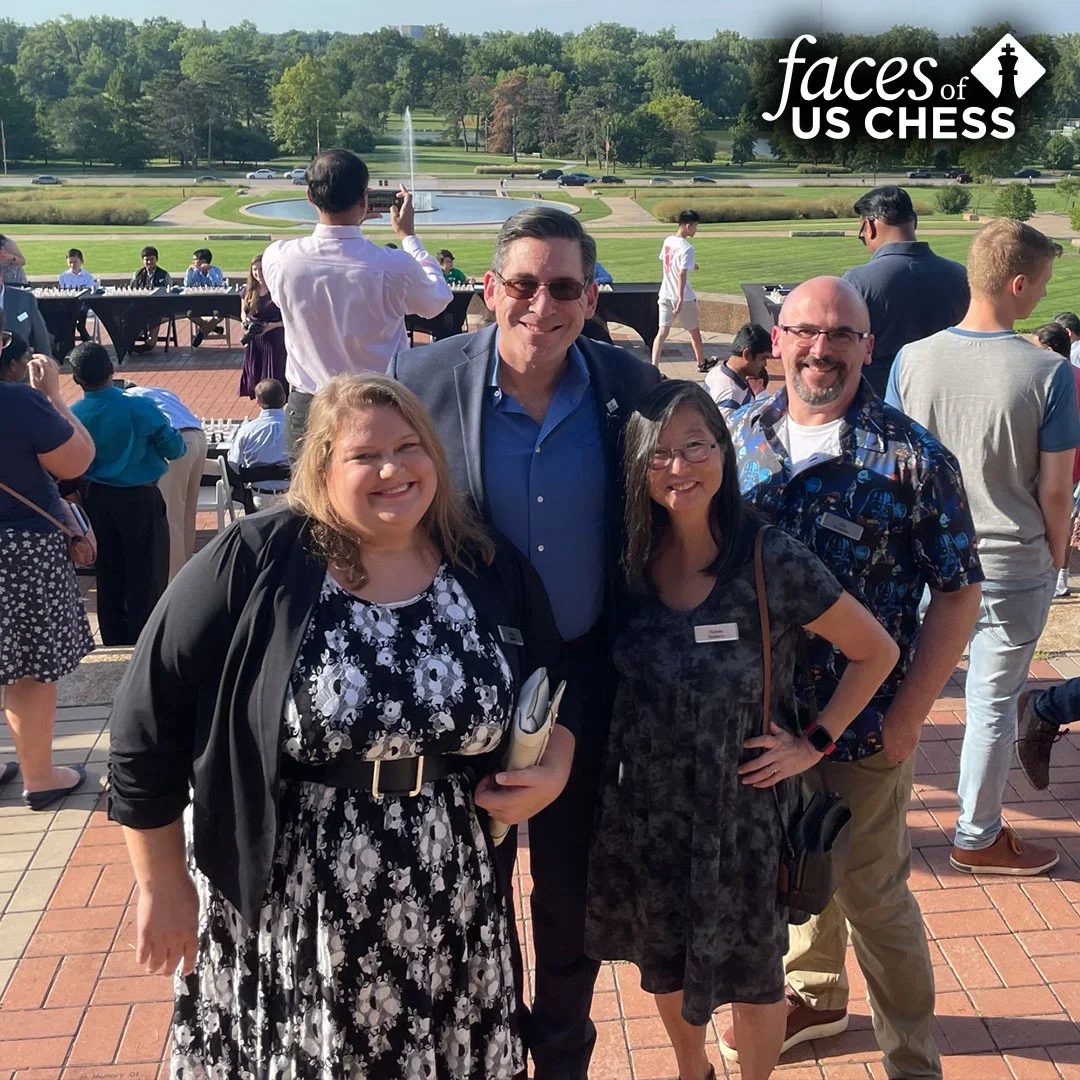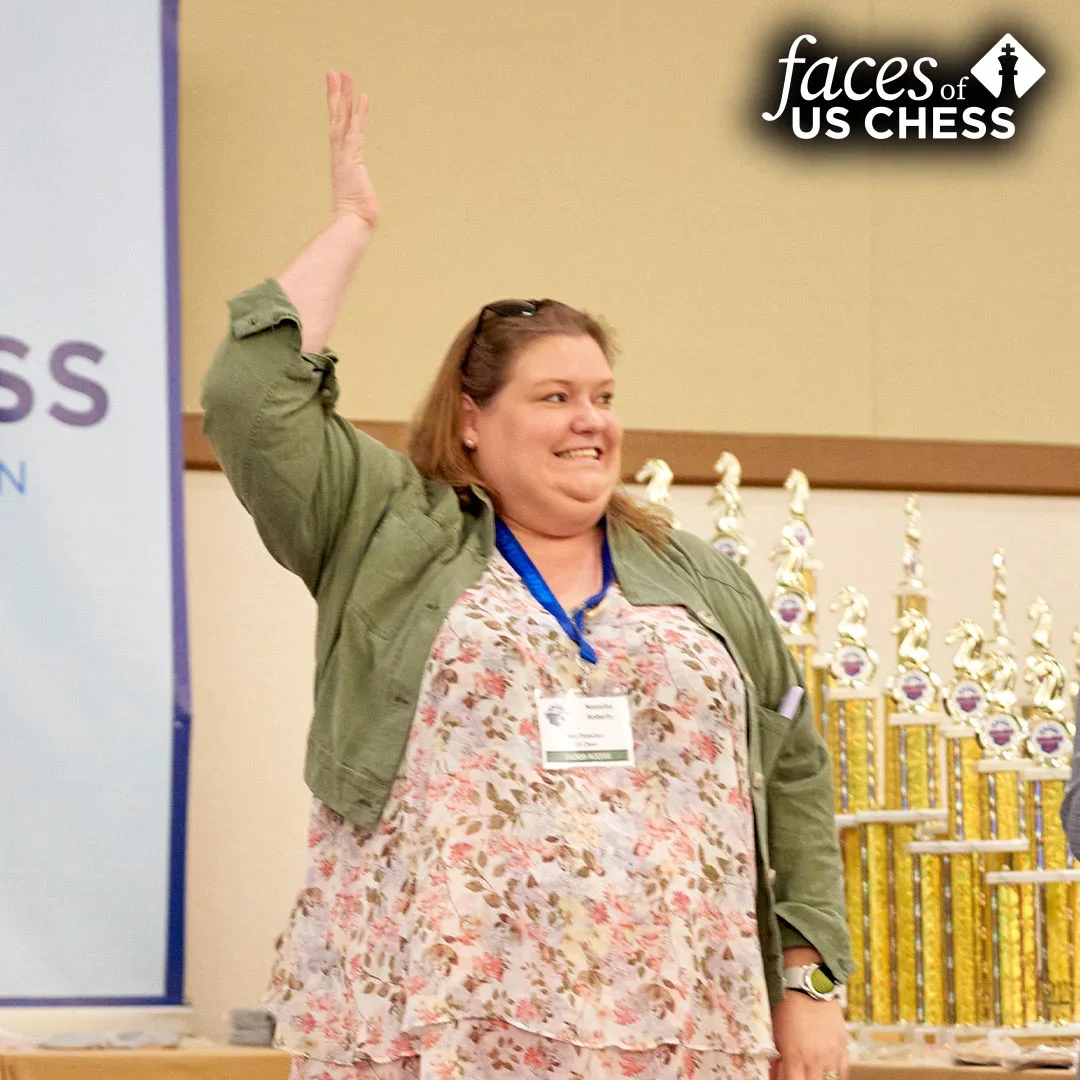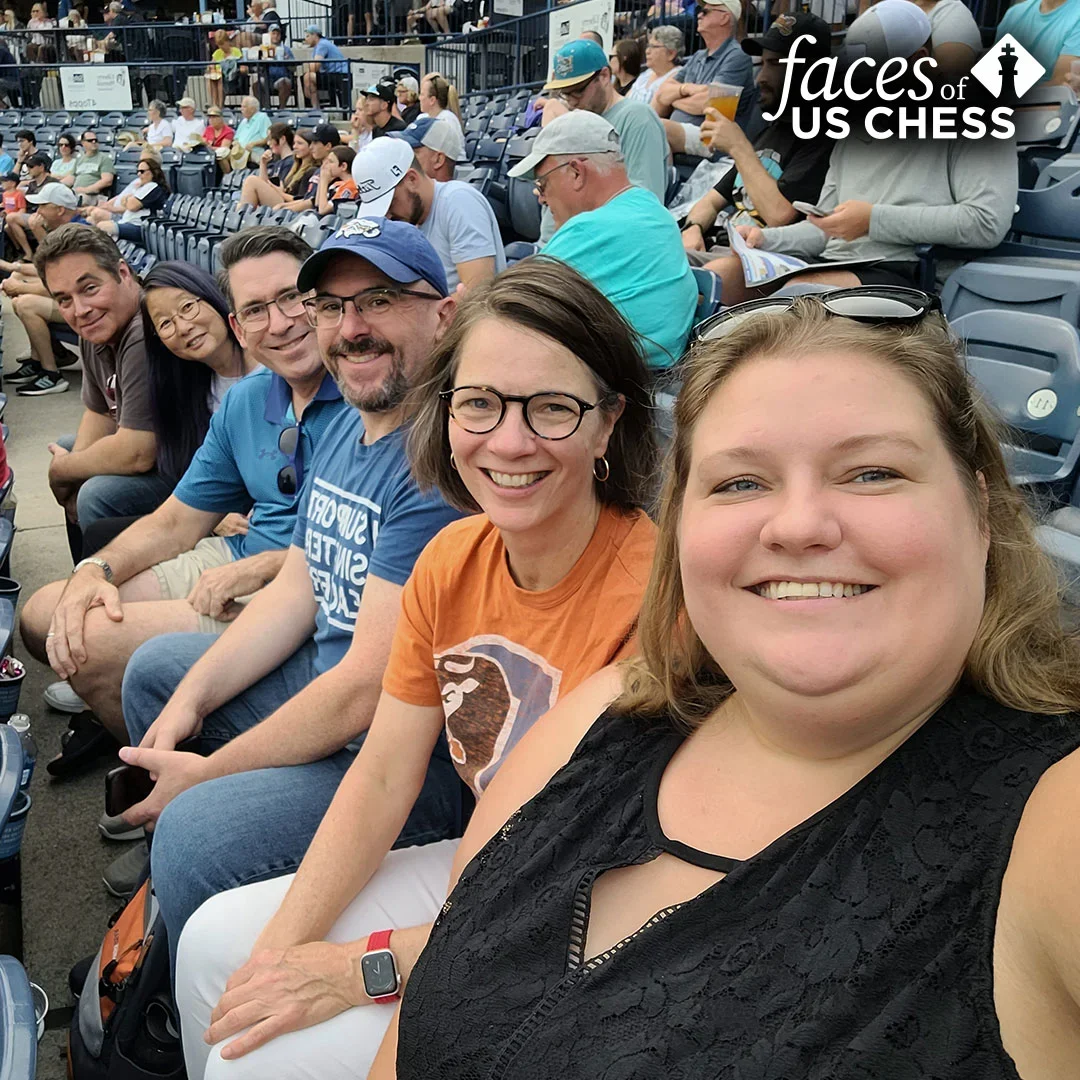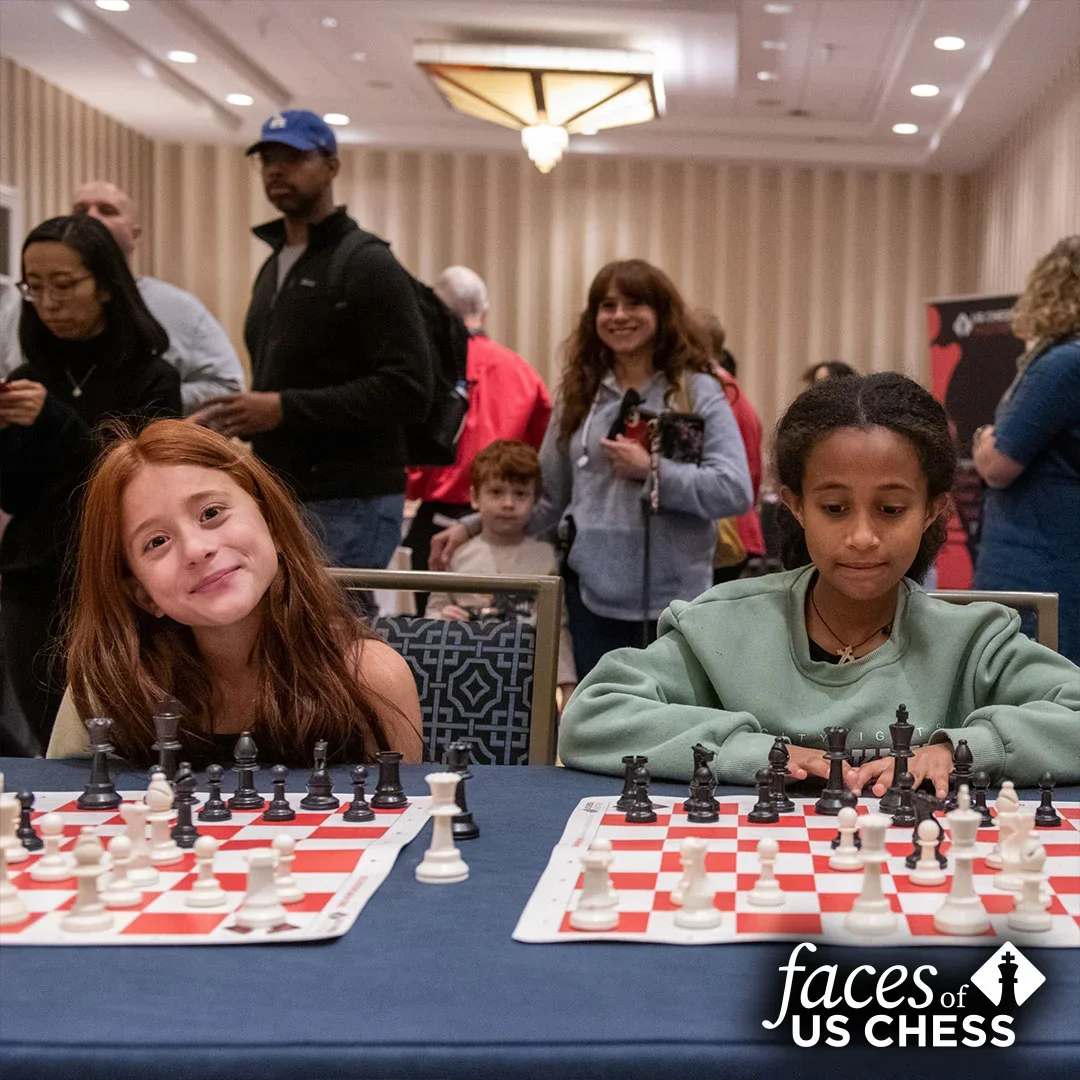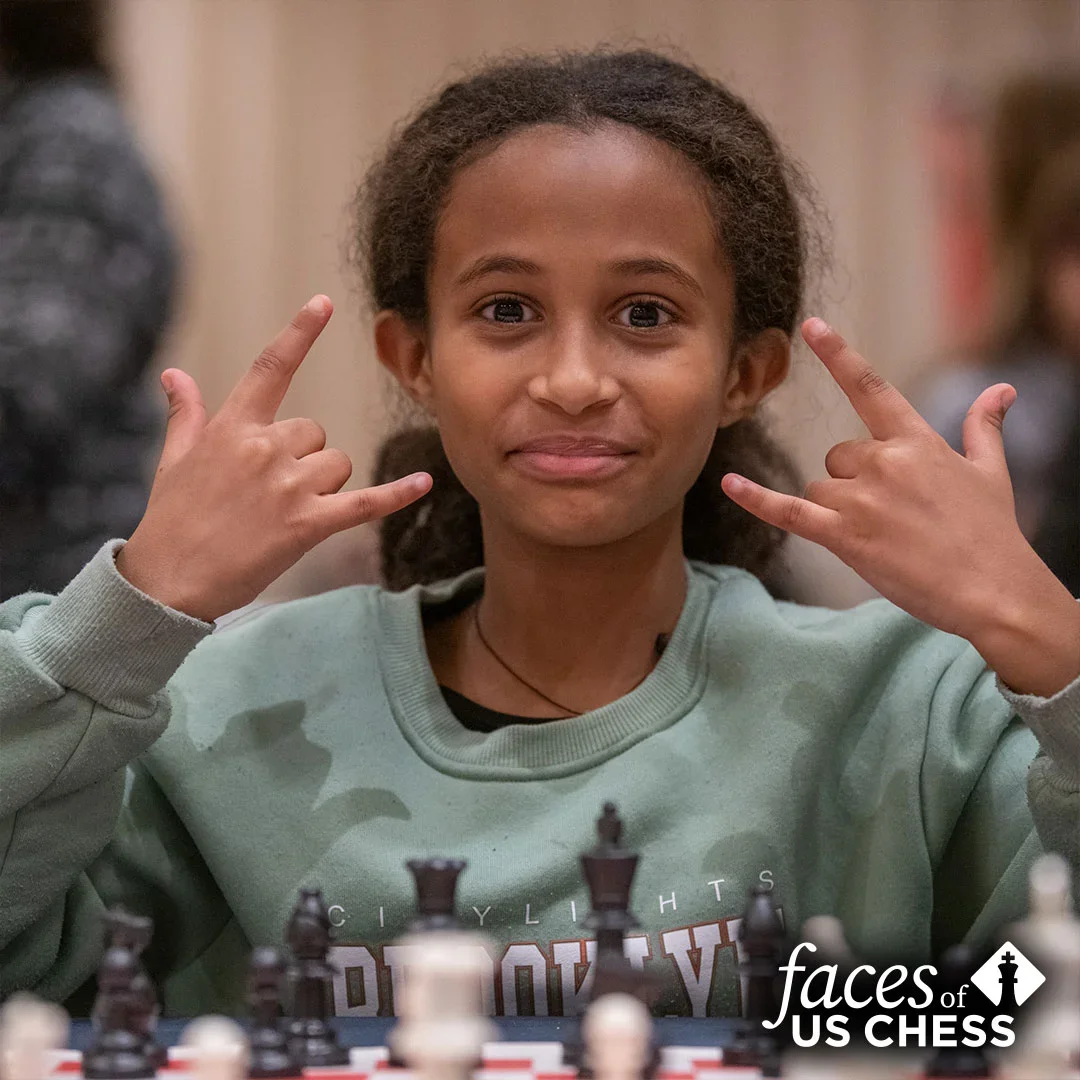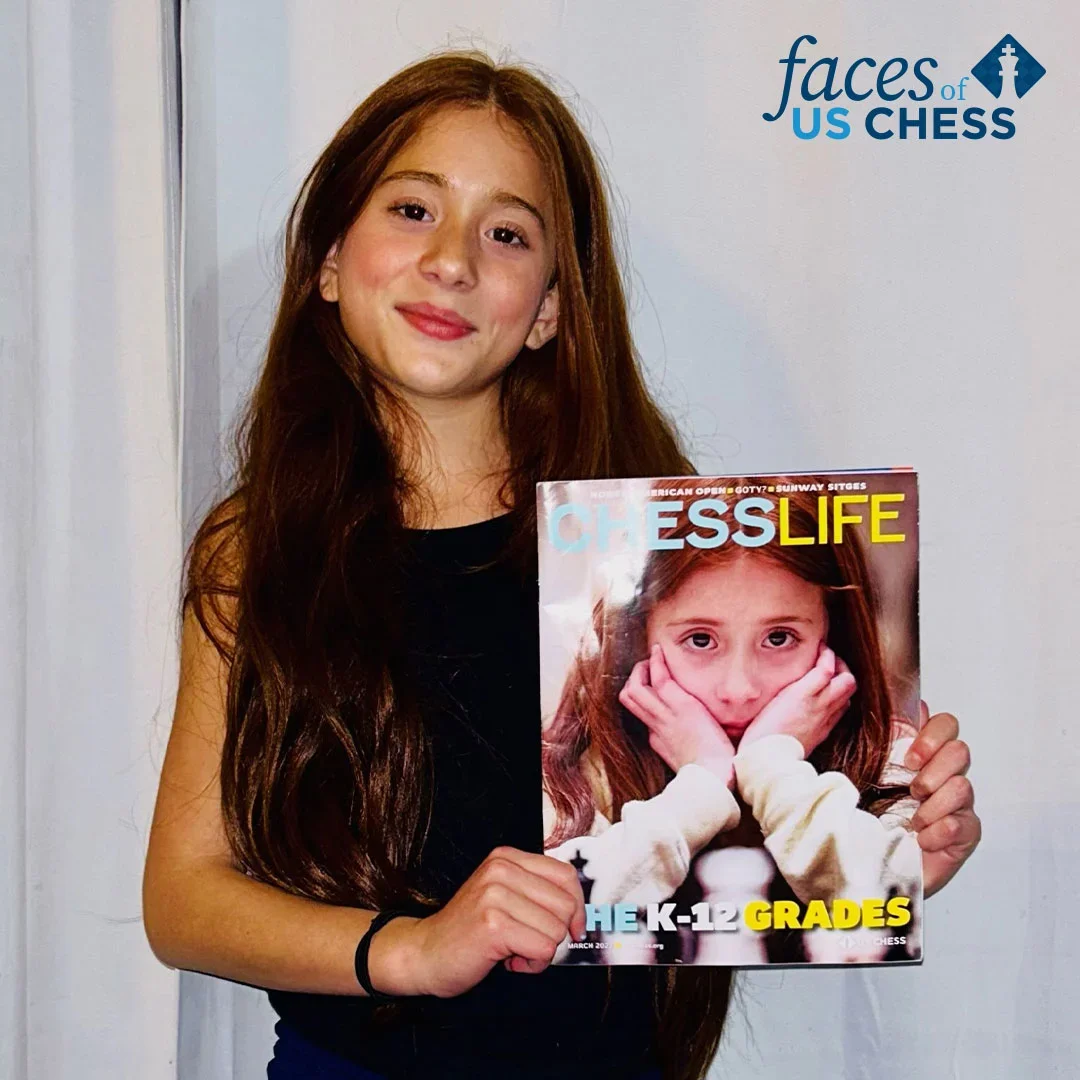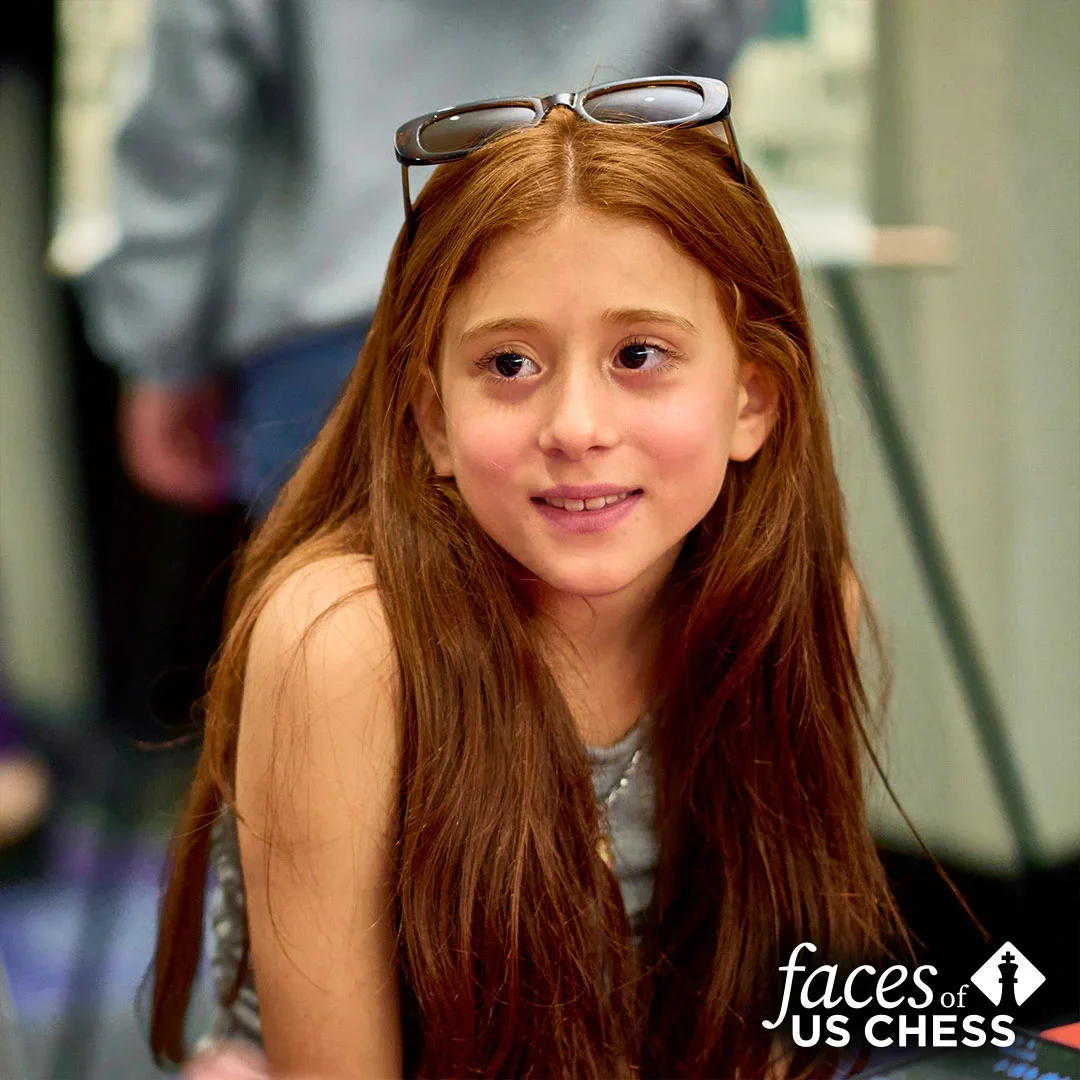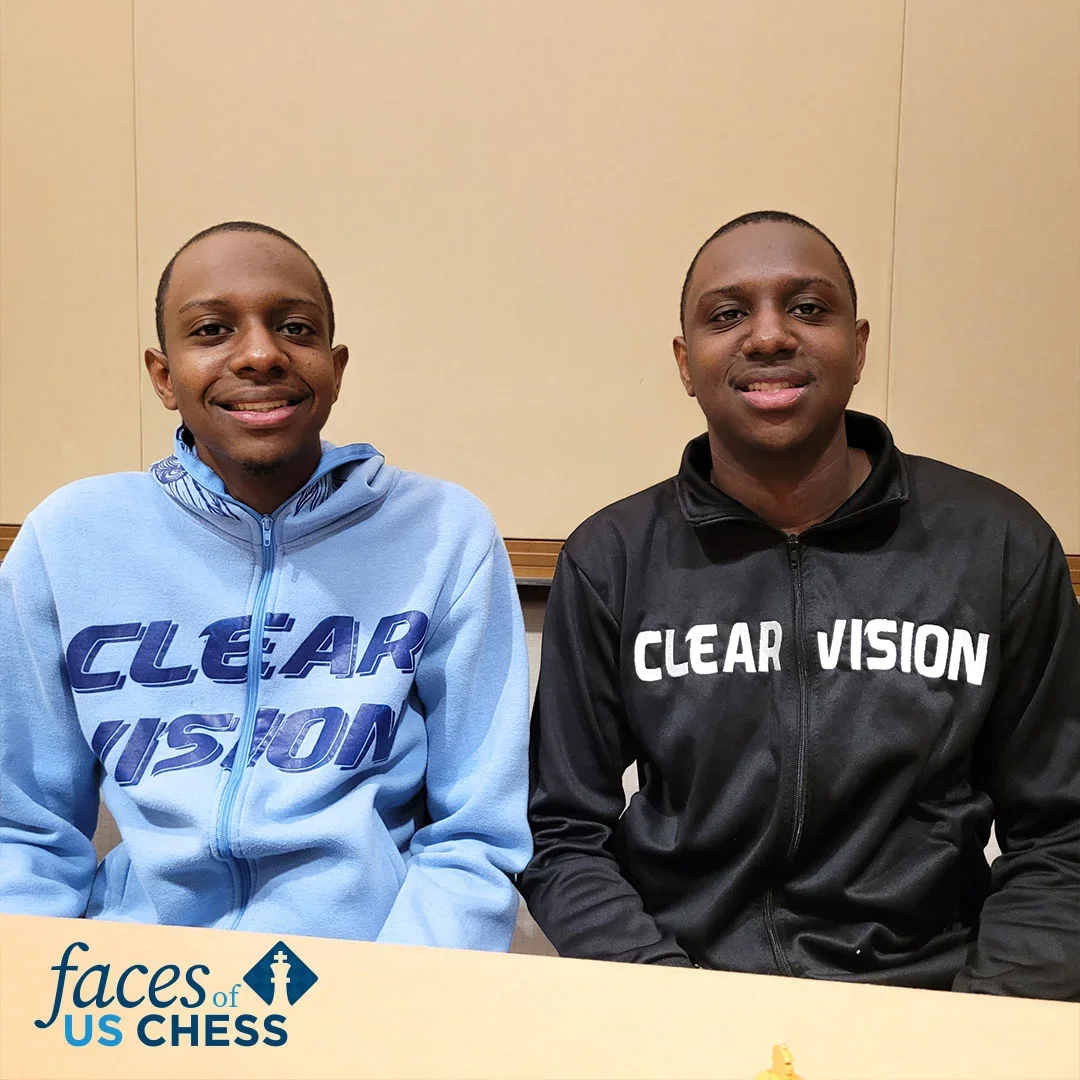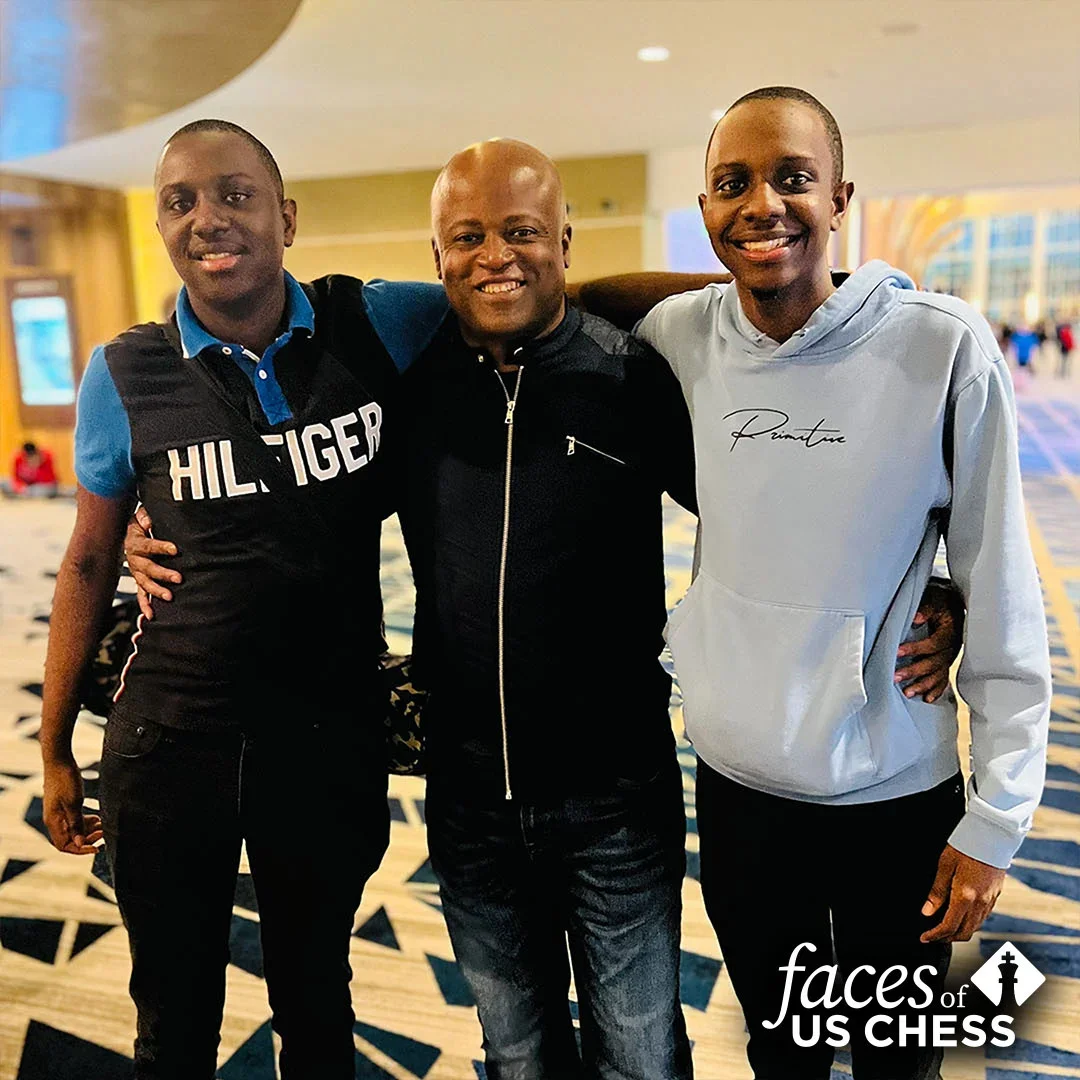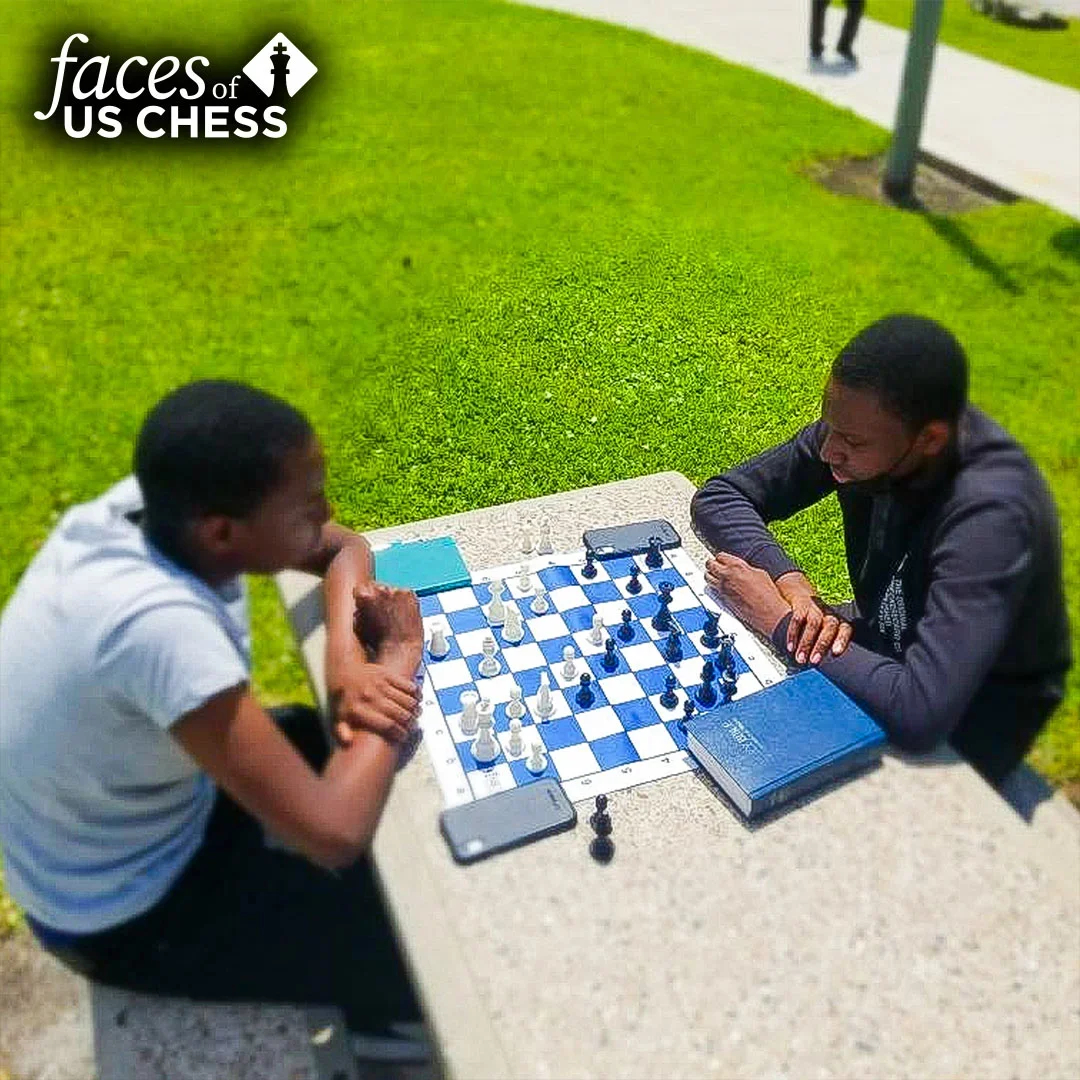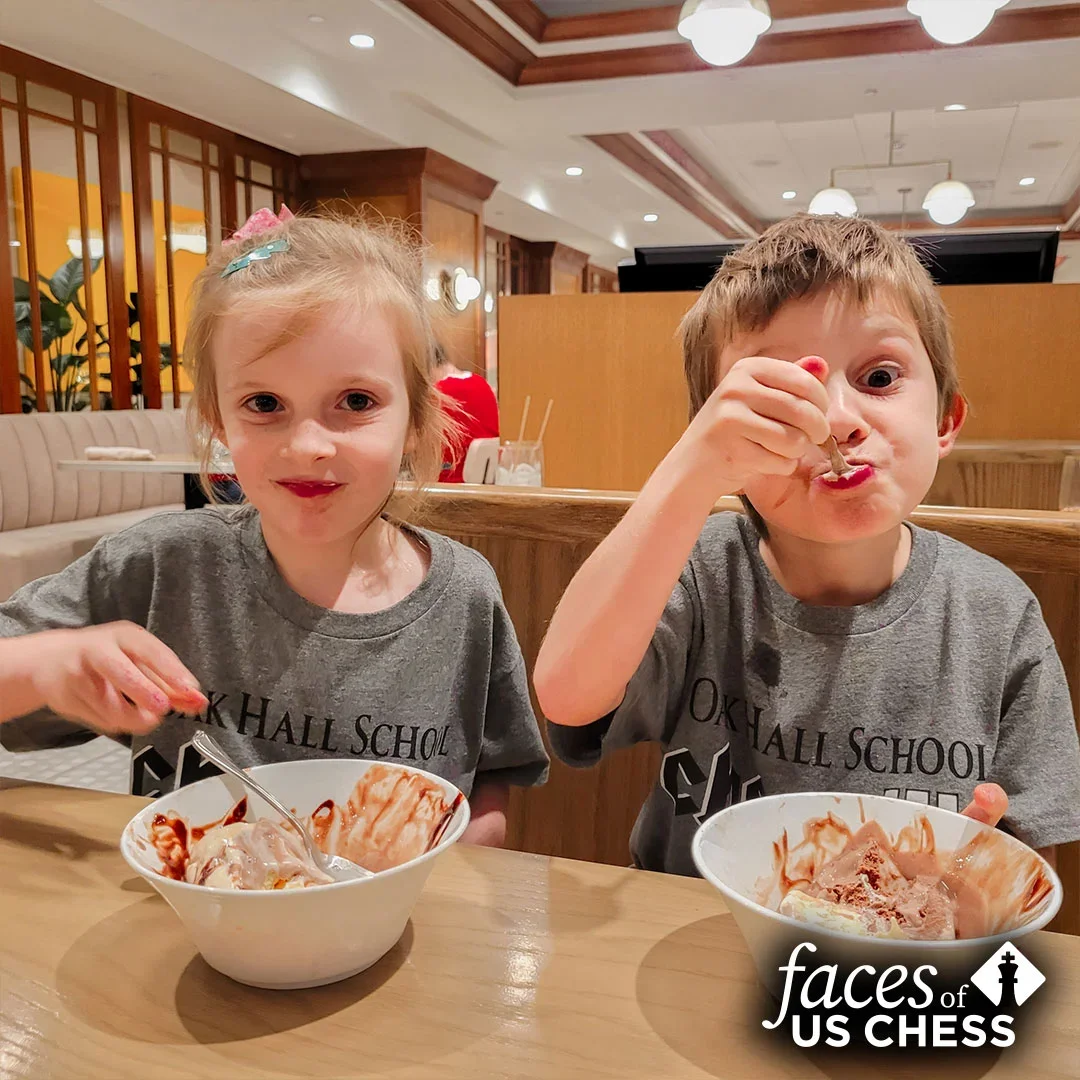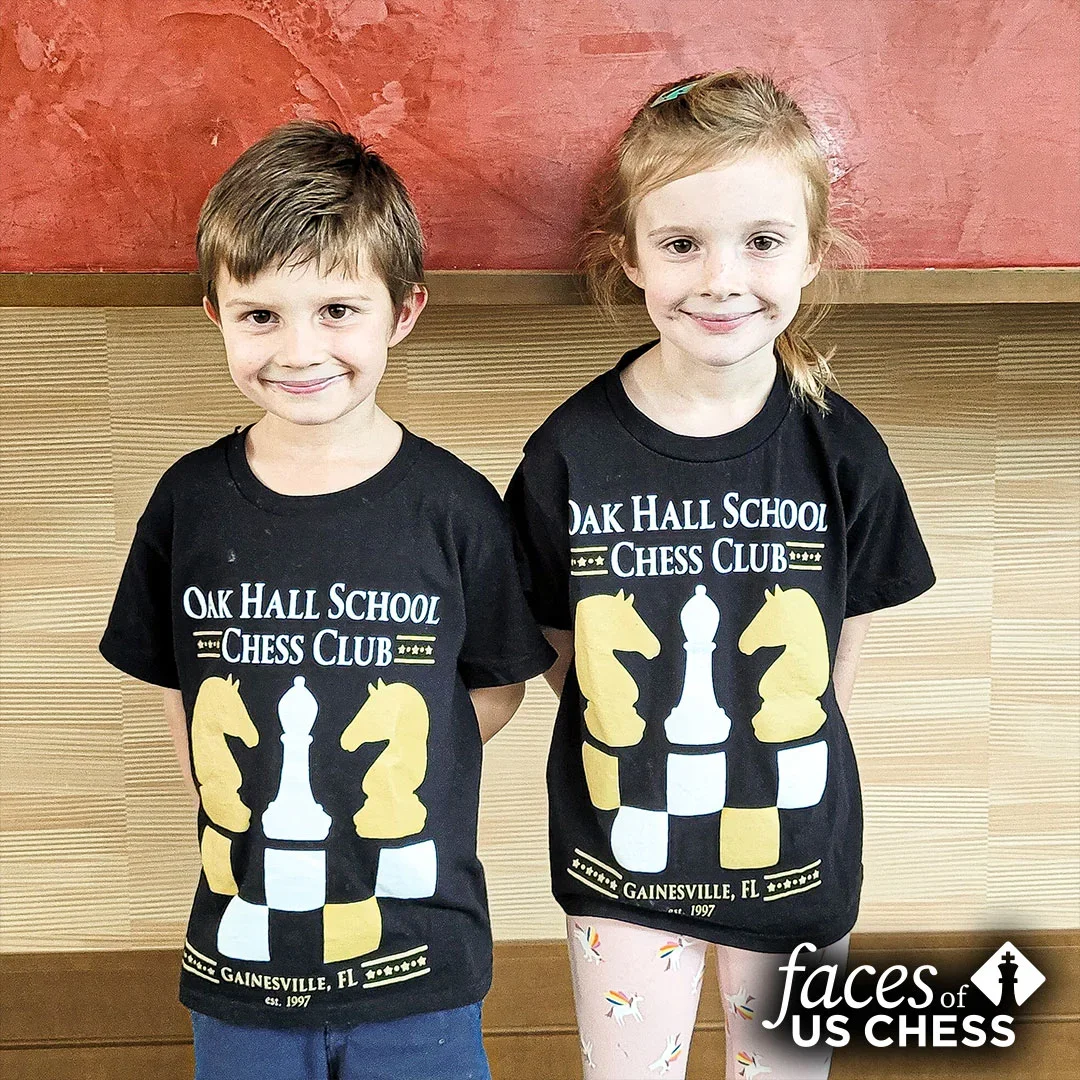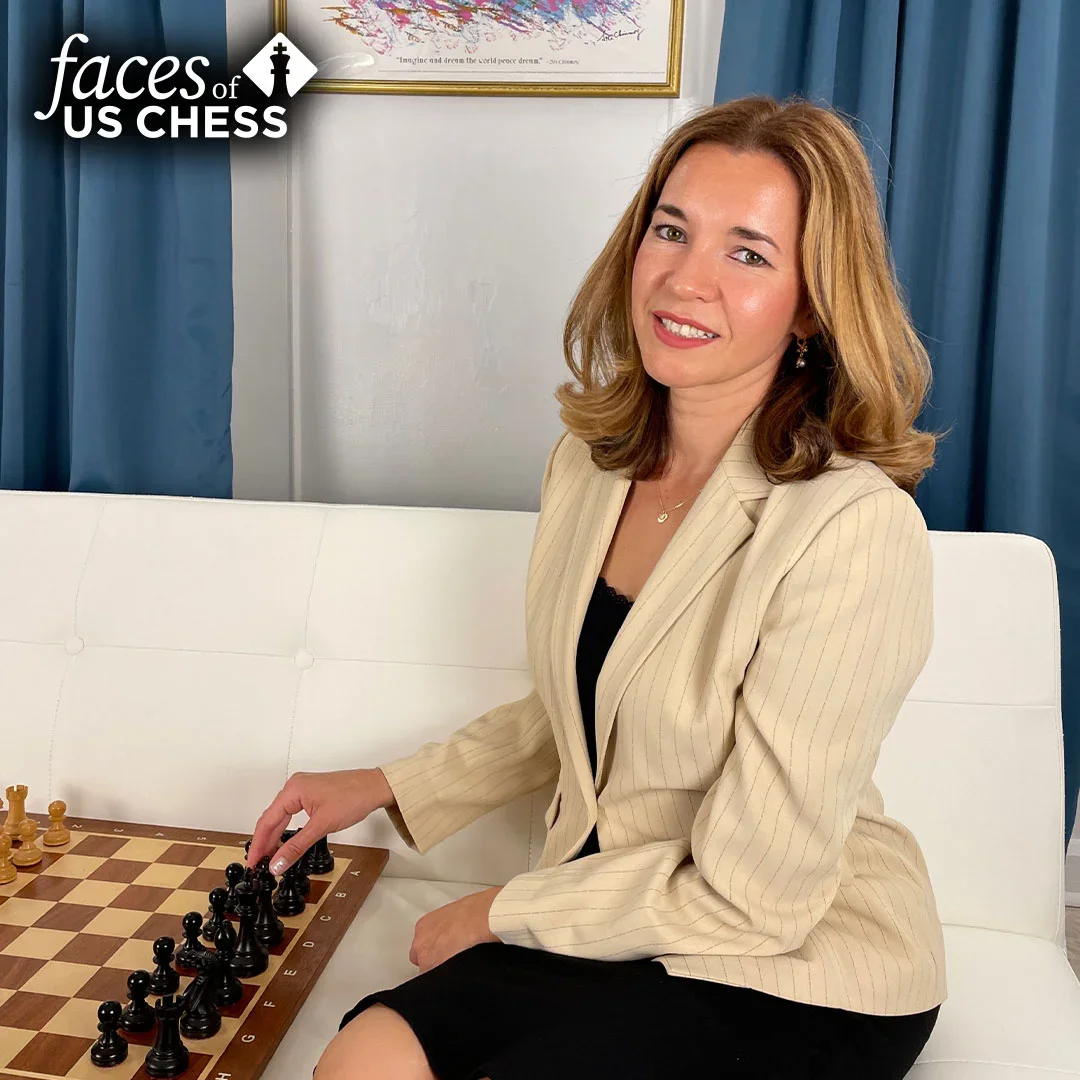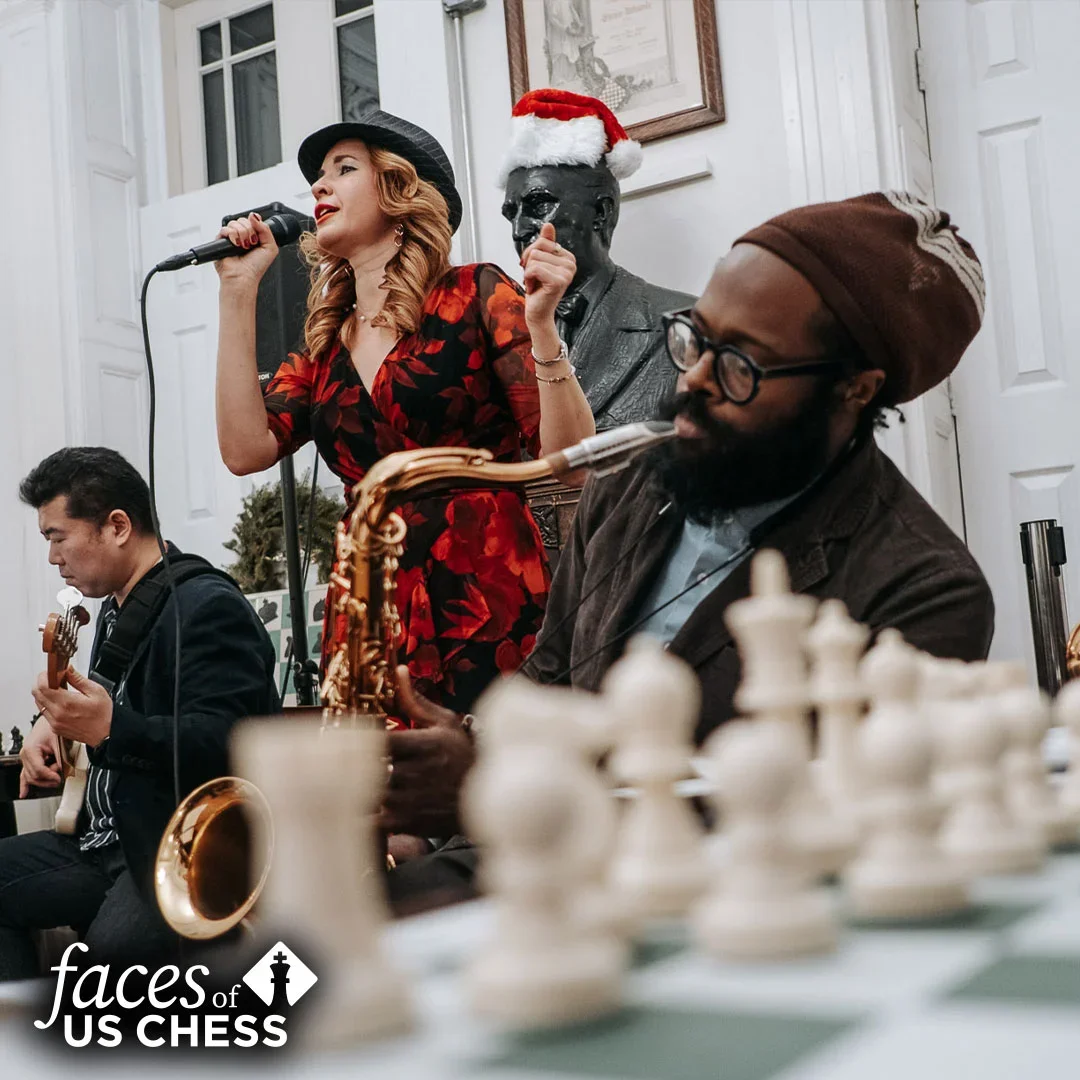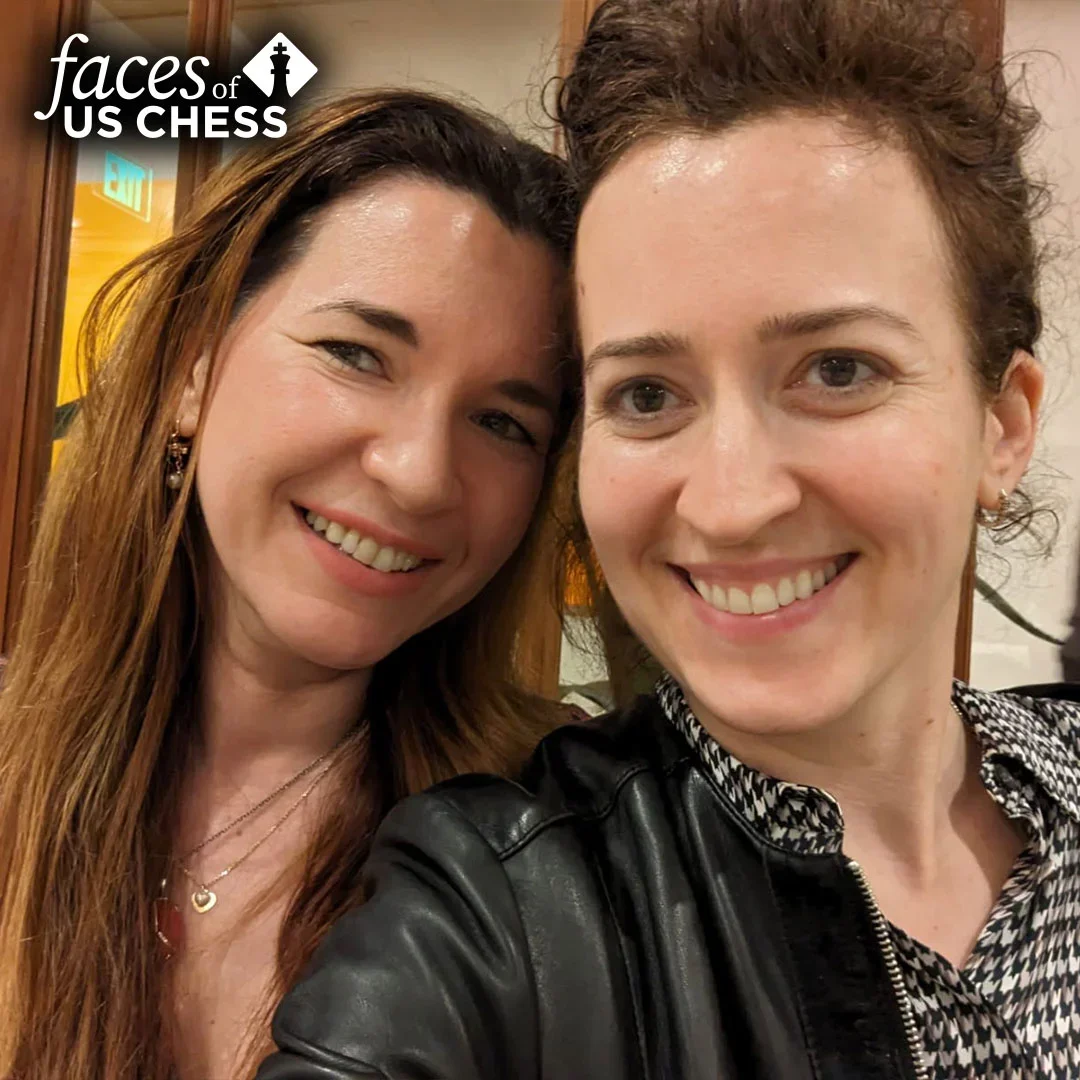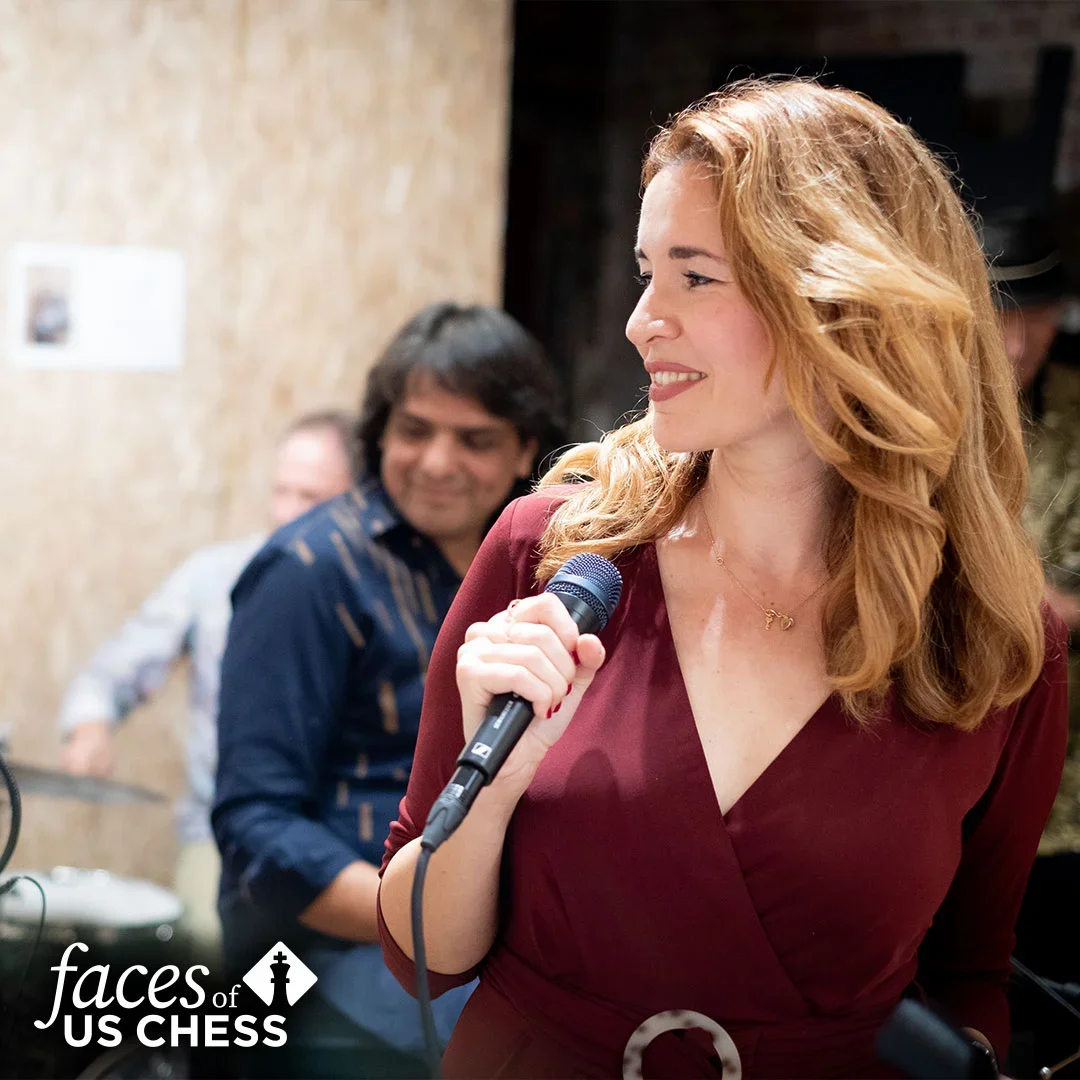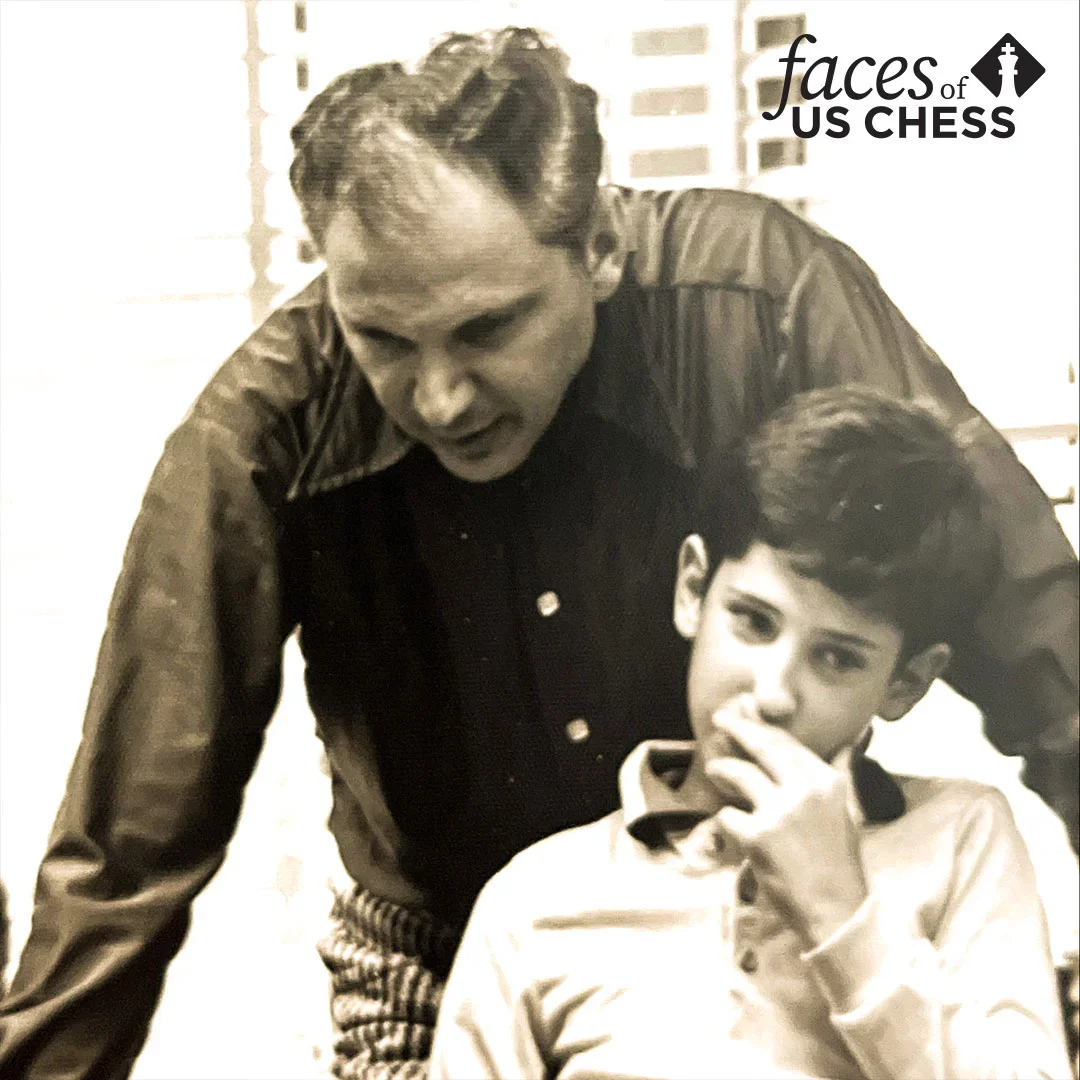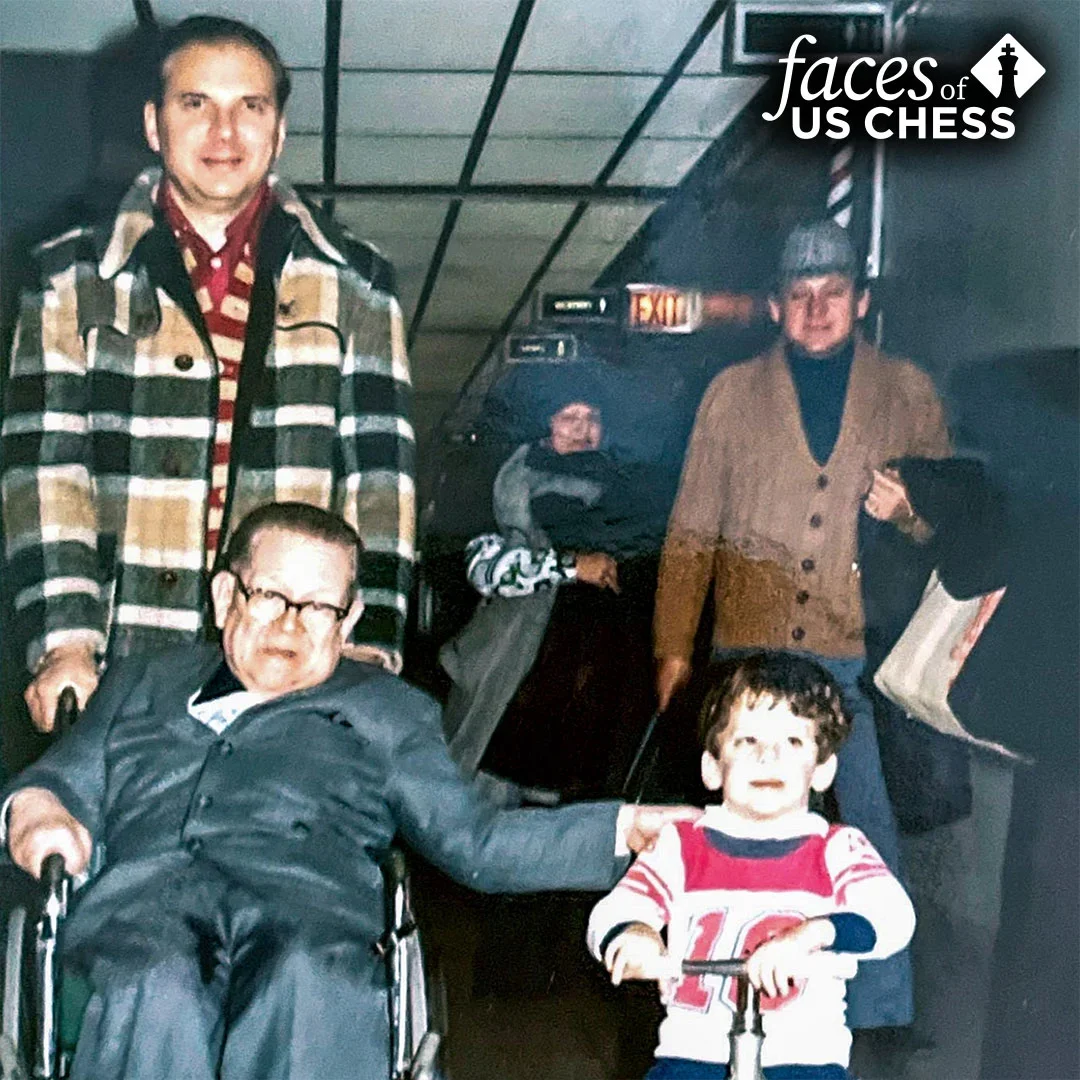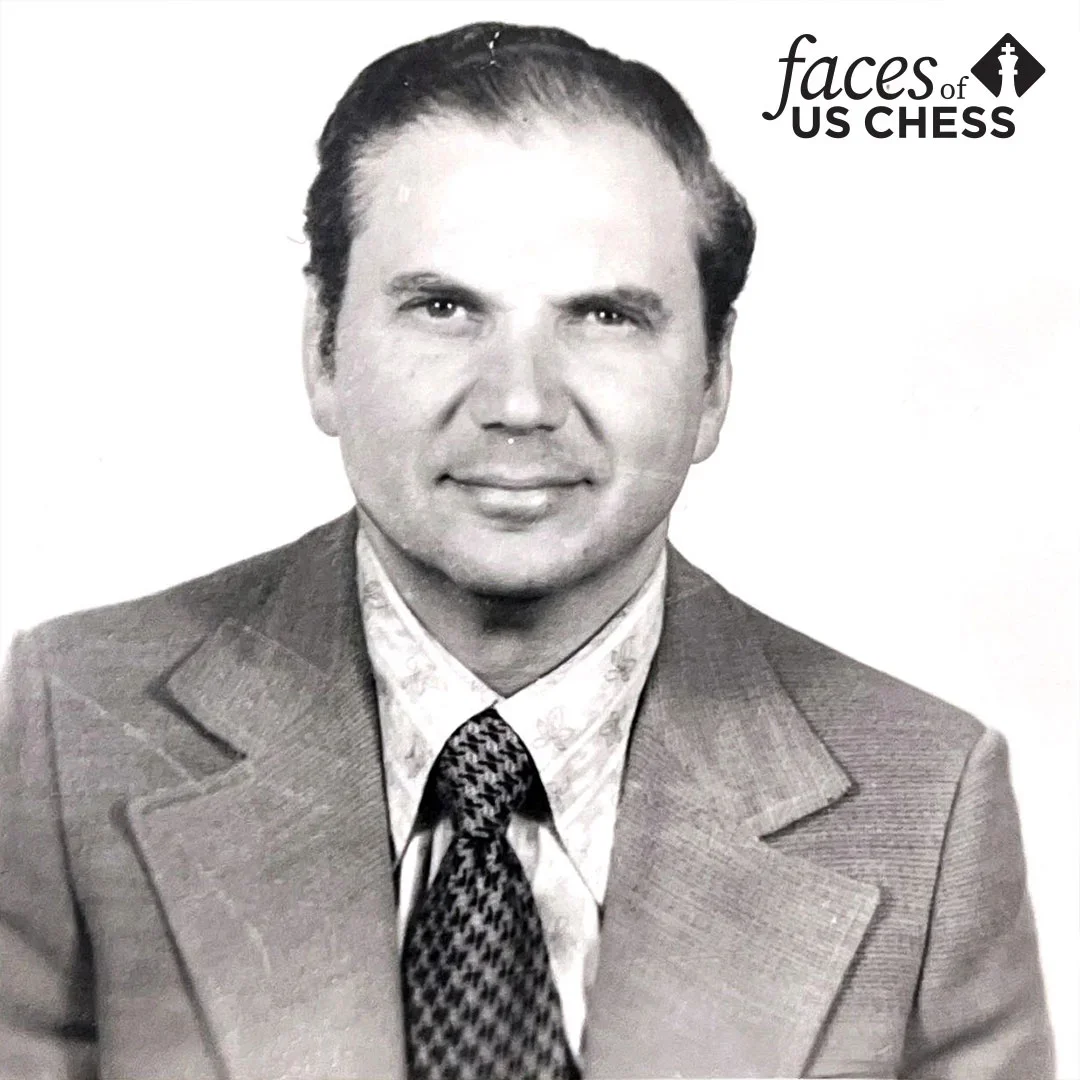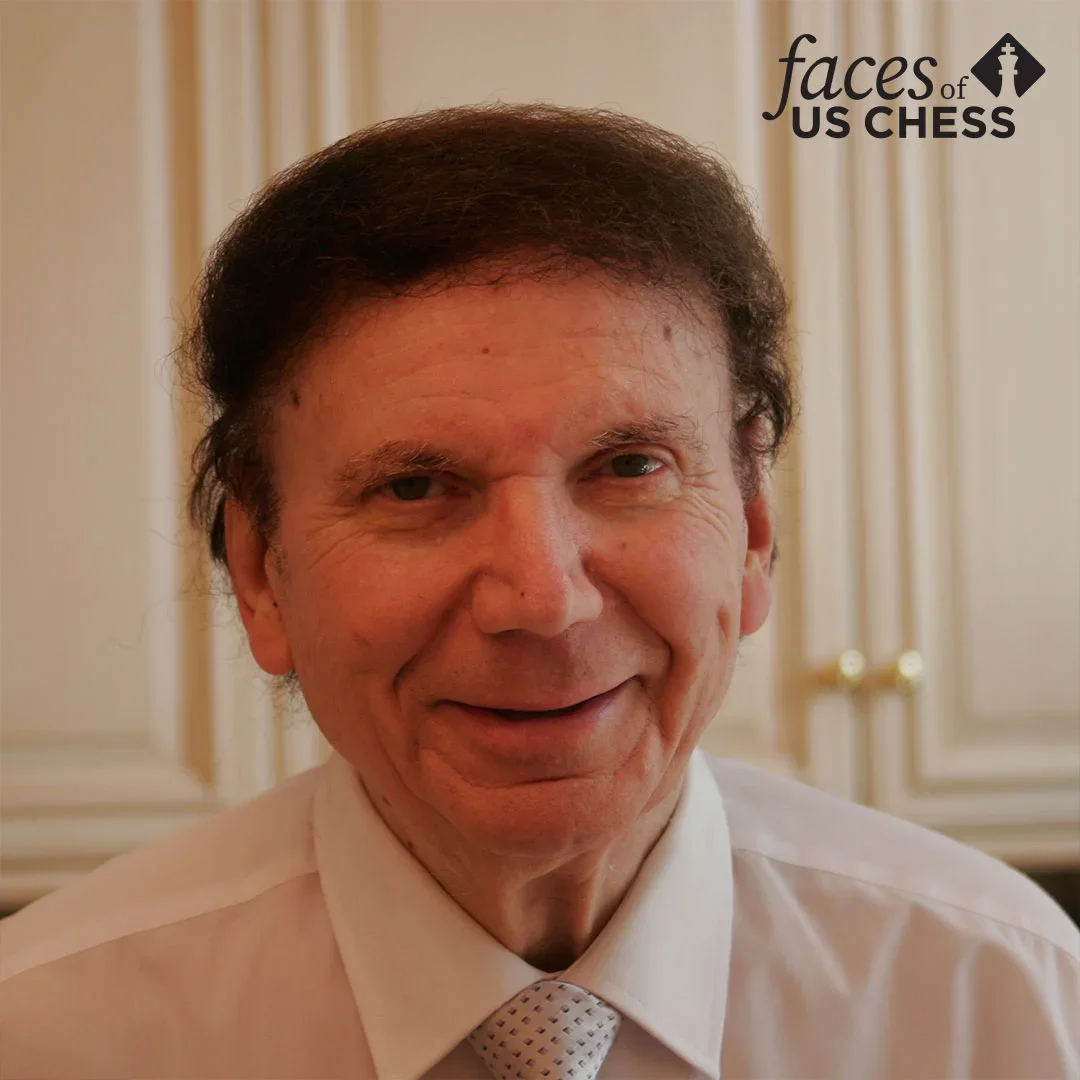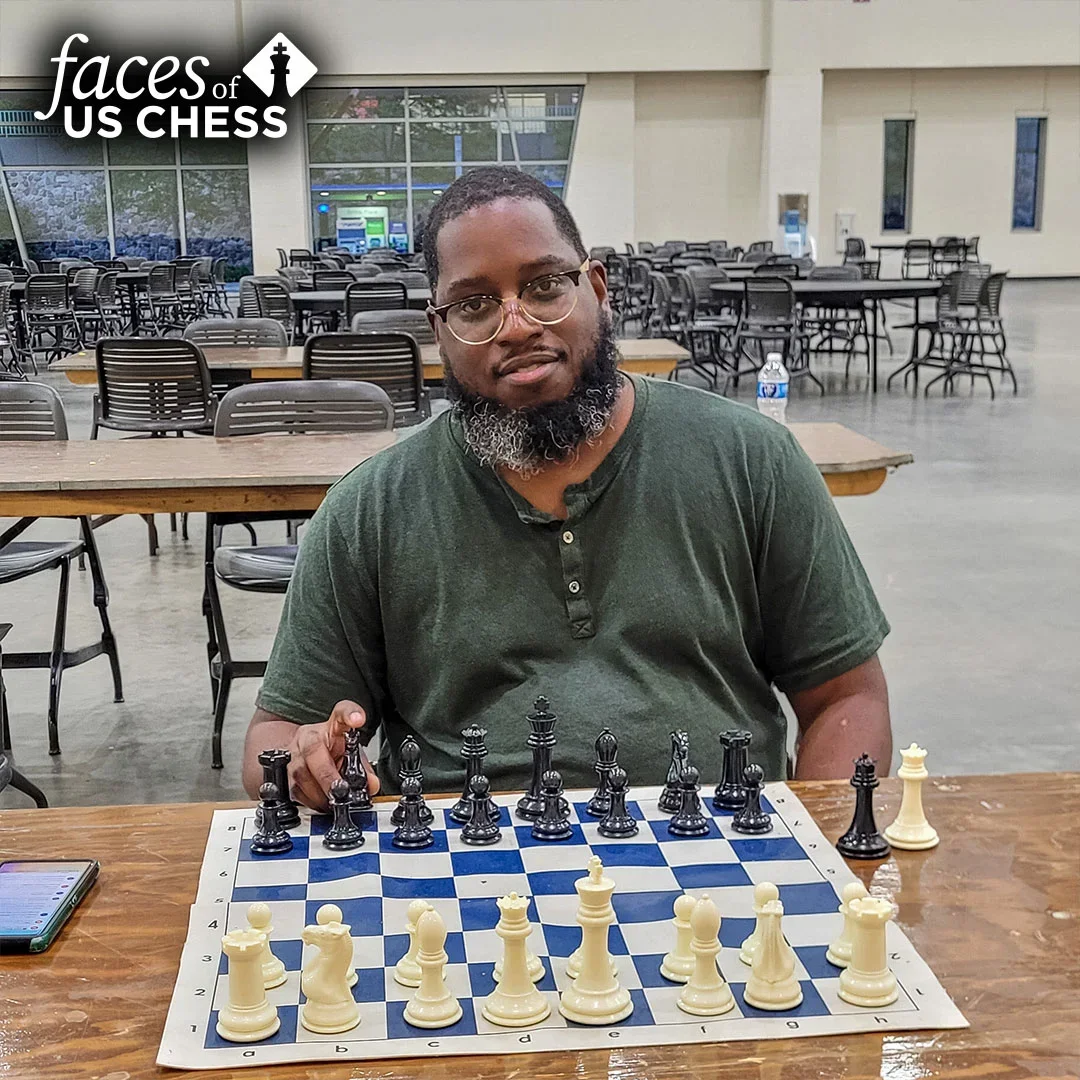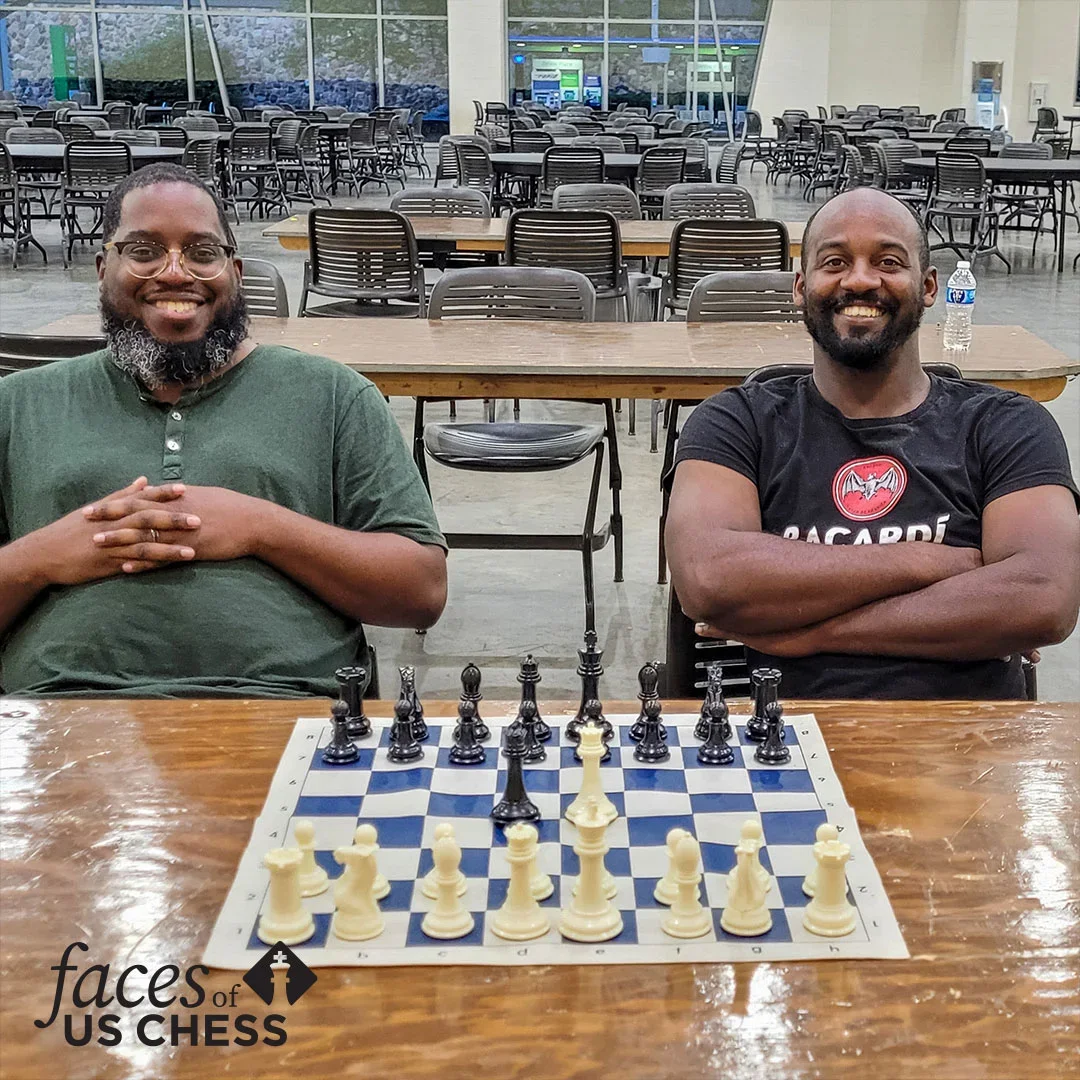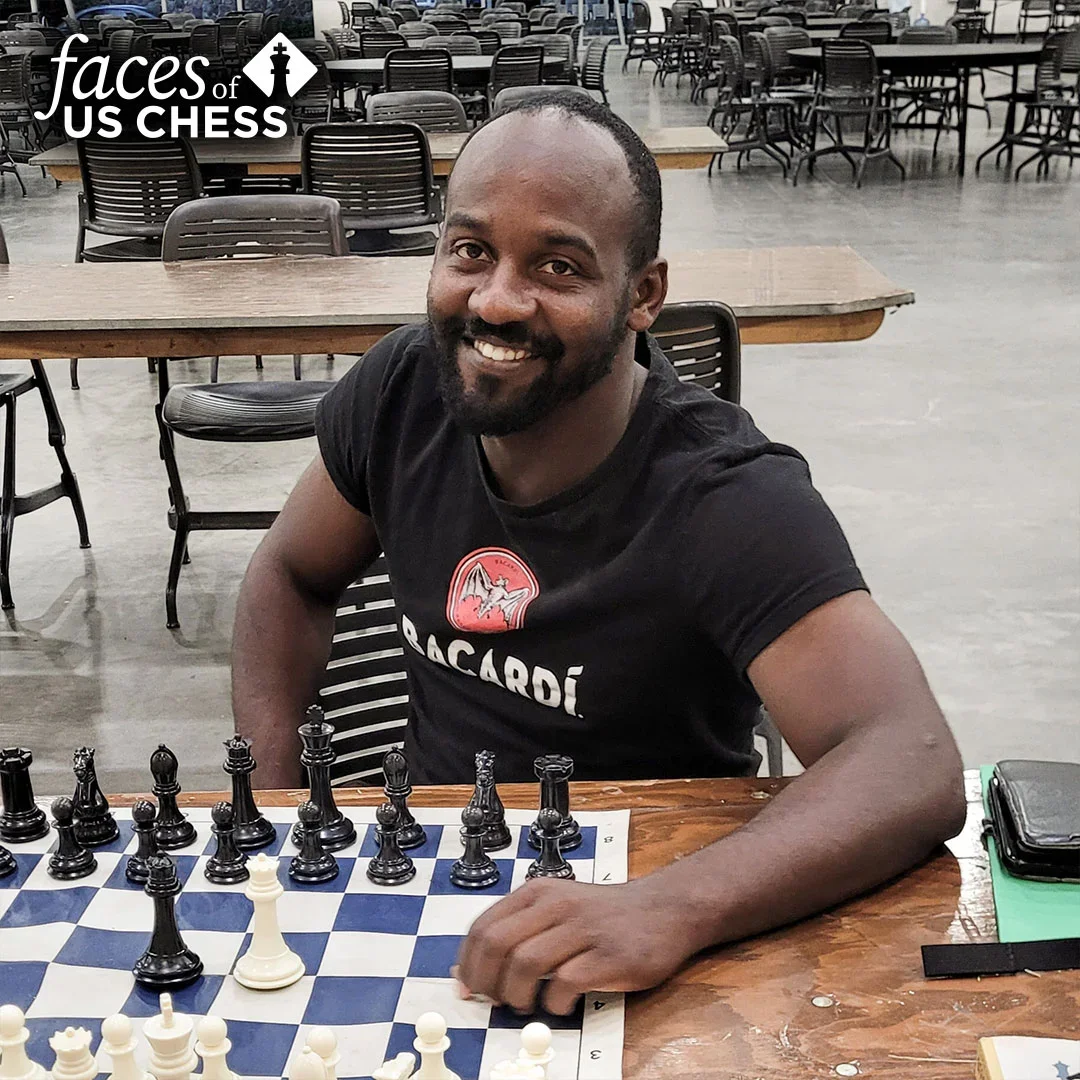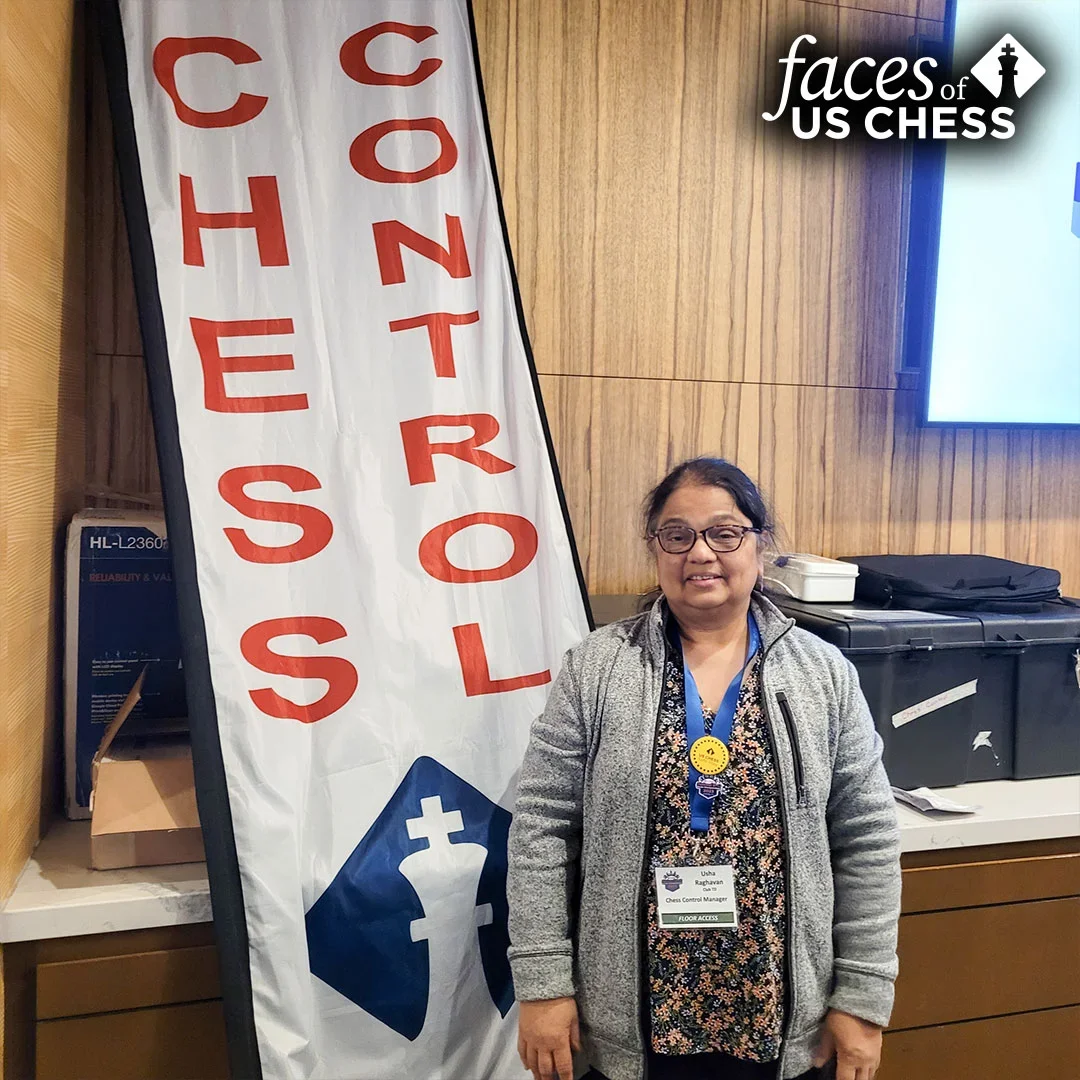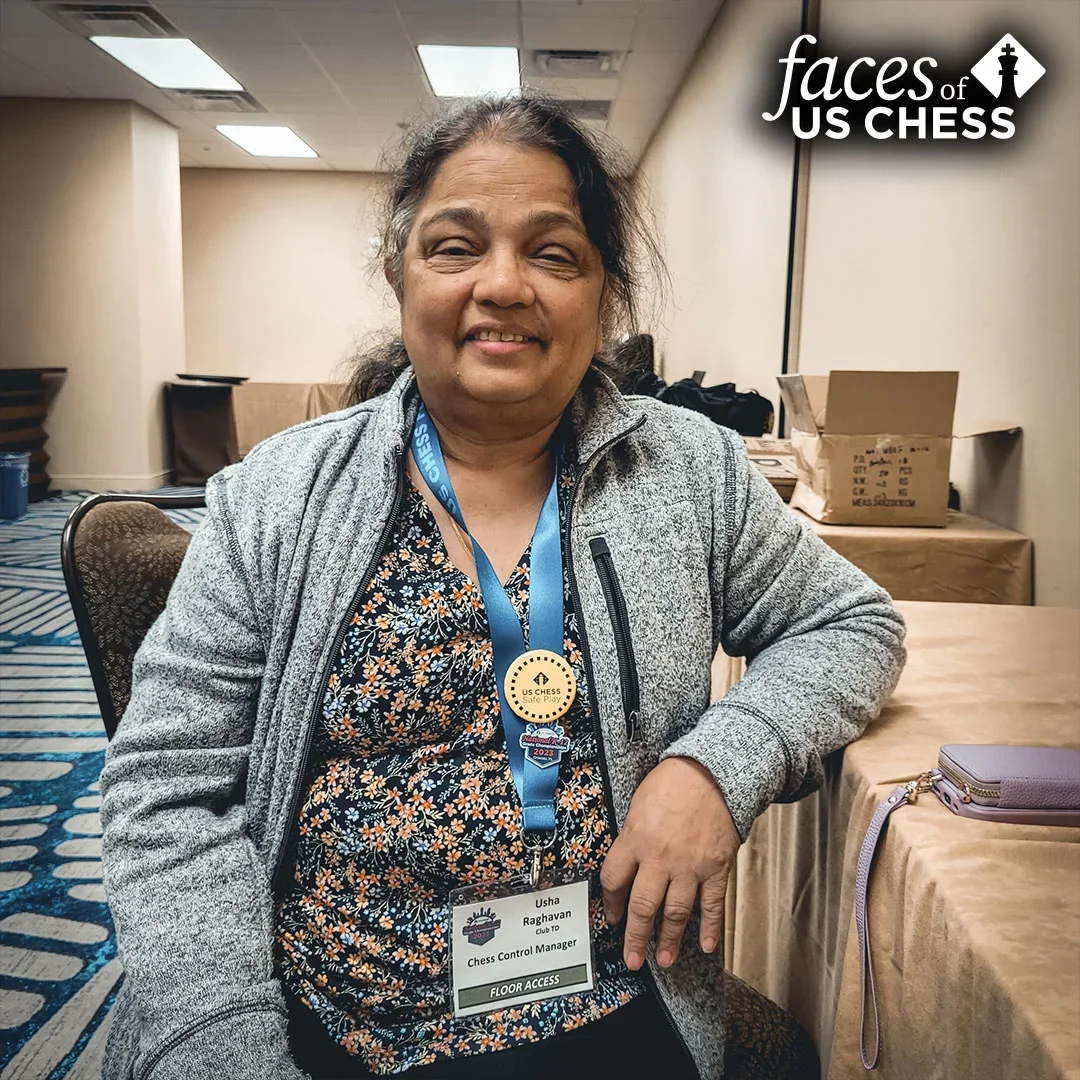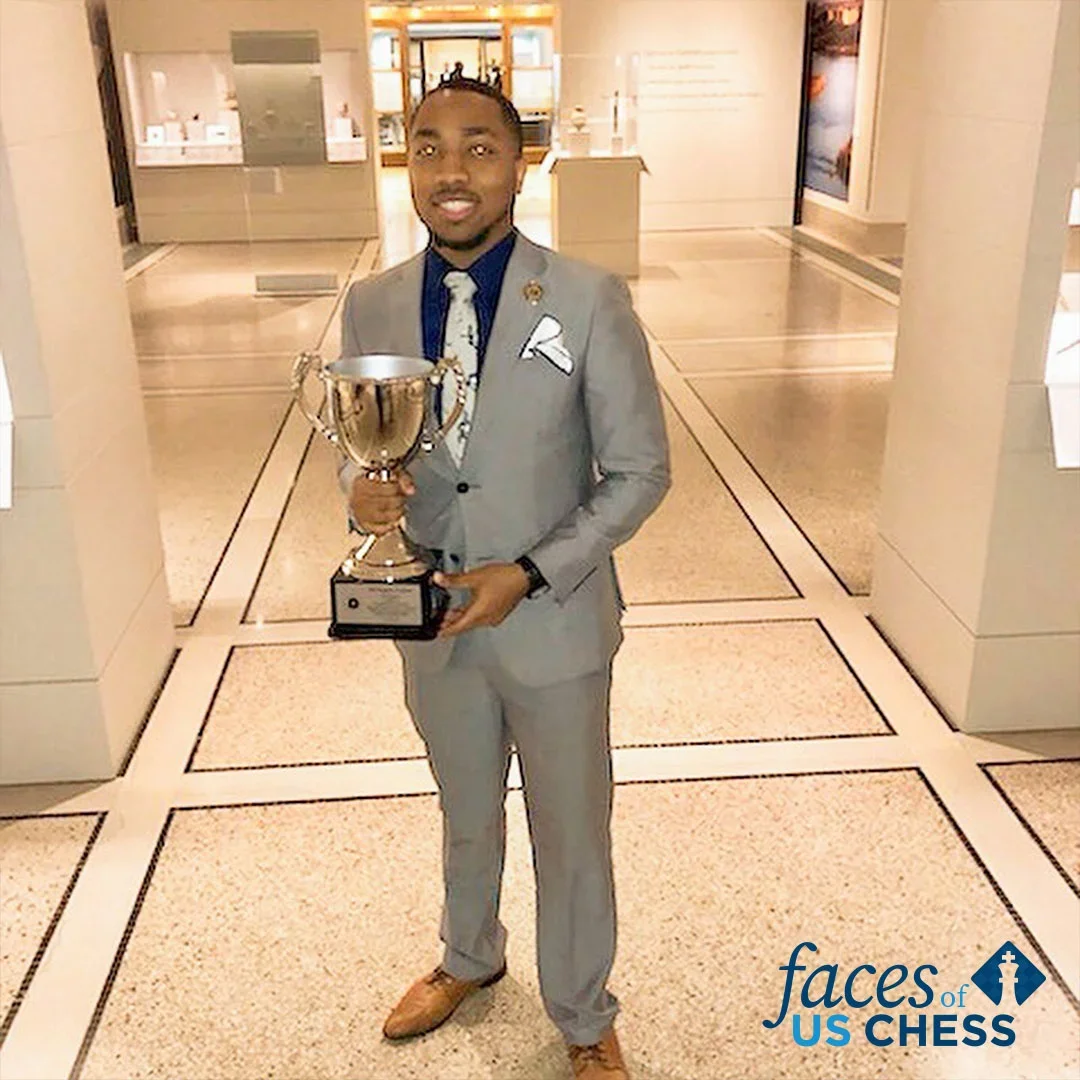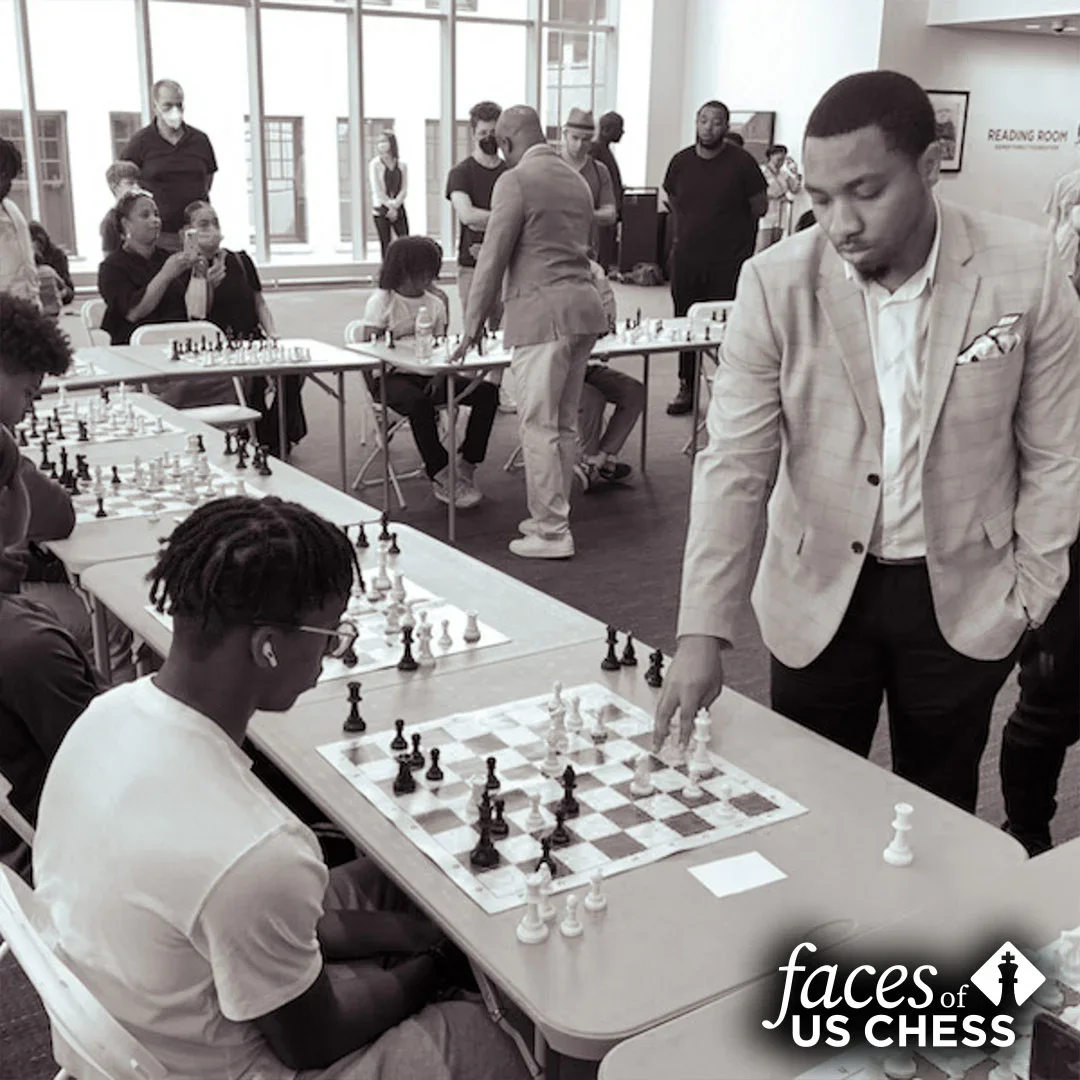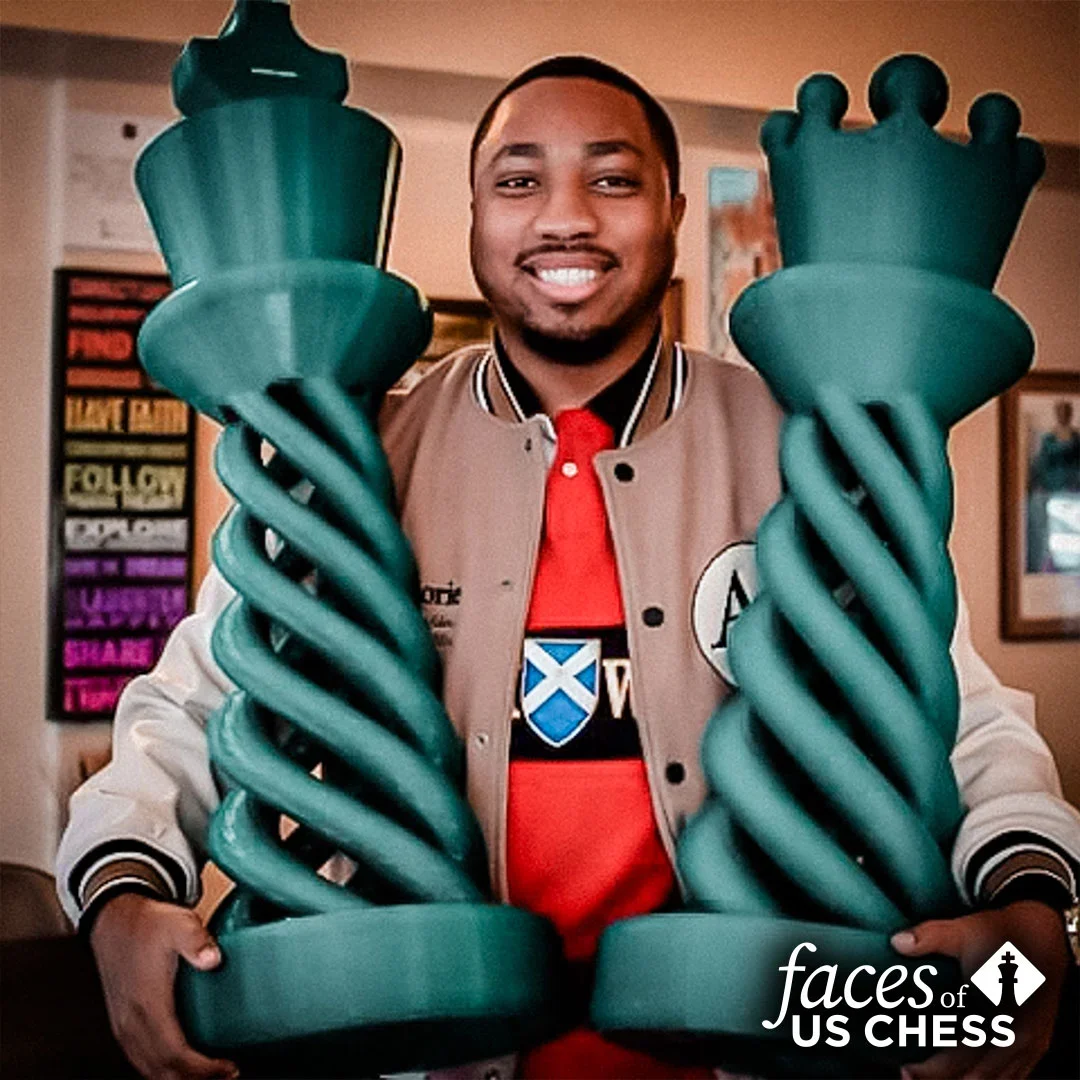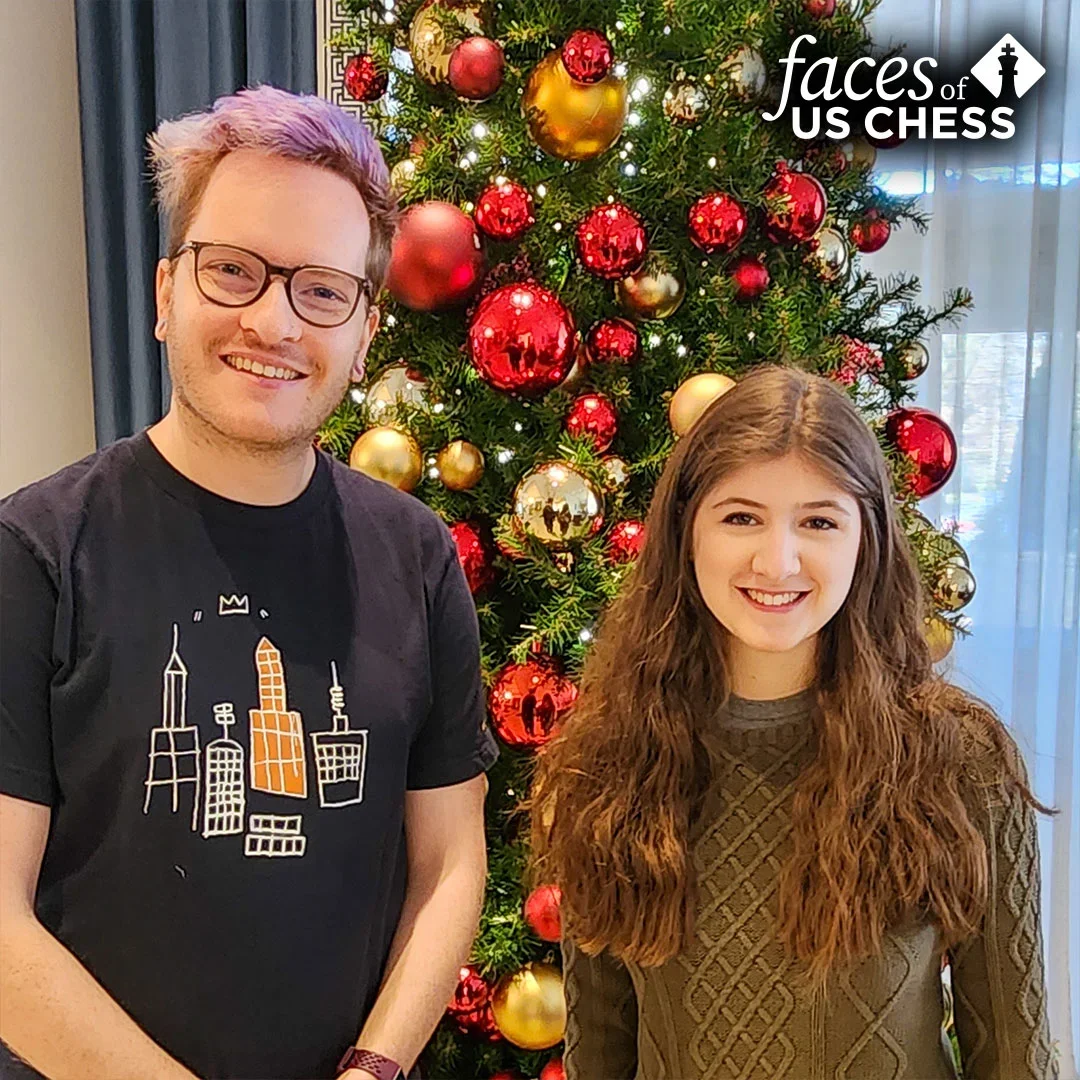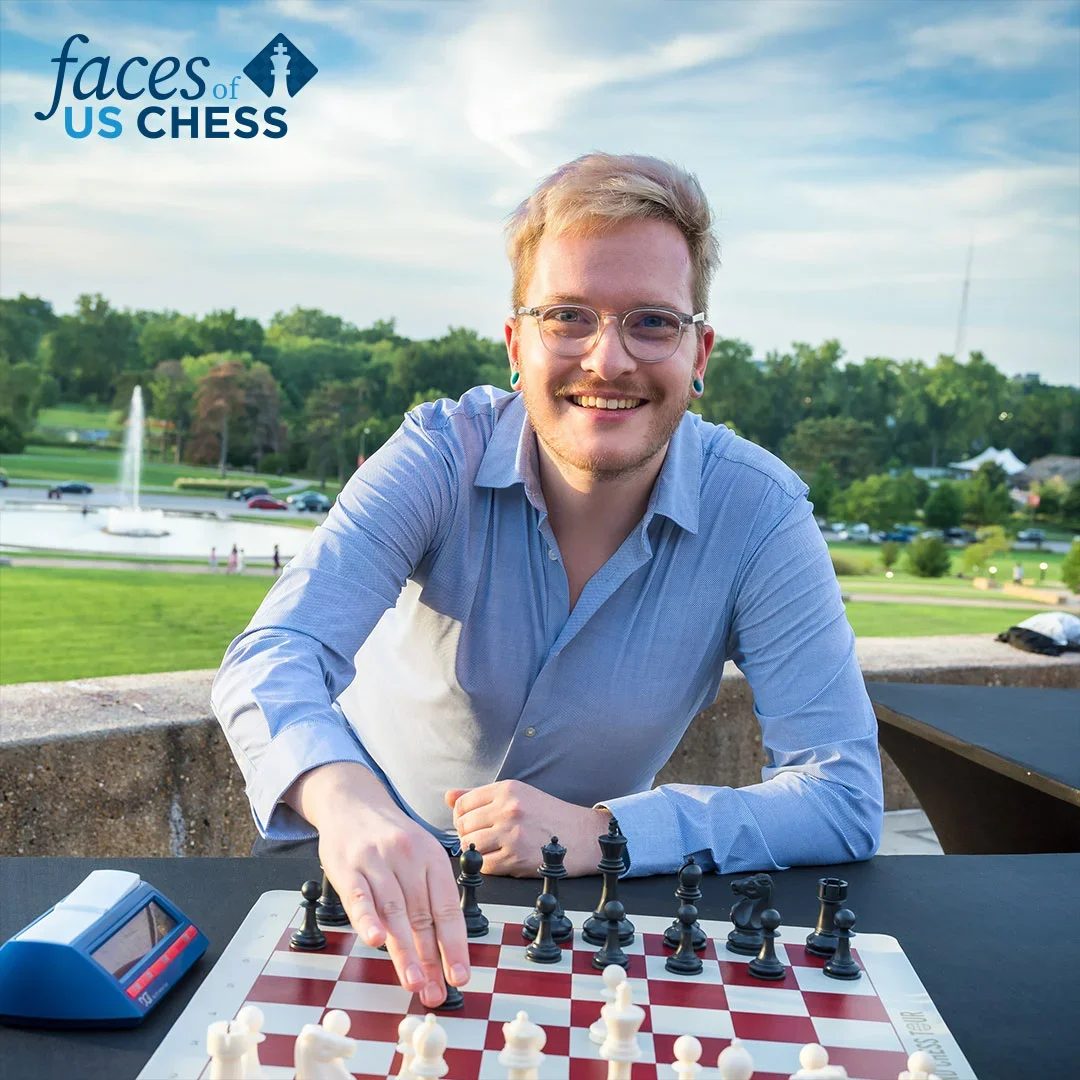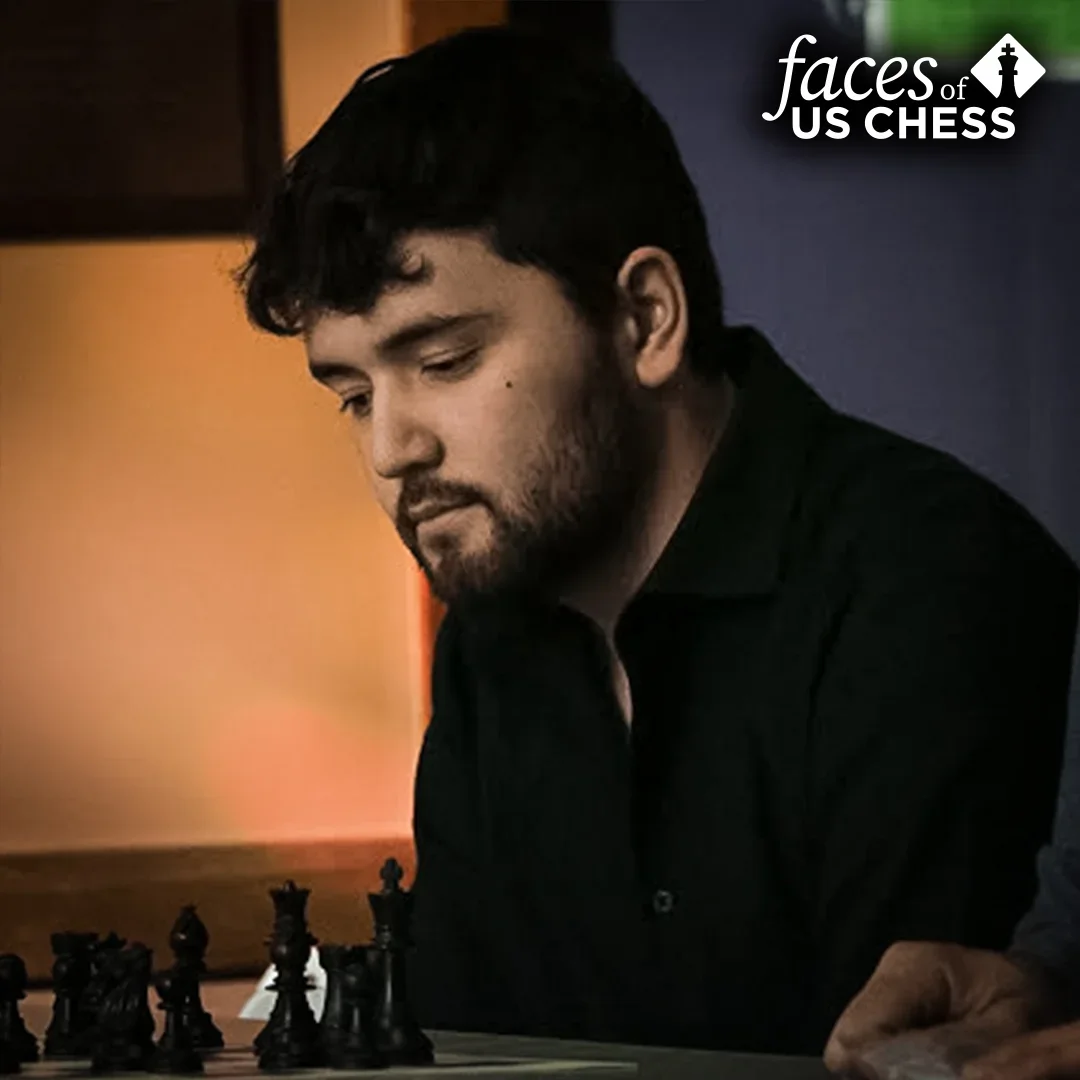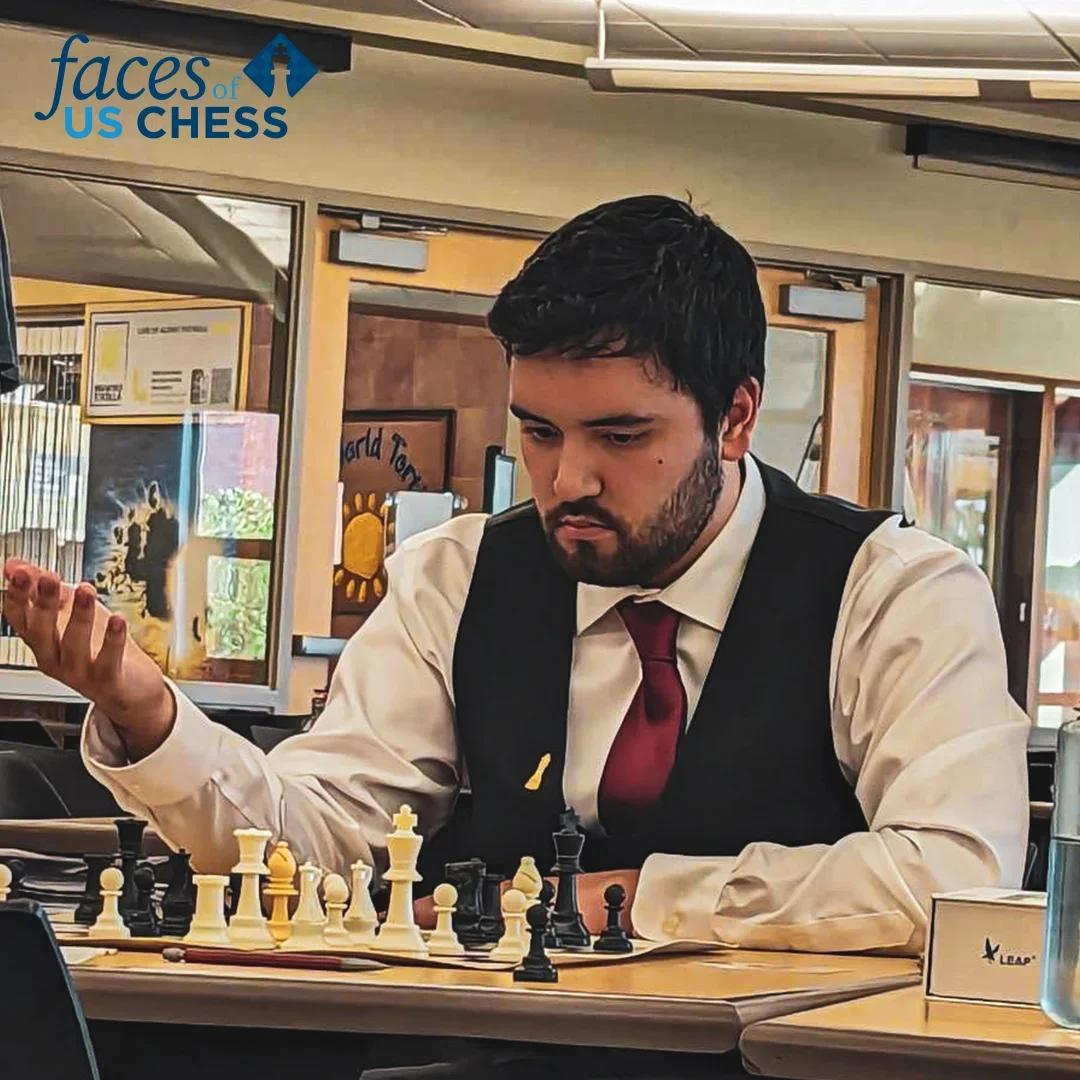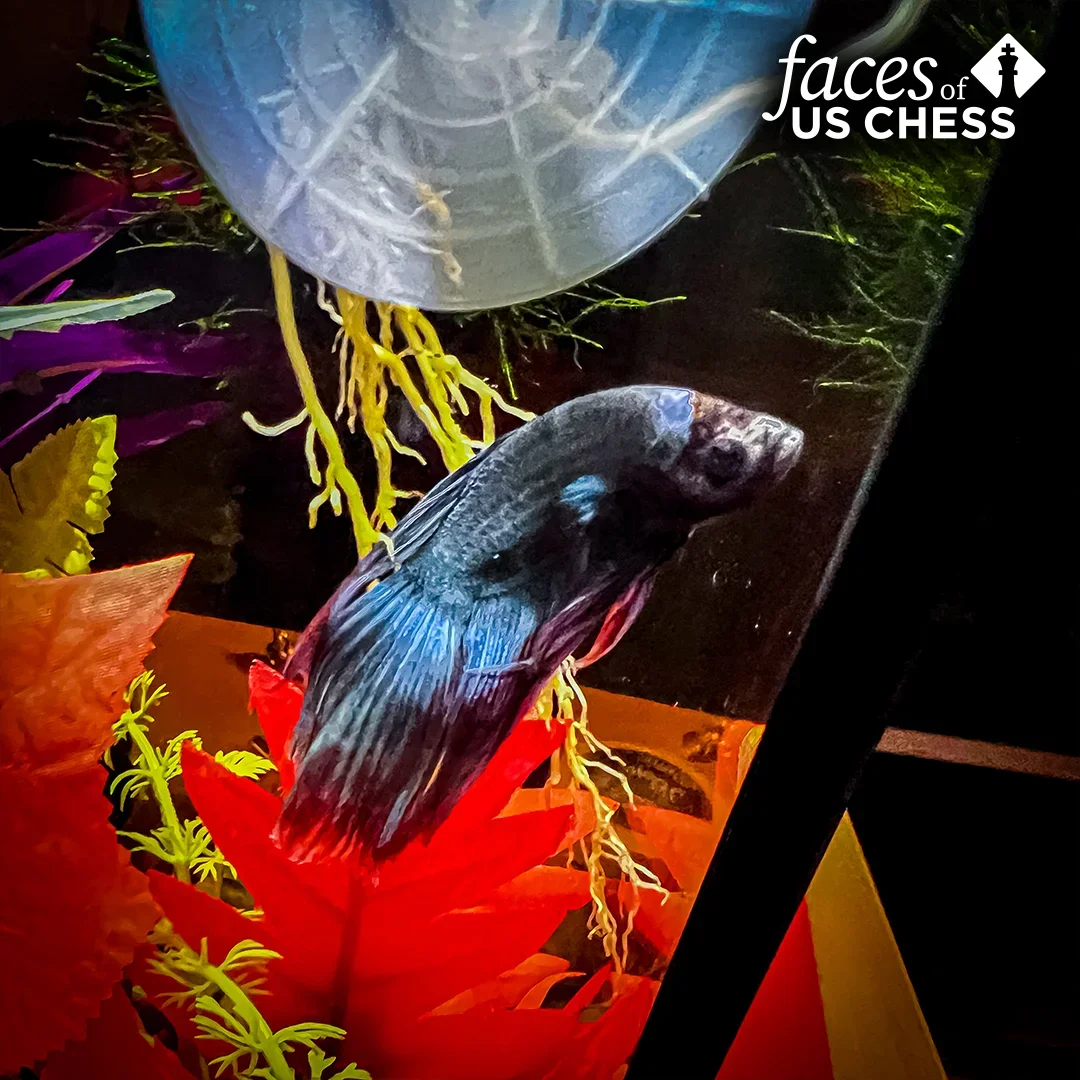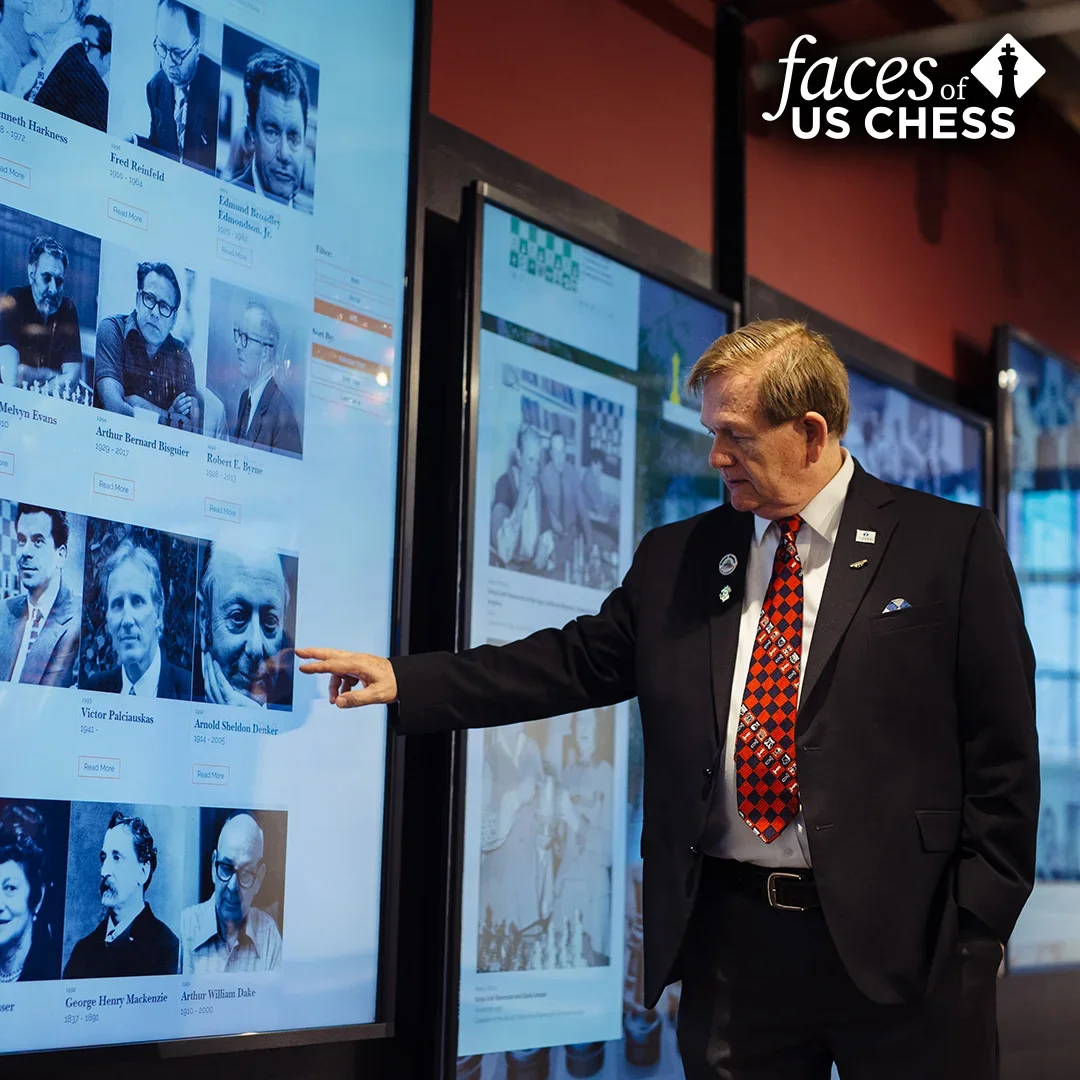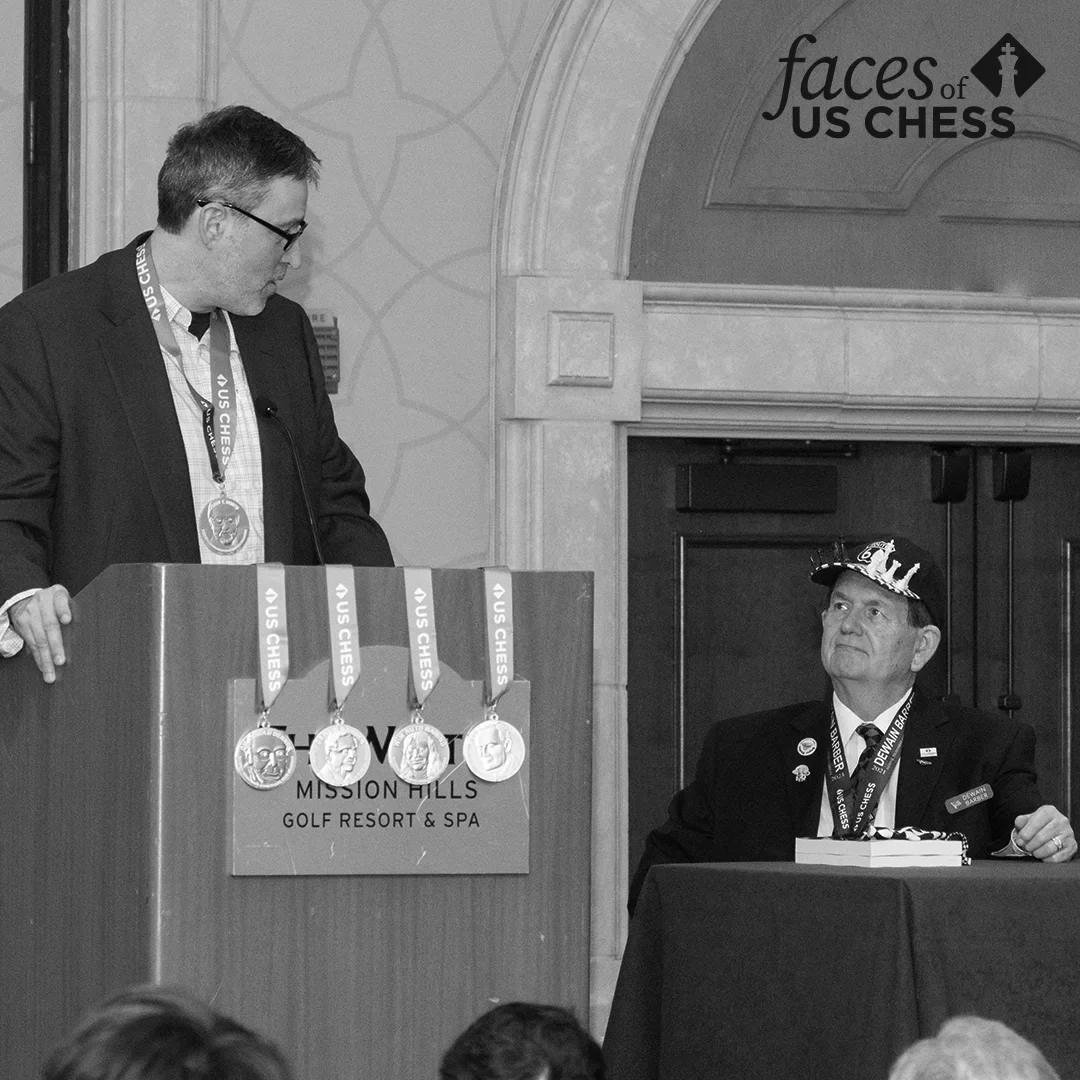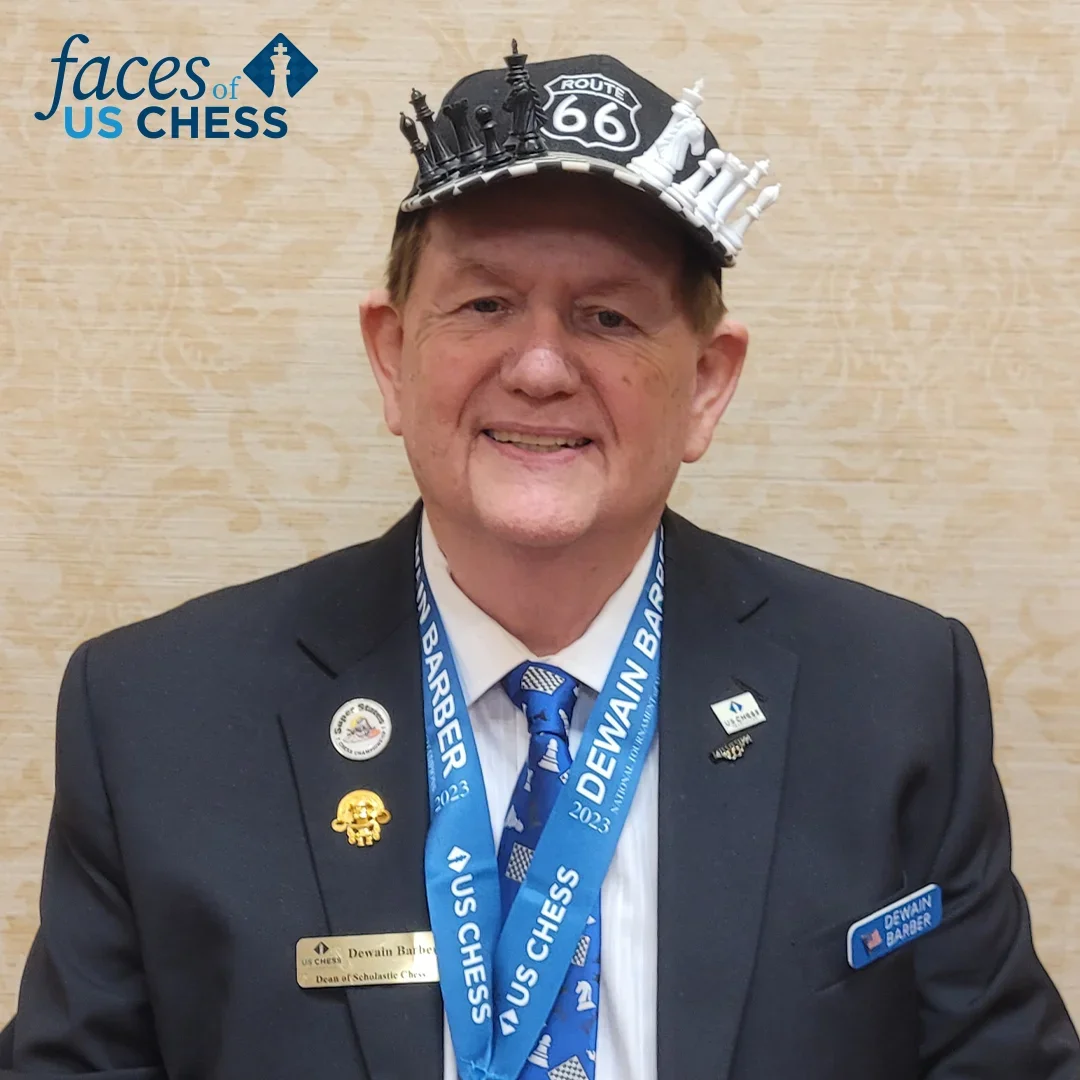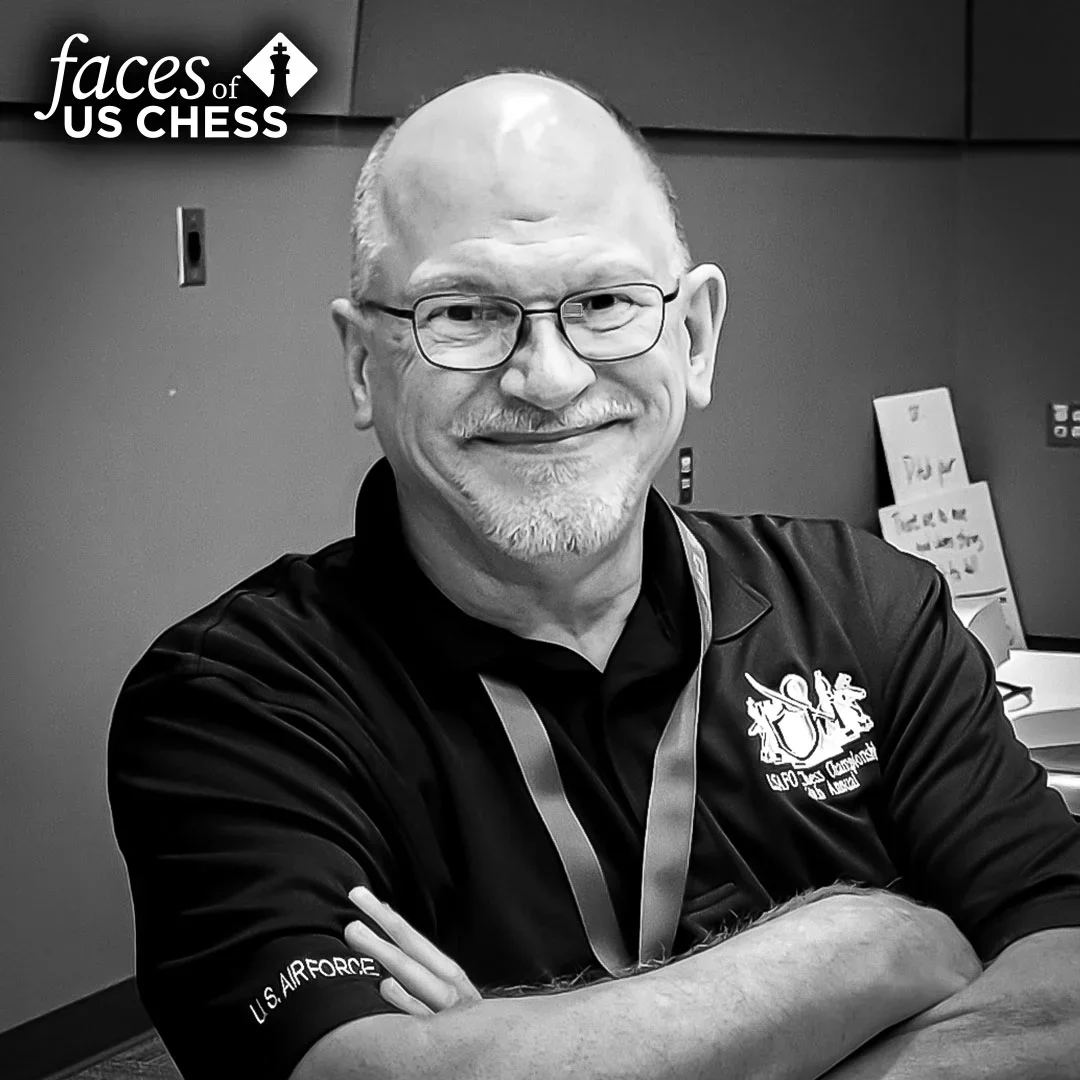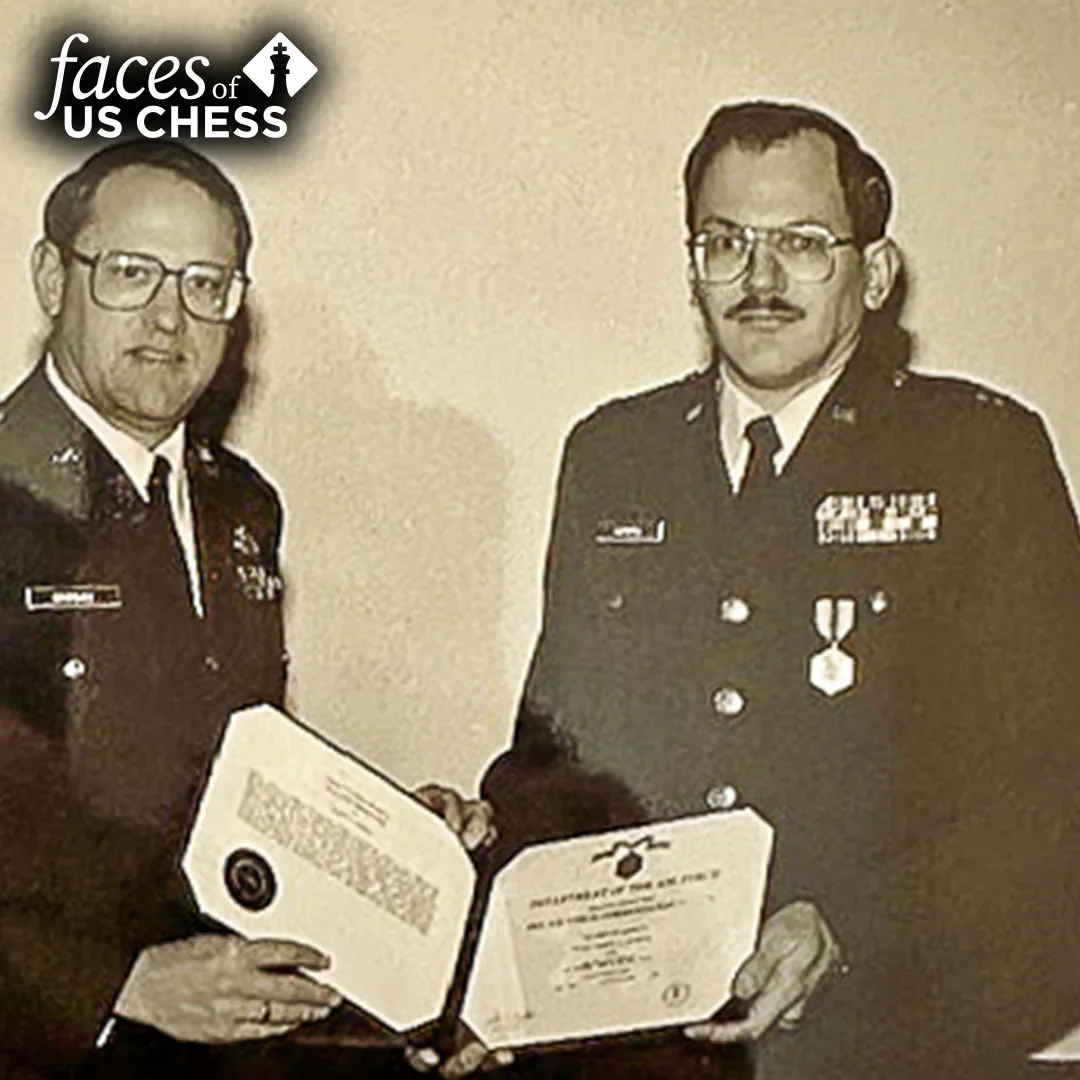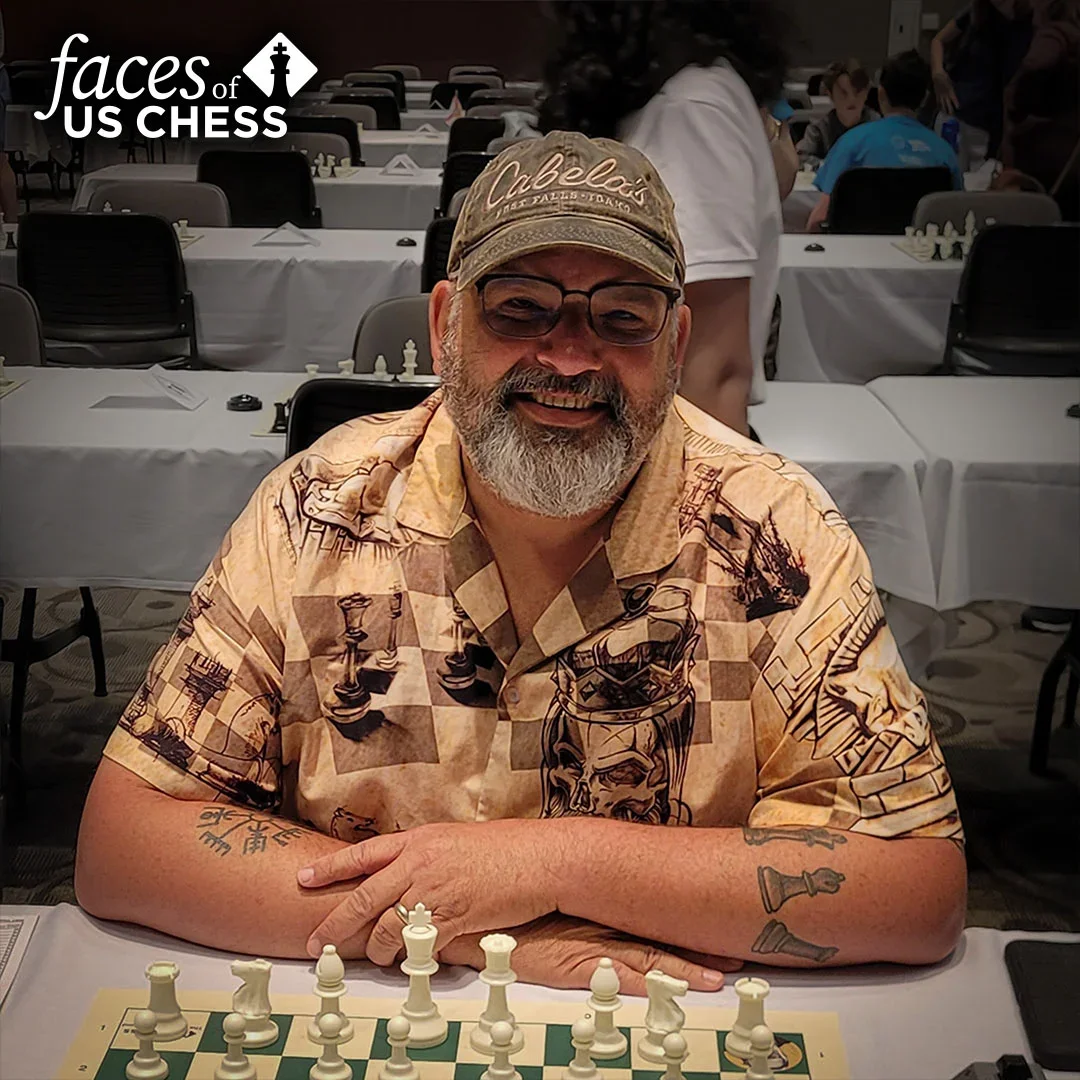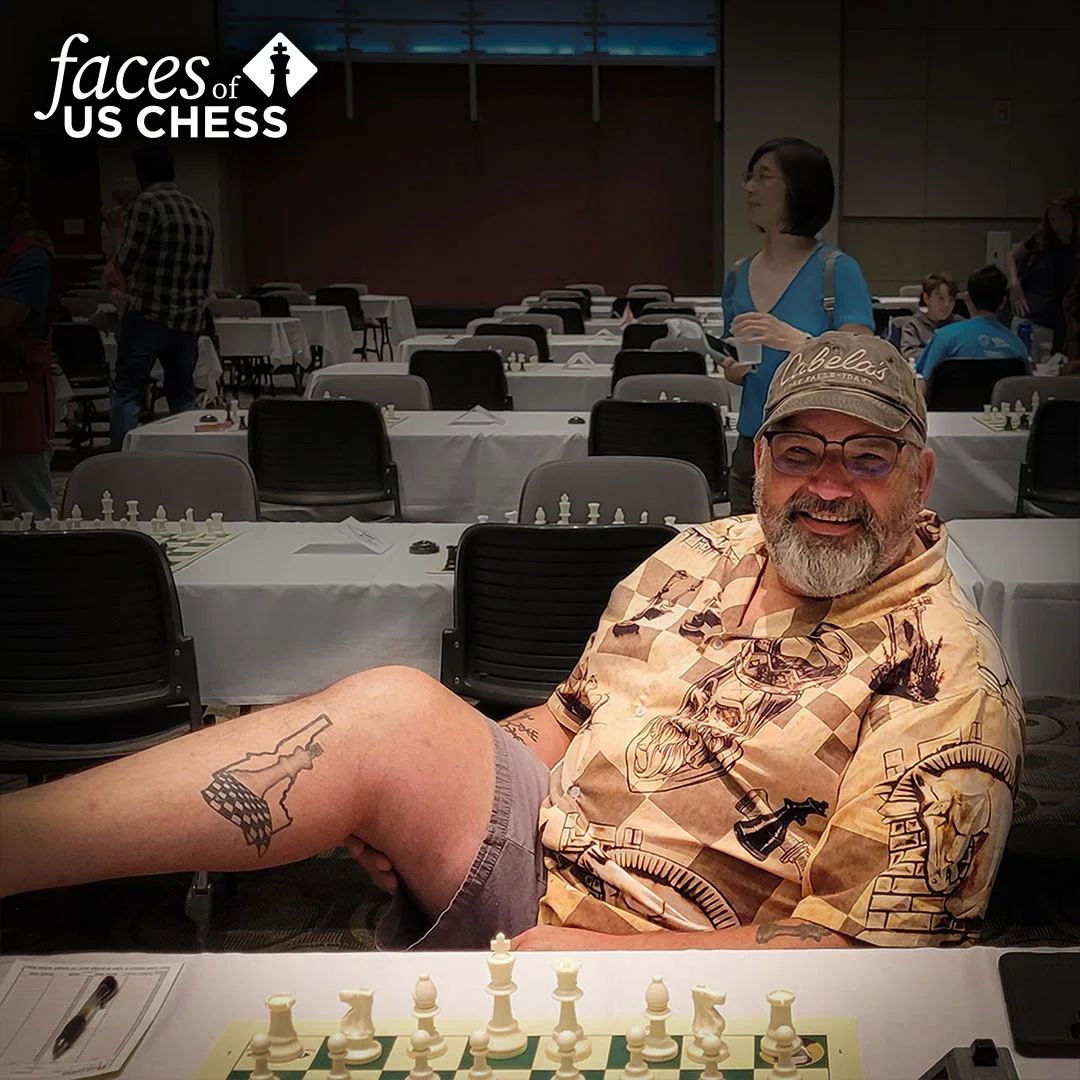The mission of US Chess is to empower people, enrich lives, and enhance communities through chess. Faces of US Chess is a collection of stories that highlights the realization of this mission as told through personal narratives. Check back here or follow us on Instagram to find more stories from the US Chess community. Also look for us at a chess event in the future to share your story.
"I don’t play chess, but I respect it and the community as a whole. I appreciate the complexity of the game and what it takes to be great at it. However, what I have grown to love is its ability to unite communities, inspire people, and improve lives.
I was introduced to chess during college by a person who was rather important to me. Chess has since created many opportunities for me, as it so often does for people. I became engaged in my community by volunteering at local events. I made friends while helping organize a chess club at my college. I even found employment with US Chess after graduating. These days, chess helps me bond with my kids and stay involved at their school club.
A little over a year ago, I went to the National High School Championship, where I interviewed people for our new campaign, Faces of US Chess. I walked around the venue, a hotel in Washington D.C., asking people questions, having conversations, and taking their pictures.
I listened to players, family members, tournament directors, coaches, teachers, and volunteers, and all of them spoke about how important chess is to them. They told me how chess has helped them or others close to them, in some of the same ways it has helped me, but also in so many more. Their stories were profound, inspiring, raw, and so human. I got goosebumps, I laughed, and I even cried a few times hearing their stories.
What I grew to realize is that chess is important, not because it is some miraculous game or unsolvable puzzle. Not because it has been around for so long or it challenges us. It is important because it brings us together. And together is when we do our best work, build our best lives, and be our best selves.
I am so thankful to be a part of this community, to those who were willing to share some of their stories with me, and to everyone that read, shared, or commented on these stories. Thank you for being the Faces of US Chess."
-Natasha Roberts
This post marks the one year anniversary of Faces of US Chess and will be the last regular installment.
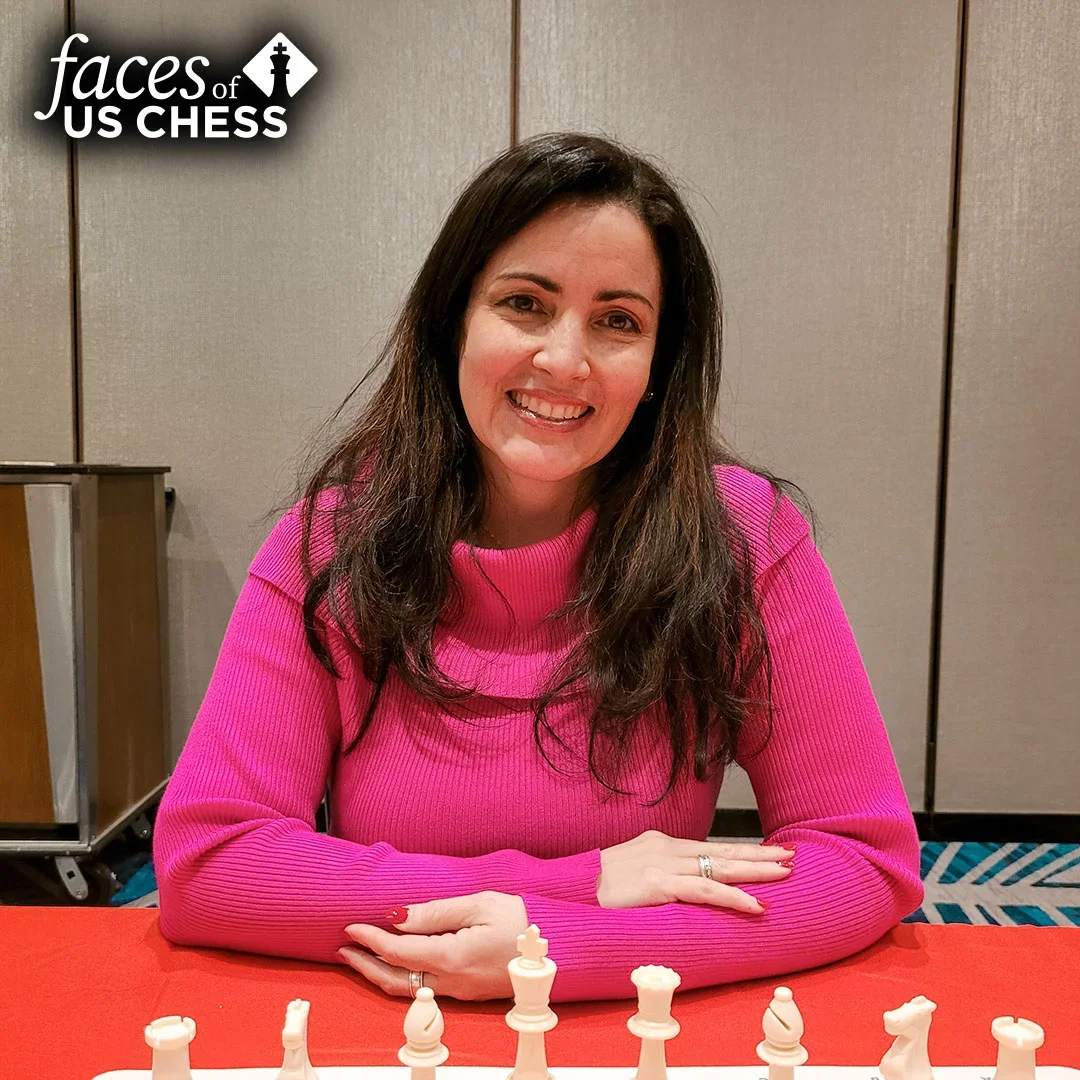
"When I was growing up, I was always surrounded by boys in chess, but that only pushed me to try harder. I decided that if I was going to be here, it would be because I liked the game, and I didn’t care who my opponent was. I think that kind of motivation made me challenge myself, because I realized I didn’t have to be in a certain group to accomplish my goals.
That’s why I thought it was important to join the US Chess women’s initiative. I wanted to show that any age or gender can excel. I’ve been visiting the Girls Club for a long time. I was a very early participant and have been working with Maureen Grimaud and Kimberly Doo for years. I was one of the first Girls Club guests — maybe I started in Atlanta back in 2014? It’s been amazing watching the program grow over the years.
Every other year I play in an open tournament, just for fun. But I stopped competing seriously about 10 years ago, because going to tournaments takes a lot of time. You need to spend time preparing. And once you’re working or going to college full time, the number of tournaments you can go to in a year are limited.
Instead, around the same time I stopped competing, I started Ortho Chess, a school program in Georgia. I wanted to share my passion for chess with others, even though I wasn’t going to tournaments regularly. Now we have over 180 students. We offer lessons for groups and individuals of all ages, because chess is for the entire family.
I’ve also taught chess in other schools for over 18 years. Some of the students I had in elementary school are already graduating from high school! For me, that's very rewarding, especially when they still remember their days at the chess club or in tournaments.
I am happy that I have remained active in the chess community without being committed to playing tournaments. I am proud to be Coach Carolina."
-Carolina Blanco
For her outstanding contributions to chess in Georgia, WIM Dr. Carolina Blanco was inducted into the Georgia Chess Association Hall of Fame on April 20, 2024. Visit her at the Girls Club during the National Middle School Champion-ship or at another event in the future.
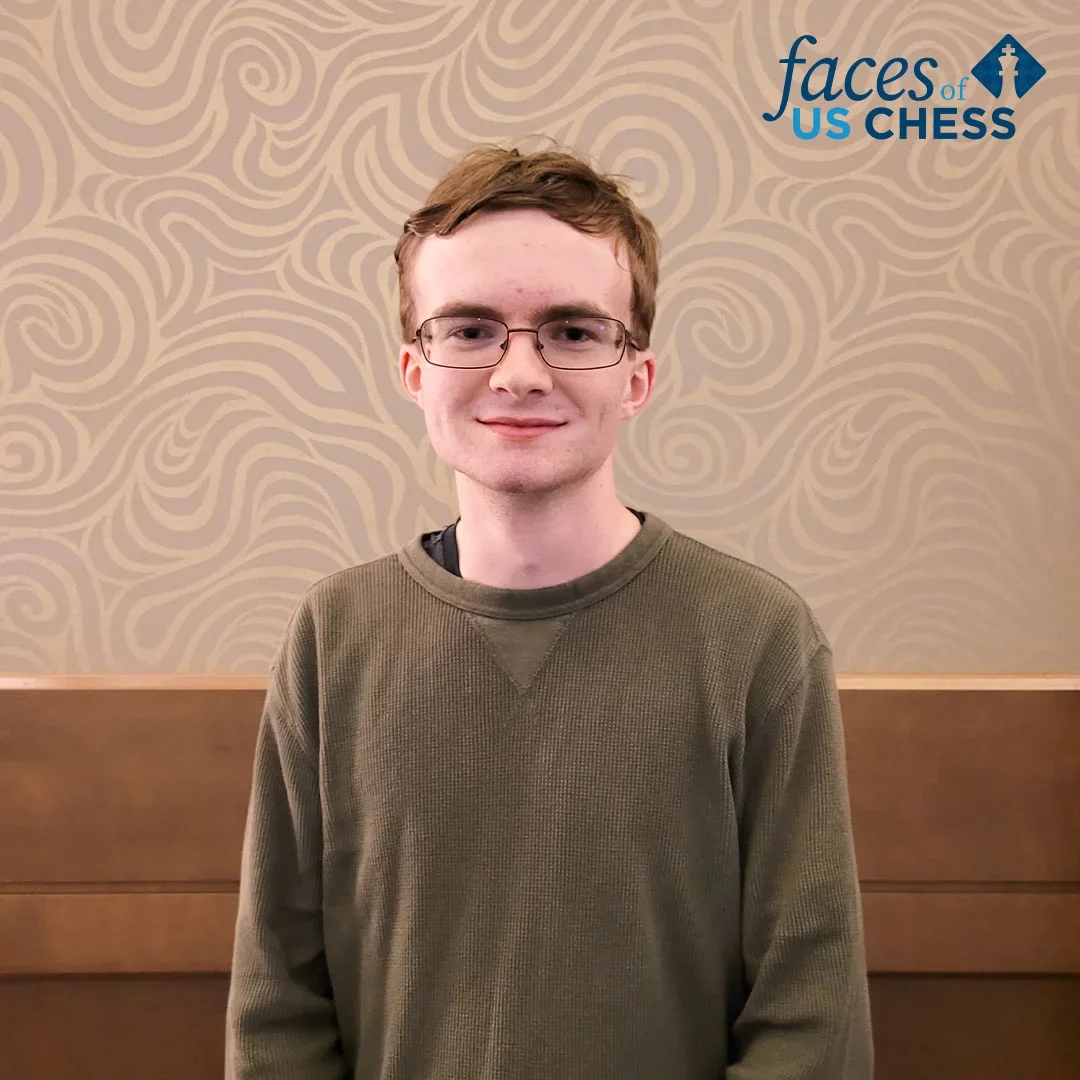
“I’m not part of a particular chess group. I just play chess all over the place. I enjoy jumping in and out of different groups. I like the joy of being inconsistent because I get to meet a lot of new people that way.
I’ve been in Jacksonville [Florida] about two years. We have two big chess groups here [at the 2023 National K-12 Grade Championships]. There’s the Chess for Charity group and then there’s the Jacksonville Chess Club group. And what’s neat is that I’ve had fun playing and TDing at both of those, so I know a lot of people already.
I started playing chess when I was seven or eight, somewhere around there. My dad taught my brother and they played a lot and I joined in on that. We all just went to the same events and the same chess clubs. We were in the Cleveland, Tennessee area for a short time, but most of my chess development happened at Christina Schweiss’ club in the Norfolk/Virginia Beach area [Hampton Roads Chess Association].
I really like coming to national events because it’s neat to see a room full of people you’ve never met before. That’s pretty cool compared to the local club events, where I sort of know most of the people. TDing has had a good bit to do with that. I’ve basically been the fill-in guy for all the clubs around. I help out, off and on, with all the clubs. Whenever there’s a fill-in need, I end up being that person.
Once I graduate, I might want to TD at a national tournament. It depends on what else I have going on, but it’s something I want to look at in the near future. But for now, I want to keep doing what I’m doing, just having a good time.”
- Jonathan Cagle
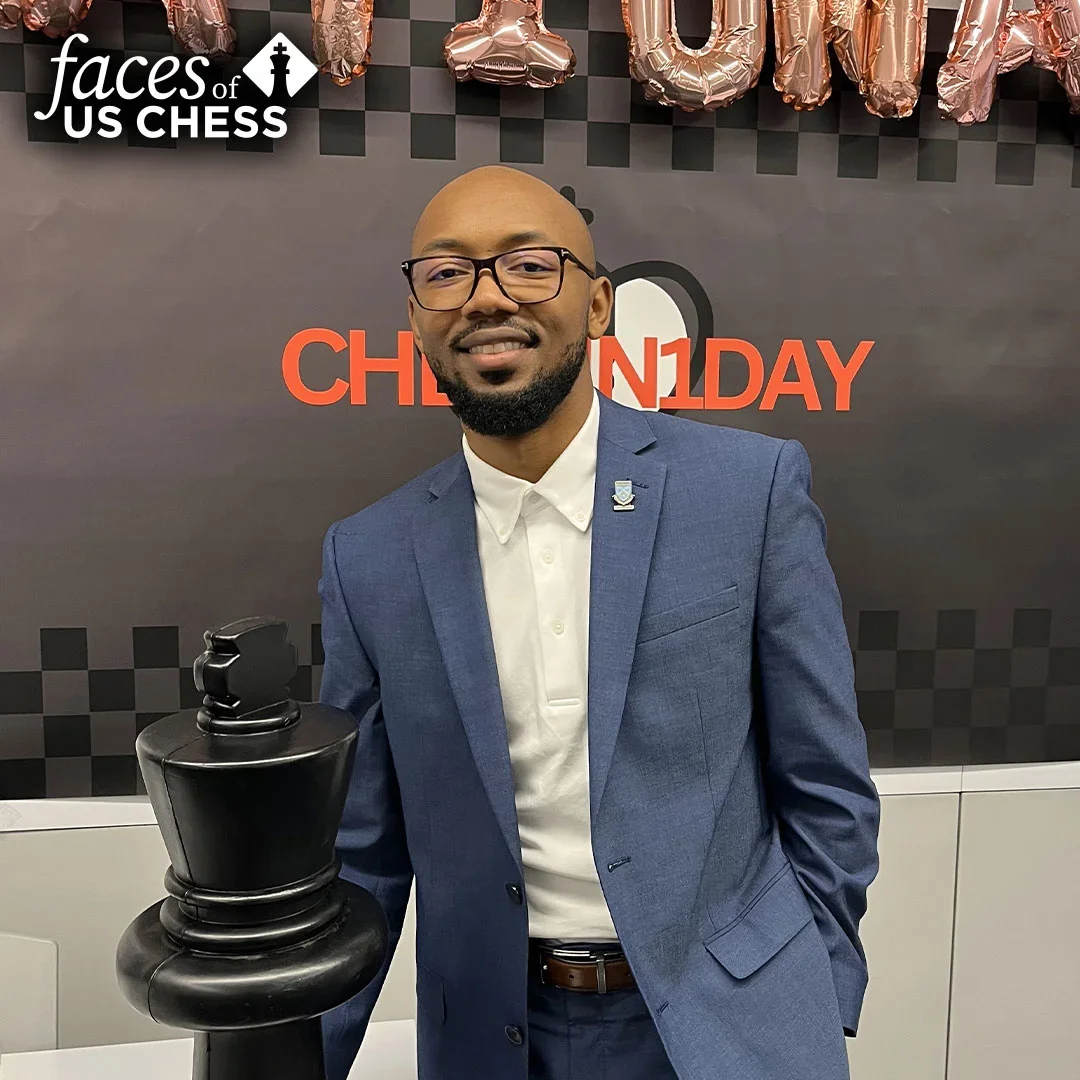
“About three years ago, when I was living in New Orleans, a couple of teachers at work and I were talking about going out for an adult beverage.
I said, “Hey, I have a chess board. Do you think this would be a good place to learn how to play?” One said, “Sure, bring it. I play chess.” So, she taught us how to set the board up and move the pieces.
From that point on, chess became a social activity that we tried to do once a week after work. It wasn't as consistent as I would have wanted, due to the nature of life. But it was memorable to be in a space that wasn’t a traditional spot for chessboards. To be able to listen to loud music while learning how to play chess —it was a wild experience. But that’s New Orleans — just a high energy place. Of course I made mistakes, but it was fun to learn in that moment and in that environment.
It taught me that you can find your place in the chess world at any age. I think about how inclusive the game is. Your background doesn’t matter. Your age, your physical abilities don’t matter. Anyone can play chess because it only requires you to use your mind. I really like that. It’s a game that never gets old.
Chess is essentially a series of problems that you’re trying to solve. There’s this connectedness, just like in mathematics. I tell my students all the time that problems exist because they’re meant to be solved. That’s why we call them problems, right?
And I feel you can learn a lot about a person when you play a game of chess with them. It allows you to understand how a person responds to a challenge. It's almost like dancing, because it involves these measured steps.
What keeps me hooked is the challenge. It’s like jazz, constantly evolving. I can feel the moves being made the more I play or the more I talk about it. I can just feel it. It’s beautiful. I don’t play chess enough to love it this much. But somehow, I love it this much.”
-Lorenzo Johnson, Jr.
This interview was conducted by Laurel Aronian, who hosted a chess class on National Chess Day. Photo by Bruce Gilbert
"During quarantine, my dad asked out of nowhere, “Do you wanna play chess?” I said, “Sure,” but I was really thinking, “This is for old people. I don’t want to play this.” But then I realized that chess is more than that. You have to think, you have to be confident to be close to winning.
Once school started back, I began going to the chess club there. And my chess coach Mr. Larson, who is just so great, pushed me to play more. Then last year I took off school early one day to go to the [National K-12 Grade Championships]. I wasn’t playing in the tournament, but I wanted to go to the Girls Club event. It was a memorable day because I got to meet so many new people. It was so exciting and so special.
But the coolest part of the whole thing is getting to be on the Chess Life cover. I came home from school a few months after the K-12s and my mom was so excited. She told me that Mr. Larson emailed to ask if the girl on the cover was me, and it was! Apparently, while I was at the Girls Club event the photographer snapped a few photos of me and my friend, and they ended up in the magazine! Now the magazine sits in the center of my other chess stuff, with my trophies and ribbons. I am going to remember it for the rest of my life. Once in a while, people ask me about the cover and I get to share the story. It is such a special memory. It really motivates me to work hard and keep playing. It’s made me more confident in myself.
A lot of people think that chess is competitive and you’re never going to be friends with the person you lost to. But you can. You have a connection after that. I’ve made connections with a lot of different people through chess, like Gabi. And Mr. Larson, my chess coach, of course.
Chess also pushes you to do better. When you lose, it makes you think, “What made me lose? What did I do wrong? What can I do better?” Because so many things can happen in chess."
-Sage Johnson
"My friend Sage told me about chess and then randomly the next year my mom signed me up. And then Sage and her dad started helping me learn how to play, how to set up the board and stuff, and that got me more confident. They also taught my younger brother, so I can play with him, too. After school I finish my homework, then I usually play Chess.com on my iPad. Or I play with Sage, either over the board or on Chess.com.
I like how you get to interact with your friends at the club, at home, and in between games at tournaments. I like how you can learn from chess. It’s good for your brain. Once you start learning how to memorize stuff, chess gets more and more fun because you’re doing this while interacting with friends. And you can go to competitions, too.
My first tournament was fun, but also a little hard. But it was mostly fun because I experienced something new. I was excited, but nervous at the same time. I like tournaments because they’re competitive. But even if you win or lose — either way, it’s most important that you have fun. You shouldn’t doubt yourself. The more you play, the more you can learn new things. If you make a mistake, you can learn from your mistake. So that makes me love going to tournaments.
I hope I get better and better and better. So many people say boys are better at chess. But there are women in chess who make girls feel confident about themselves — that they can play chess too. Girls can be just as good or even better than boys. So, girls should feel like they can play chess, that they can do whatever they want. You should feel confident about yourself, like you know you’re gonna win."
-Gabi Daniel
Sage was featured on the cover of the March 2023 Chess Life and was interviewed with Gabi soon after while attending events hosted by the Girls Club. Stop by the Girls Club at the next national event you attend.
Quan: We’re college students. We work for the National Scholastic Chess Foundation [NSCF] in South Florida.
Both: We’ve been playing chess for seven years.
Quintin: We got a chess set for Christmas in 2016 and taught ourselves how to play. In January 2017, we had a new eighth grade U.S. history teacher who taught the class how to play chess. He would set up tactics on the board for extra credit. He was, like, “Find like the mate in one, mate in two for extra credit.” We were solving them easily. He was impressed by how fast we solved those tactics and how we learned by ourselves.
At the end of the school year, he hosted a tournament and Quan ended up winning first place.
Quan: I was really happy.
When we got to high school, there wasn’t a chess club, so we were going to quit because we couldn’t find anywhere to play. And that’s when our grandmother said there was a club in the community, Lauderhill Chess Club.
So we went to the club and the first day we got there, we beat a lot of people. Everyone was surprised that we didn’t have a coach and that we just played casually.
Quintin: We were beating everyone that was coming to play us.
Quan: They’re like, “These guys are good. We have to give them some help.” So that’s when we started getting more involved in the chess community.
Quintin: We didn’t know anything about chess tournaments. Then we found out that the Sunrise Center [for Excellence in Chess] and the NSCF were hosting a tournament. But we showed up late, so we couldn’t play. So we went to the tournament the next month and we both tied for first, 4-0.
Quan: After that, we had a coach.
Quintin: Our first coach was Robert McKenzie. He was surprised to learn we had no formal coaching, because we were able to keep up with him. Not beat him, but keep up with him. So he told us about some programs where we could get coaching. Then we started getting really good, so Robert McLellan at NSCF got us some coaching by FM Ramon Lorente and sometimes by Sunil [Weeramantry] too.
One day I noticed the city was giving community improvement grants. Basically, they would fund an event as long as it brought the community together or it was good for the community. So I applied to host a chess tournament. I wasn’t sure it would work out because we weren’t certified to direct a chess tournament. But I got in touch with Robert McKenzie and asked if he could help us host this tournament.
A few days after that, the city called one of our coaches, Mourice Hylton, and asked if we were good with kids because we had applied to do a scholastic tournament. And he told them that we coach at some schools and we work around kids. So we landed a $2,000 grant because of Mo’s great reference.
We didn’t get the call from the city until September 9th, so we had two weeks to get the venue, get all the snacks, and everything else, because we had to hold the tournament before September 23rd, which was the last day for funding. So we did it on the 23rd. We had a great turnout because, right off the bat, we had 60 kids sign up within two days, because Robert McLellan put it on the NSCF website and it was selling out fast.
We wanted to host this tournament because we grew up in Lauderhill, which has a lot of at-risk youth. And chess helped us academically and become better with critical thinking and taught us financial literacy. We ended up getting into a good university because of chess.
So that’s why we started giving back to our community. We know what chess did for our lives, and we know what it can do in this community also.
Quan: Being twins has definitely impacted our growth in chess. When we first started out, I was much better than Quintin. So, he started studying. He was watching videos on YouTube, trying to catch up with me, and eventually became even better than me.
We kind of used that as, “Hey, I don’t want you to be better than me, I want us to be equal.” We kept going back and forth. Then we were equal for a while. That motivated us to continue to study chess and to improve. We used to watch chess videos when we got up in the morning, and because of that we were often late for school.
Quintin: We used to get up at four o’clock in the morning, watching chess. And then, because we had all of our credits by 10th grade, from 11th grade to 12th grade, we’d have a chess book, studying chess, in class. Because I was the best student in my calculus class and had the highest test scores, the teacher just let me do what I wanted. He said, “Okay, as long as he’s keeping an A in the class, he can study chess.”
Quan: And then we’d go to tournaments every week. I think we went to 35 tournaments in 2019. And those were all rated tournaments. We went to a few NSCF tournaments as well. Right now, I’m kind of busy with school but I still try to play at least one tournament a month.
Quintin: I’m just trying to get back into tournaments because I’ve been out for a while.
Quan: Currently my goal is to get to national master. I’m around 2000 right now. So, I’m studying and working to hit NM. And then when I hit NM, I’ll stop playing as much as I used to. And maybe do more coaching.
-Quan & Quintin Tanksley
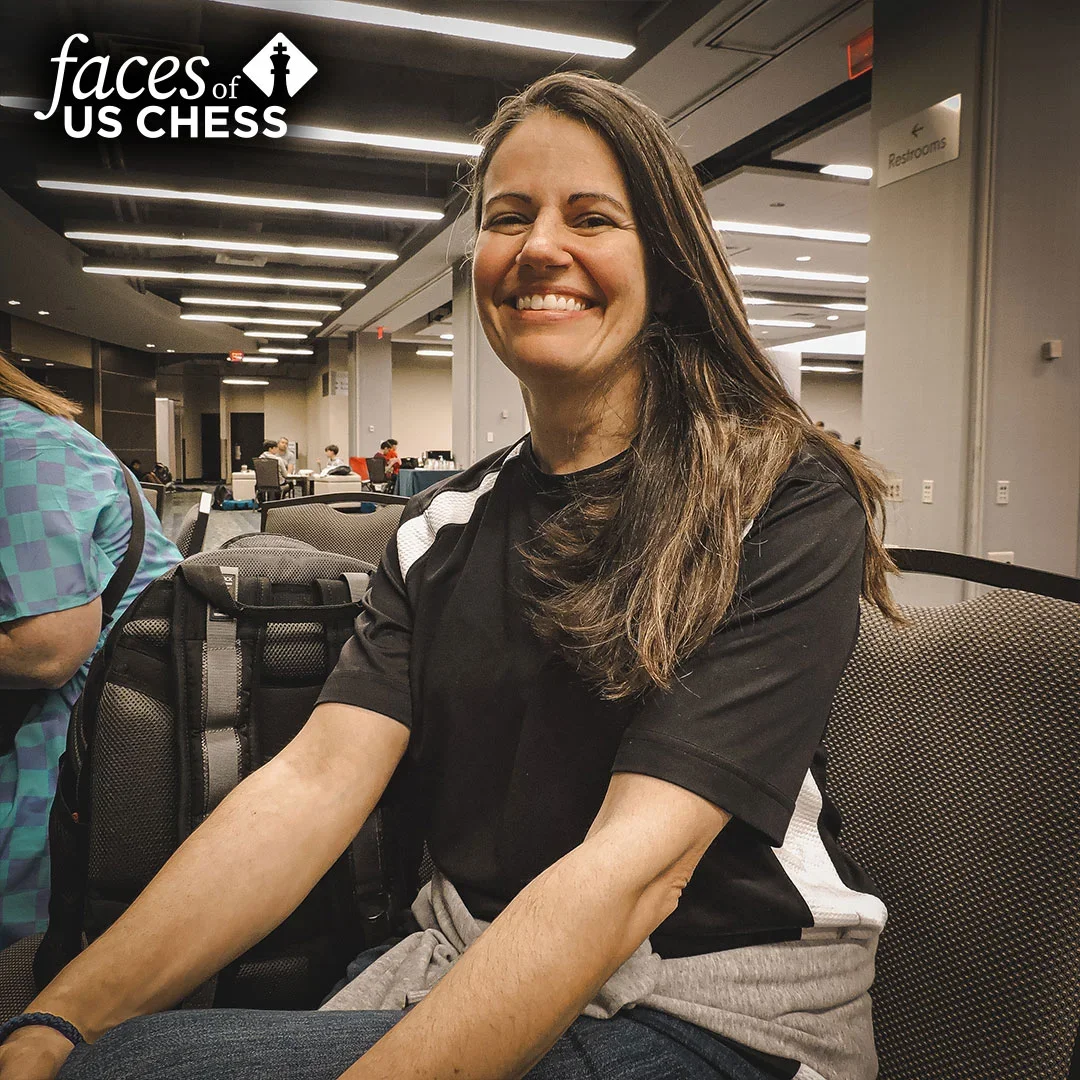
"I’ve been passionate about making sure that Baltimore City kids get the opportunity to play at national events because that’s not something that was happening, even though the [Baltimore Kids Chess League] has been around for a long time. The league overall has grown tremendously. We now have 58 schools in Baltimore City and these kids have been working really hard. So I applied for the US Chess Title I grant last year [2022] and received it. We took 20 students to the nationals in Memphis. This year, we received the grant again, and it helped us bring 45 kids to this nationals. We’re super excited that this tournament is close to home so we could bring more students.
I heard about the league back when I was a Baltimore City teacher saying “Yes” to everything. I had never really played chess up until that point, but I loved games and I loved math, so I said I would coach a team. I brought that team from not knowing chess to going to nationals. They came in 18th place in the under 800 section, which was really exciting for my first time as a coach and their first time playing. That just lit the fire under me. So I was a coach in the league for 15 years. And then three years ago, the Executive Director was retiring and asked me to take over the league. So, that’s how I’m in this new role.
I think the growth we’ve been able to achieve has been tremendous. And that’s what I feel most excited about, because a lot of these kids didn’t even know that tournaments like this were an option for them. So to be able to bring students to events like this and watch them interact with kids from all over the country — to just see that they’re a part of something bigger — is always what drives me to continue to make these things happen.
Most of our league runs on donations and grants. So I do a lot of grant writing locally for the students. We also take individual donations and foundation donations. And then US Chess instituted the Title I grants to help send kids to national events. So I’ve applied for that grant both last year and this year.
A few of our students have been interviewed by Dan [Lucas] at US Chess, so they’ve gotten opportunities to speak about what chess has meant to their lives and about the friendships they build while they’re here. I enjoyed hearing their interviews last year, but I’m going to share that I didn’t prep them for their interviews this year. So it was really exciting to me to learn that they are getting what I was hoping they were getting!
There’s so many life lessons in chess that can’t be taught quantitatively. For an organization like ours, which runs on funding, it’s sometimes hard to prove the benefits. A lot of foundations want us to show them data. We run into problems because we can’t collect that kind of data on students. Plus there are laws around what we’re allowed to collect. It puts us in a weird place when it comes to a lot of funding. So to hear the benefits coming directly from the kids — even though you can’t put these things on paper necessarily, chess is literally changing their lives.
One thing I personally struggle with at the league is that we lose a lot of our girls in middle school. I think it’s due to a lot of factors, like girls having to go home to take care of their siblings, so they don’t get to stay in the out of school programs. To help retain girls, I’ve advocated adding chess to the school curriculum, similar to what New York does. We’re piloting that this year, and I’m also trying to think of other creative ways to keep more females."
-Christina Soares
The Baltimore Kids Chess League received a Title I grant for 2024. Look for them at the National High School Championship in Baltimore.
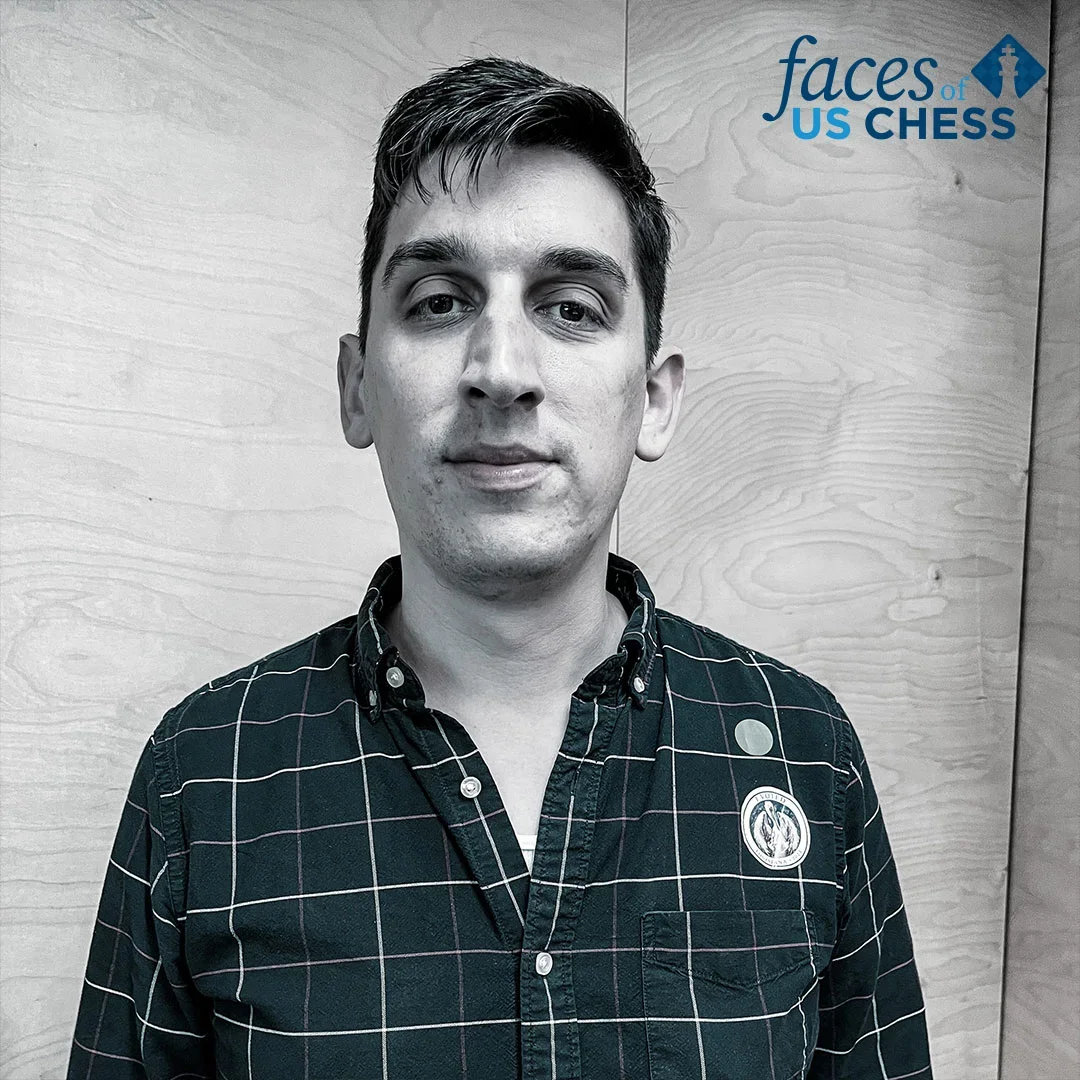
"I’m the president and founder of Downriver Chess Club. We’ve been meeting twice a week in the French Quarter in New Orleans for going on seven years now. We’re the most active club in the state of Louisiana and we’re among the top 10 most active in the country.
I don’t remember learning how to play chess, but it’s always been something that I treat almost like a second language, in that you can play chess with anyone as long as they know how to play chess, too.
Your culture, your background, your spoken language — none of it matters, because people of all abilities, verbal and non-verbal, play chess. And I stuck with it because it’s a good way to meet people, especially when you move to a new place.
When I moved to New Orleans, I met the whole chess community pretty much as soon as I landed because I knew how to play chess and I liked hanging around other chess players. The community here is diverse, and I mean that in a very big sense of the word.
It’s all ages, from maybe seven years old to 90 years old. It’s different religious backgrounds, races, genders. It’s also a very engaged, interesting community, especially around politics. You’ll always hear lots of arguments about politics or culture or what have you.
I think this kind of diversity is specific to New Orleans. In a multicultural city such as New Orleans, it kind of comes with the territory.
-Andrew Squitiro, interviewed by Mikey Sison of the Tulane Chess Club.
Natasha: How long have you been playing chess?
Olivia: Two years.
Harry: Two years.
Natasha: And how old are you?
Olivia: Six.
Natasha: How did they get started?
Dad: Their older brother played chess. Their school [Oak Hall in Gainesville, Florida] has a strong chess program. So when the kids were in junior kindergarten, they started doing chess as part of the curriculum there.
Natasha: Why do you like playing chess?
Olivia: Because it’s fun.
Harry: Because you might beat other big people.
Natasha: Do you play chess together a lot? Do you play with Dad too?
Dad: They do. And they beat Dad.
Natasha: Oh wow. When you guys play together, who usually wins?
Olivia: I used to be able to win. But now he’s winning, too. Most of the time.
Harry: I’m crushing her!
Natasha: And you go to a chess club at school. What’s your favorite part about chess club?
Harry: Beating people’s heads off!
Natasha: And is this your first big tournament. What do you like about playing at big tournaments?
Olivia: It’s good. I’m nervous.
Harry: You get to play new people and maybe win!
Natasha: How much time do you spend on chess each day?
Harry: Like, three hours a day. I play until 10 o’clock at night. I play games online.
Dad: They just love to play. They go straight from their half hour after school chess into chess club. They’re in chess club from like three o’clock to six o’clock, four or five nights a week. Then they come home and want to play online some too.
Natasha: Do you have any goals?
Harry: Winning!
Olivia: Winning!
Natasha: I’m not sure I have any more questions. What do you think I should ask?
Harry: Are you a good chess player?
Natasha: Are you a good chess player?
Harry: YES!
Natasha: What’s your favorite opening?
Harry: Scotch. No, the four-move checkmate.
Natasha: Do you have a favorite chess player?
Olivia and Harry in unison: Bobby Fischer!!
Natasha: Why do you like Bobby Fischer?
Harry: Because he is a very good chess player.
Natasha: Do you want me to leave you alone so you can eat your ice cream?
Harry: Yes.
Dad: Maybe ice cream wasn’t the best of ideas!
- Olivia and Harry McLellan
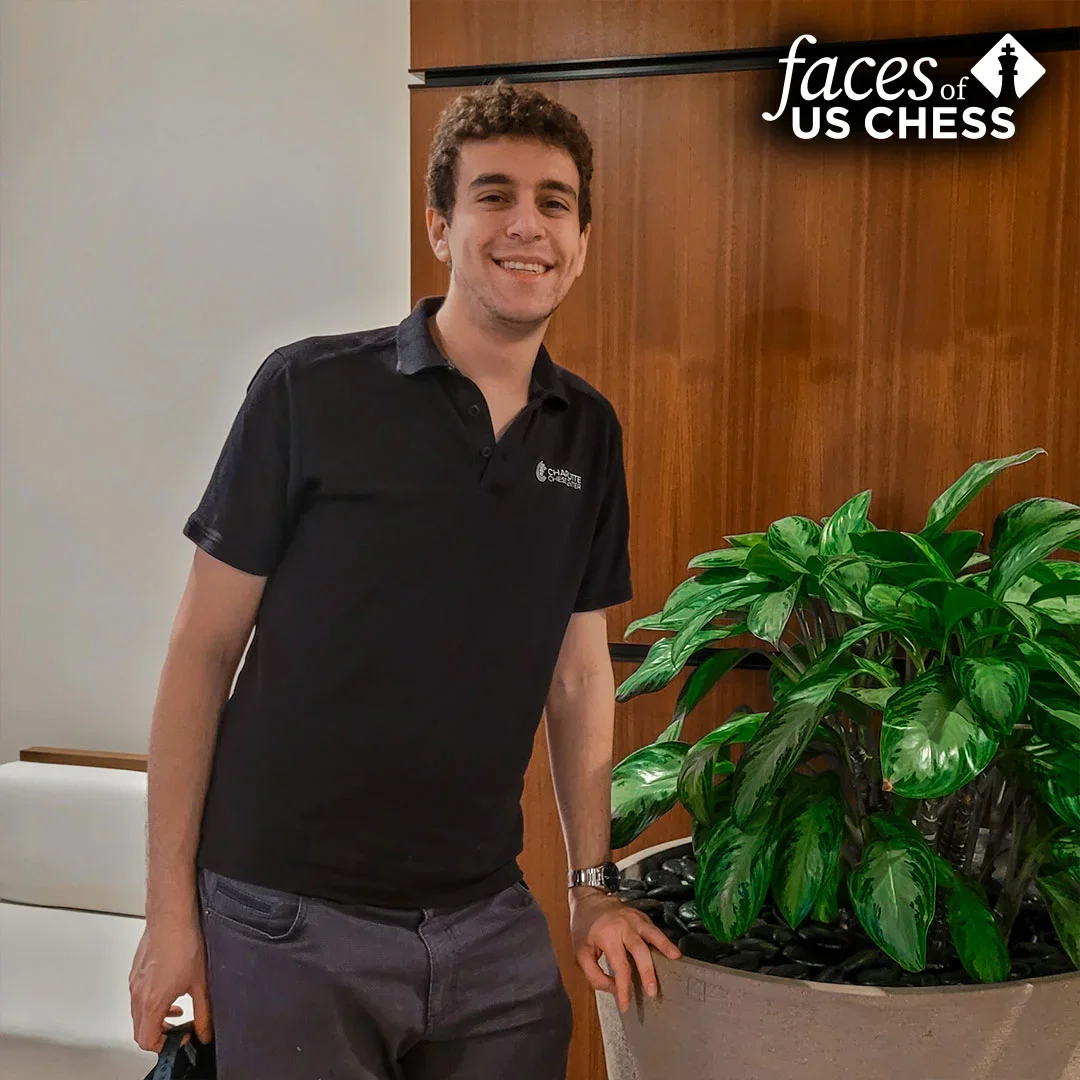
"I’m here [at the National K-12 Grade Championship] with the Charlotte Chess Center. I’m coaching alongside Peter Giannatos, who’s my close friend and the Charlotte Chess Center founder. We’ve got about 50 or so kids from the center playing across the various grade levels.
I love the environment at these tournaments. It reminds me of when I used to play in them. So I do my best to be a positive presence for all the kids.
I’m really excited about scholastic chess in Charlotte, which is on the rise. I love teaching in general. I live vicariously through my students. It almost feels like I’m playing when I watch them in tournaments. I’m most passionate about bringing up talented players, seeing them grow, and giving them as much information and support as I possibly can. So that’s been my baseline motivating factor ever since I moved to Charlotte in 2020.
I don’t think chess is a panacea or it’ll win people the Nobel Prize. But I do see how chess impacts maturity level, especially in younger kids. I don’t think it’s a coincidence that a lot of younger chess-playing kids have some of the best vocabularies or behaviors, because those are the qualities you need in order to succeed in chess at a young age.
Chess requires a tremendous amount of patience. I mean, what 10-year-olds have the patience to sit for five, six hours? Chess-playing kids. That’s why I disagree with the train of thought that chess will raise your score on a math test directly. I think it improves human qualities — maturity, general behavior, class, the ability to lose with grace and win with grace.
While everybody likes to say that they know how to deal with losses and adversity, chess actually teaches you how to handle those negative emotions and turn them into positive motivational energy in a very concrete way. Those are skills that stay with these kids for their entire lives and help them in college and beyond. I truly believe that.
I am proud of some of my tournament accomplishments, like winning the World Championship Under 12 in 2007 in Turkey. I’ve written a couple of chess books and I’m proud of the chess career that I’ve built around commentary. I have a YouTube channel that I’ve been developing over the last couple of years. Of course, becoming a grandmaster is probably my proudest single chess accomplishment.
But I’m also happy that I was able to balance chess and school when I was growing up. I took difficult courses in school. I played basketball in 10th grade. I went to college. I always kept chess in the mix when I was juggling school and other extracurriculars. But looking back, I have zero regrets that I also went to school and had other activities. I think it helped round me out as a person.
I also have non-chess friends, whereas some chess players can be a little bit closed off in their circles. Nothing wrong with that. But I’m proud that I was able to further my chess career while keeping it secondary to academics and just trying to become a regular human being.
To circle back to what we were talking about earlier, my point is that chess helps develop other skills. Chess development is very interconnected with the ability to concentrate and the ability to listen, particularly to your chess coach. So, part of chess growth is inextricably linked to concentration, behavior, and level of maturity.
Chess really helped me. Obviously, it’s given me my career, it’s given me my livelihood. And it’s put me in an amazing position that I’m very grateful for. I get to impact so many lives and so many young kids and help their development. Seeing that transformation happening is what gets me out of bed every morning."
-Daniel Naroditsky
“I grew up around music and chess. Both have been parallel lines in my life that are present to this day. My father, who is a classical and opera singer, taught me chess when I was four. He also inspired me to sing, since he always rehearsed at home. I feel that I was meant to be immersed in various endeavors and not just dedicate my life to only one passion or hobby.
I was born in Moscow, Russia, where I began attending the Petrosian Chess Club at age five. I was the only girl there. I remember one sweet moment: after having done well in the tournament, my coach gave me a toy car... and I was a bit disappointed and asked: “Next time can you please give dolls?"
When I came to U.S., I began competing in tournaments. Chess was my life. I played almost every weekend at the Marshall Chess Club, and had a beautiful inner circle of friends, like GM Irina Krush and WIM Elina Cotler and GM Dmitri Schneider. At some point I was invited to the World Youth Championship in Paris, France. Another special moment was when I won the New York State high school championship and was invited to the Denker tournament in Hawaii, where again I was the only girl.
There were many magical moments in my chess playing years, but I stopped playing tournaments when I was 17. I was finishing high school and wanted to experience life as a “normal” teenager. Later I began to pursue my lifelong passion of being a singer and started performing and collaborating with musicians in the jazz and pop scenes of New York City. Just a few years ago I was so honored to have released a jazzfusion album, “Awake! Arise! Songs of Sri Chinmoy,” with multi-Grammy award winning musicians.
Another heartfelt, full-circle experience was when Beatriz Marinello invited me to perform at the holiday party in the Marshall Chess Club in 2023 and again in 2024. It was truly fulfilling combining these two prominent worlds of mine, music and chess.
Soon after quitting playing chess in competitions, I went into teaching chess, working for Chess in the Schools. I’ve grown to love my job working with kids and inspiring them to be their best in life. It has become part of my life’s mission.
When I’m teaching chess to children, my goal is to use the game as a tool to channel some deeper human qualities to them. Whether it be support, a boost in confidence, compassion, or hope — I try to give them whatever they need, something more than chess. I try to encourage them to believe in themselves and in the fact that they have choices they can make in life for a brighter future.
The further I go with teaching, the more rewarding it becomes. I feel like I am moving deeper into connecting with my students and being there for them as a life mentor.
Sometimes we switch roles. They become the teacher and I become the student. We’re playing games, making it fun, but we all learn something. I learn a lot from them. Every day.
I also used to direct scholastic chess tournaments. Now, after a long break, I'm back into it again. It’s a nice experience to reconnect with my old friends and meet new ones. This K-12 Grade Nationals in Orlando, Florida, has been nothing but pure joy. It's like a big festival of celebration where people are connecting to something higher and greater than themselves. Parents, kids, coaches, tournament directors, spectators — all are becoming a part of one whole, and together, we are celebrating this incredible game of profound wisdom and fascinating sport. It feels like happiness is just in the air here... I think that is something that everyone can be grateful for.”
-Lily (Laila) Faerman
"My father, Burt Lerner, only became interested in chess because he had a child — me — who was very, very, very much into it. I got interested in chess because of the Fischer-Spassky championship when I was seven years old. So my father started taking me to chess clubs and tournaments near our home in suburban New York City. I got very active and played every weekend in tournaments for many years. My father had to hang around tournaments to keep an eye on me because I was too young to be left alone. But then he became, in his own right, an important figure in the chess world.
I want to talk a bit about that, because my father, back in the 70s and 80s, became one of the most prominent chess volunteers in the country, and that’s far more special than a rating.
Once he started meeting the chess community in New York, my father made a lot of connections. One of them was a prominent figure, John W. Collins — Jack Collins — who was Bobby Fischer’s chess teacher. Jack was probably the best-known chess teacher in the 20th century in the United States.
So my father teamed up with Jack and they started Collins Kids Inc. Jack was president. My father was vice president. They began arranging events for children that eventually connected different cultures and countries from around the world. Collins Kids teams would travel to Iceland or Israel to play chess. Then those country’s teams would come to New York and play the best juniors in the US.
Even though Jack was the face of the Collins Kids organization, it was my father who administered that organization. Jack had a lot of physical limitations and didn’t make much money as a chess teacher, so Collins Kids relied on my father, and other volunteers over the years, for organizing events and financial support. My father did whatever it took to move the organization forward, but he did so from the background.
Another part of my father’s story was the American Chess Foundation (ACF). It was the country’s largest chess nonprofit and supported the top chess players in the US. My father was on the Board and was its treasurer.
Because Jack was proud and wouldn’t take money from my father directly, my father would give money to the ACF and then they would send that money to Jack every month. And so it was my father who supported Jack for 20 years through the ACF.
Over the years, the ACF changed its mission to support children, and my father helped with that transition. Today it is known as Chess in the Schools. And now I am proud to continue my father’s youth chess legacy as a board member for Chess in the Schools.
There are so many people in the chess community who either give their time for no compensation or they work for very low wages. And I feel like I owe a big debt to that community, because I literally played every weekend for many years as a child, and a lot of events were organized by volunteers. So through Chess in the Schools, I created the Lerner Award to recognize volunteers. This year we will give over $25,000 to outstanding chess volunteers or modestly compensated chess professionals across the US. So that’s me paying it forward, if you will, to a community that made a big impact in my life.
My father always wanted to be behind the scenes. It was only because of my prompting that US Chess renamed the National Elementary School Championship to the Burt Lerner National Elementary School Championship from 2005 through 2010, to honor my father. Joel Benjamin won the elementary championship the first year it existed, and I won the title the second year. So it was an important event in my life.
My father wasn’t out there throwing his name around. He never wanted to get anything out of it for himself. And the same goes for my mother, Judy Cooper, who was also a chess volunteer and took care of my younger siblings when my father and I were at tournaments. But since I’m their son, I get to brag about them."
-Andy Lerner
In honor of Burt Lerner (b. Feb. 17, 1930, d. Apr. 11, 2017). Learn more about Burt Lerner’s legacy here.
Dominic: My name is Dominic Johnson, a/k/a The Kid. I gotta say that. Every time. I got the nickname after I played Nakamura, like, a couple of years ago in Detroit. The video got something like seven million views on YouTube…
Bryan: …because he [Dominic] displayed his smack talk on that one. And Nakamura answered the smack talking. If you had to pick a grandmaster who was a smack talker, I think you would pick Nakamura. It’s a skill to smack talk. You have to talk in a way where the other person’s not offended.
We’re actually part owners of a company called Smack Talk Chess. It’s a chess platform where two people play 12 games and talk smack to each other while playing. It has nothing to do with rating. Two 800 players can be playing each other as long as they’re entertaining and talking smack and being themselves. They can be boisterous and loud and excited and celebrating and having fun. There’s some colorful language, so the content is for adults only. And there’s a crowd that can talk and cheer.
Dominic is the face of Smack Talk Chess. He’s the one who gets the players together and commentates on the game. I’m behind the scenes with the cameras making sure everything runs right. We also have a third member who’s the promoter. He gets the drama going. You have to get the drama right so the two people want to play each other and talk smack.
Dominic: Beyond Smack Talk, chess is a passion for me. I can say it is almost an addiction. I play on the phone every day, all the time. But competitively, I don’t play that often. I coach kids in Detroit, in the DCCC [Detroit City Chess Club].
Bryan: I also coach kids. I like to see kids go from zero to whatever rating they can go to and see their joy from getting over that mountain top, that hard thing. I like to challenge kids to go toward what’s hard. I also have my own chess training company. I have employees that I send to a bunch of schools and programs and I privately train students as well. So yeah, I coach everywhere.
Dominic: I’ve got this thing in me that doesn’t like losing. After I learned how to play as a kid, I was, like, this game is boring. But I saw my school had a little team and I was, like, I can play this. And I got beat. I never forgot that feeling of losing without being able to do anything about it. So I got better. Until I beat all of them. And then I met some other people and I said, “I gotta beat all of them.” So that ambition just took over. And now I think it’s important for everybody to learn chess because it’s an eye-opener. It opens your mind another level.
Bryan: My goal is to make sure that every county [in Michigan] has some type of chess program in their schools. And we would have a tournament in each county, and the winner of each county would play the winners from the other counties. And then we’d pay for the top three schools of those winners — whether it’s primary, elementary, middle school, high school — to go to the Nationals.
We already have that in Detroit. It’s called the Metro Scholastic Chess League, and they have a foundation that pays for kids to go to the Nationals. Kevin Fite was instrumental in setting it up. Kevin Fite runs the Detroit City Chess Club, and he’s the reason why I coach in the first place.
I want to replicate that all over the state of Michigan.
Dominic: We feel like we’ve got a lot more growing to do. There’s so much we can continue to grow. But there’s always work to be done.
- Bryan Wilson and Dominic Johnson
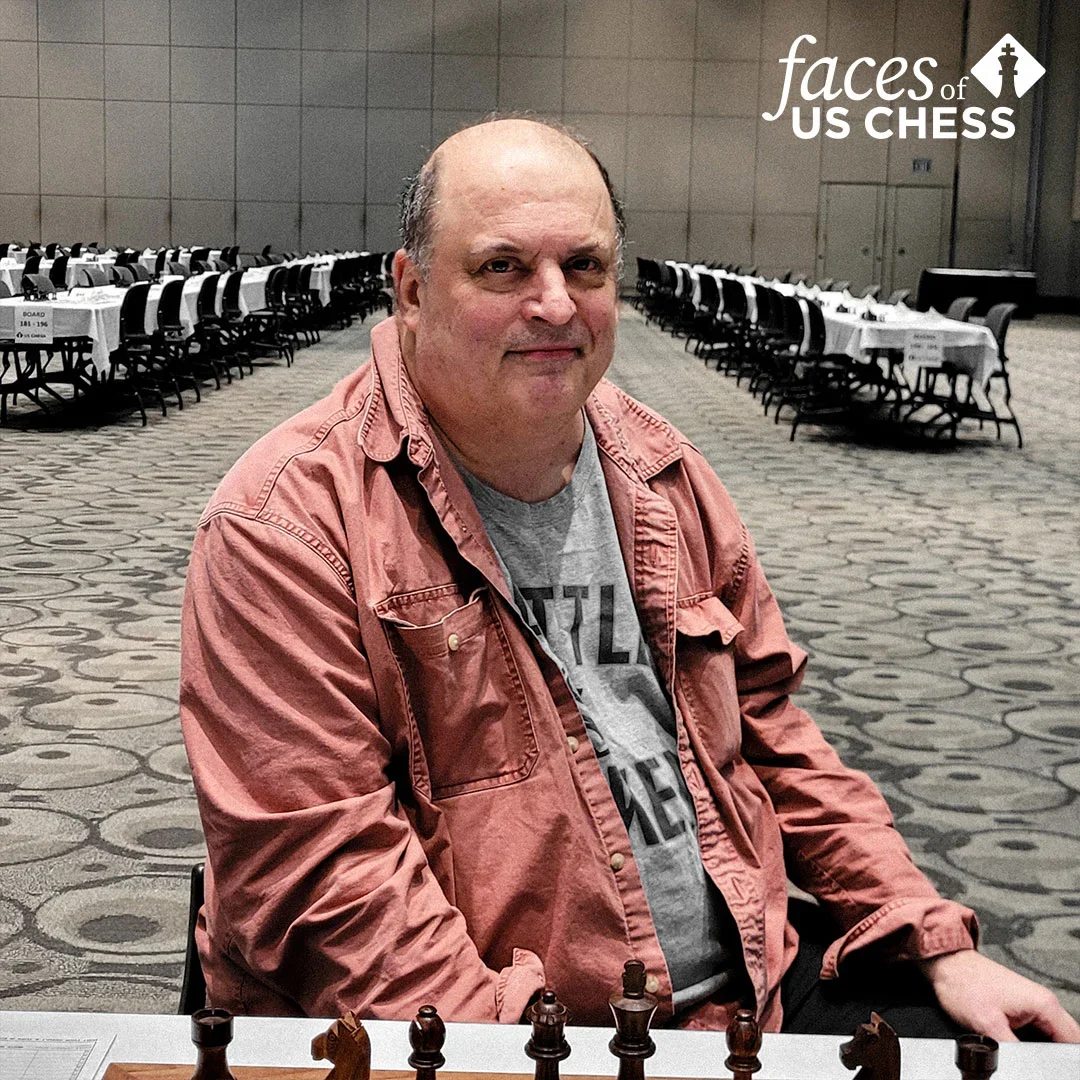
"I’m from New York City. From the Bronx, actually. I have not played chess as long as some people — I started when I was 15, so that’s considered late nowadays. I teach chess at a school in New York, and I teach little kids. Some of them start when they’re, like, four or five, which seems a bit young, but it’s actually good, because by the time they’re six or seven, they’re strong players already. It’s kind of amazing.
People think chess players are a bunch of nerds. They don’t realize how hard it is. But playing chess helps people learn how to be by themselves. When you play chess, it’s just you. You’re all by yourself. You learn how to lose and learn how to win, and you learn how to compete, how to do a competition. Not by being on a team, but by being yourself. And when a little kid plays, some people can’t play them because losing bothers them too much. Some of these little kids are so tough.
Chess allowed me to travel a lot. I lived in Europe. I lived in Barcelona. I lived in London. I lived all over the place. I had some foreign girlfriends. That was fun! I enjoyed traveling and playing in these tournaments.
And now, I don’t have to win the tournament or anything. There’s no pressure. So it’s fun to go somewhere and just play. I mean, the traveling, the playing, meeting a lot of nice people, and, you know, hanging out, drinking some beers and whatnot — it’s a social thing, too. I see a lot of people at these tournaments that I haven’t seen in a long time, and it’s fun.
When you’re teaching chess every day of the week, it’s not easy to go play in a tournament. So I mostly play during the summer. I do my best, but I don’t worry about winning the prizes and such. I just go there and play. I’m just happy to play."
-GM John Fedorowicz
"This is my first time being a chess control manager. And coming into this tournament, I was a little nervous. I shouldn’t even say a little nervous. I was nervous. This is my fourth or fifth time in chess control. Before the pandemic I was on the floor. But I love being in chess control because I get to see more people.
For me, nothing is hard when working chess control because I love the community. And talking to parents is my forte because I'm a preschool teacher, too. I have a comfort zone in handling the parents.
The most common question I get is when the round starts. Sometimes a child will play the first round and they will not even turn up for the second and third. Then the next day the parents will come and ask why their child is not in the tournament. The other question I get a lot is about byes. This is a very common one.
I’m from India and I used to play chess there, but I didn’t have many opportunities. So when my grandson went to kindergarten and said, “We have a chess club,” inside I was jumping. I didn’t want to force my thoughts onto him, though. I just asked if he was going to join, and he said he wanted to do it. The first tournament I took him to, his first national, was in Atlanta. That's how I got into it. Then I began volunteering in the chess club. I also used to volunteer in the K-1 section at nationals, taking the children to the bathroom and to the parents and all these things. That’s what I did when my grandson was playing. And then I earned my club TD level and then I became a TD.
That’s how it started. My grandson is now in his second year in college. And I’m still here."
- Usha Raghavan
"I started playing chess in 2006. I was 11 years old. It was a boring summer day and my best friend at the time was, like, “Hey, I have this board game. You want to check it out?” After he explained the rules, I remember playing the first game or two and instantly falling in love.
I was the type of kid who wanted to keep pushing myself. I liked that chess was easy to learn, but I could tell that it was difficult to master. Chess felt fresh every time I played it; I felt like I was always learning something new.
When I started middle school that fall, I was originally interested in playing basketball, but the school policy was that sixth graders could not participate in certain sports. They wanted you to get acclimated to middle school. But chess was available. So I was, like, “OK, cool. Let's do this.” And I never looked back. I didn't play any other sports. I just stuck with chess competitively.
Now I’m starting on a new journey with US Chess. For the last two years, I’ve been working with a nonprofit organization in Columbus, Ohio called The Royal Oak Initiative. The lead director, Ernest Levert, Jr., had been in contact with the leadership at US Chess and they mentioned that this position was available. He thought I would be a good candidate for it and encouraged me to apply.
What was fascinating about the timing is that I felt super, super prepared for this position because of everything I'd been doing leading up to applying. I just got my master’s in educational psychology in May 2023. So I was really focused on different approaches to thinking – the best way to help a student learn or how people develop their brains. I also have some experience doing DEI (Diversion, Equity, Inclusion) work. Honestly, I couldn't have written a better job description.
The Royal Oak Initiative focuses on spreading chess wherever they can. It originally started off as a financial literacy program that developed into using chess as a form of wellness. Basically, we use chess to help people get well holistically – mentally, spiritually, even physically. We’ve done some different programs involving chess and calisthenics or chess and rock climbing. We have chess and coffee. We’ve done chess and boxing and chess and yoga. We look at how your brain reacts to doing these different activities and then we transition over to playing a chess game. How will you keep yourself in balance?
My role with The Royal Oak Initiative is mainly as a professional chess coach and program coordinator. I look at the different initiatives that we’re trying to execute and then work closely with Ernest to bring them to life. One of our big initiatives last year was to take a group of students to the Cleveland Public Library, which has the world’s largest chess collection. We used chess and culture to show different perspectives about chess and how it’s such a global phenomenon.
The initiative that touched near to my heart was doing a 20-player simul with Grandmaster Maurice Ashley. He came as a special guest for International Chess Day and gave a speech. What made the simul memorable for me was that once Maurice felt he had a significant advantage in a game, he trusted me to come in and finish it. So out of the 20 games, I believe I finished seven of them, and together we did not lose a game or draw any of our games.
It was surreal because I remember going to his workshops at the K-12 nationals and talking to him as a 13-year old and getting his perspective on chess. Fast forward, and now I'm an adult standing next to him, making moves alongside him. I thought that that was really powerful.
I believe chess is the great equalizer. Regardless of your background, your age, ethnicity, race, creed, any of those things – as long as you have the cognitive functioning and the discipline to learn chess and apply it, you have the opportunity to be great. It really comes down to just how great you want to be and how far you want to push it.
When I was offered this job, I was extremely elated at first, but then I had to take a moment to pause – like, “Wow, this is really happening.” All of my chess memories up to this point came flooding in. It was amazing to realize I can actually make a living with chess. But more importantly, I can really spread the joy and knowledge that I’ve learned from chess. I already felt rewarded with independent coaching or working with nonprofits or school districts. And now I can continue to do this with US Chess, but on a larger scale.
My main focus in this position is on minorities, women, and senior citizens. I want to ensure their accessibility and involvement in chess. My hope is to find innovative ways to make a really large impact. For example, with senior citizens, I'm interested in what chess can do for individuals who might have Alzheimer’s and dementia.
As for The Royal Oak Initiative, in the words of Ernest, he knows my wings are spreading, and that I’m flying. And if you were to ask him, he would tell you that he’s the one pushing me out of the nest, to be honest. My love and involvement will always be with The Royal Oak Initiative. It’s just that my capacity is going to change a little bit. This work is near and dear to my heart, and it feels so wonderful to be making a difference."

“My son is playing in the U.S. Open. It’s his first tournament ever.
He started out playing chess kind of leisurely, but about eight months ago, I downloaded Chess.com and then he started playing aggressively on Chess.com.
It’s been a positive mental activity for him. He’s very social and it’s allowed him to branch out. He’s joined our local community’s chess club and goes there weekly. And it’s allowed him to interact in a positive way with the other family members who play chess with him. He has two younger brothers who play chess with him off and on. And I play with him a little bit.
I’ve played chess since I was a kid. I used to play chess with my dad. It was something fun that we did together. So I passed that on to my own son. But he’s gone way above and beyond my knowledge and skill of chess. He’s far better than I am. It's been fun to see him grow like that, because before it used to be something like, “Oh, dad’s just going to beat me in chess.” And now, I'm lucky if I beat him. It’s been fun to see his intellectual growth.
He started going to the chess club a couple of months ago. He did all of his own research and found the club. Just told me where to drive him. This particular chess club has 40+ members and a variety of ages. There are elementary and middle school kids there, but there are also retirees. I think a good growing point for him was playing chess at the club. There is definitely a different feel between playing chess on Chess.com and playing chess in real life. And so playing at the chess club allows him the experience of having another person sitting across from him.
He actually found this tournament on his own, too. We didn't push him to do this. He chose to do it. He worked and paid for his entry fee out of his own money, joined US Chess and everything, all on his own. So I’m excited for him. It doesn’t matter to me if he wins or loses. I just hope he has a good time.
And I hope I can one day be as good as my son. Just this morning I watched another instructional video. To try, maybe, to get as good as he is one day.”
-Michael Kozminski
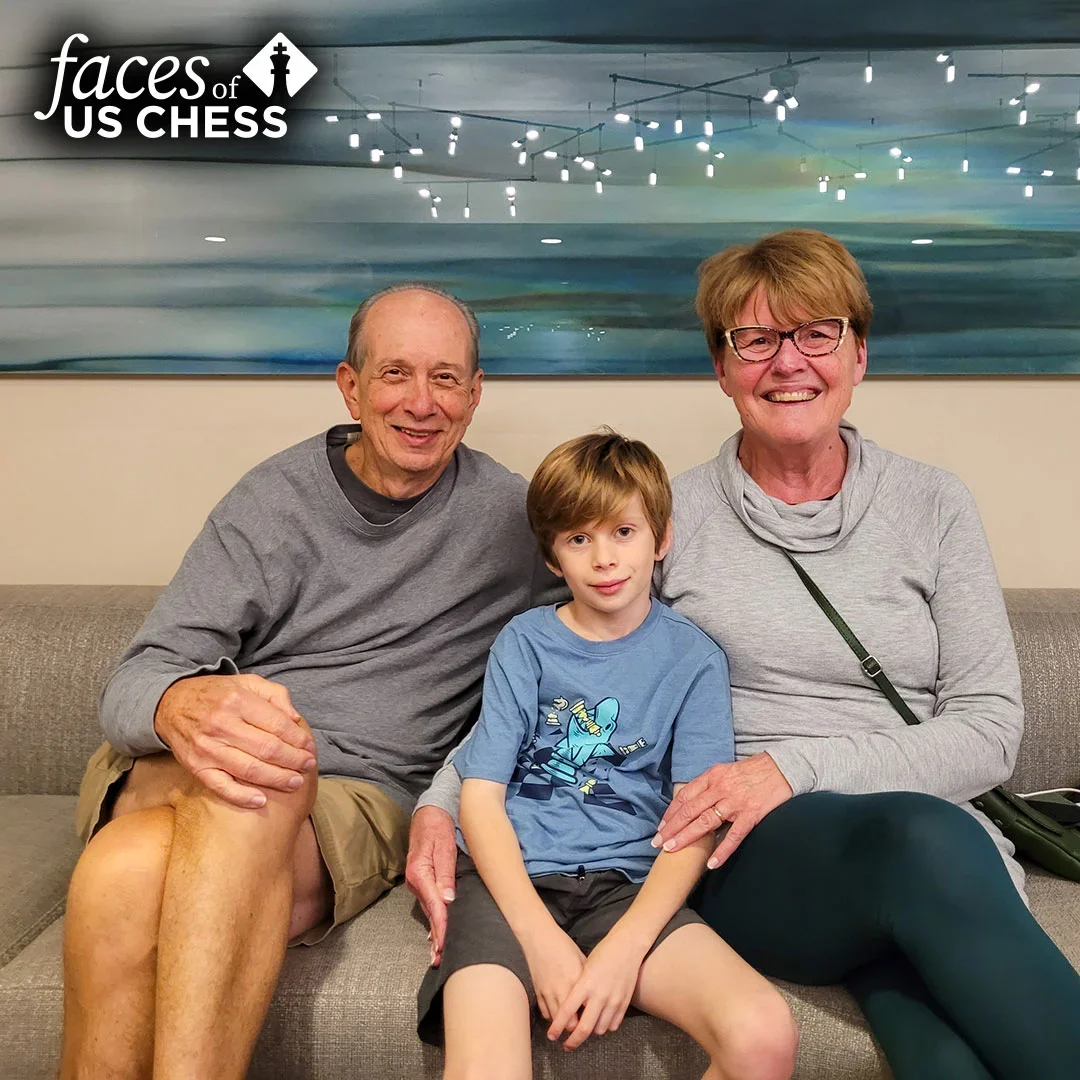
Mary: Chess is a very big part of Asher’s life. We’re Asher’s grandparents. We all came from Raleigh, North Carolina, for the tournament. Asher also has a sister here. She’s in the girls club right now.
Asher: I was three when I started playing. First my sister started learning, but she thought it was too hard and gave up. She’s older than me; she’s in the fourth grade. Then she and my dad started teaching it to me. And now I play at least two hours every day. I go to the Kings and Queens Academy. And I have gone to a bunch of tournaments and had a lot of good ones.
Mary: How about the one up in Baltimore? You got to go on stage and take first place. Remember that? I think one of the things you love most about chess tournaments is that you get together with all your friends from all over the country, isn't it?
Asher: Yeah. I have four friends at this tournament. One of them is standing right there.
Mary: Four friends not from home, right? From New York, Arizona, and places like that.
Asher: Yeah.
John: He’s really a talented player. For instance, didn’t you win the last tournament here? This one, two years ago.
Asher: Wait, what? Two years ago?
Mary: He’s going to correct you. I think he came in third here at that time. He won this spring at the K-6. It’s wonderful to see your grandchildren excel in anything, whether it’s sports or these kinds of things or academics. We just like to support them in whatever they’re excited about doing in their life. We are excited about it for them.
-Asher Kirschbaum, Mary and John Cantando
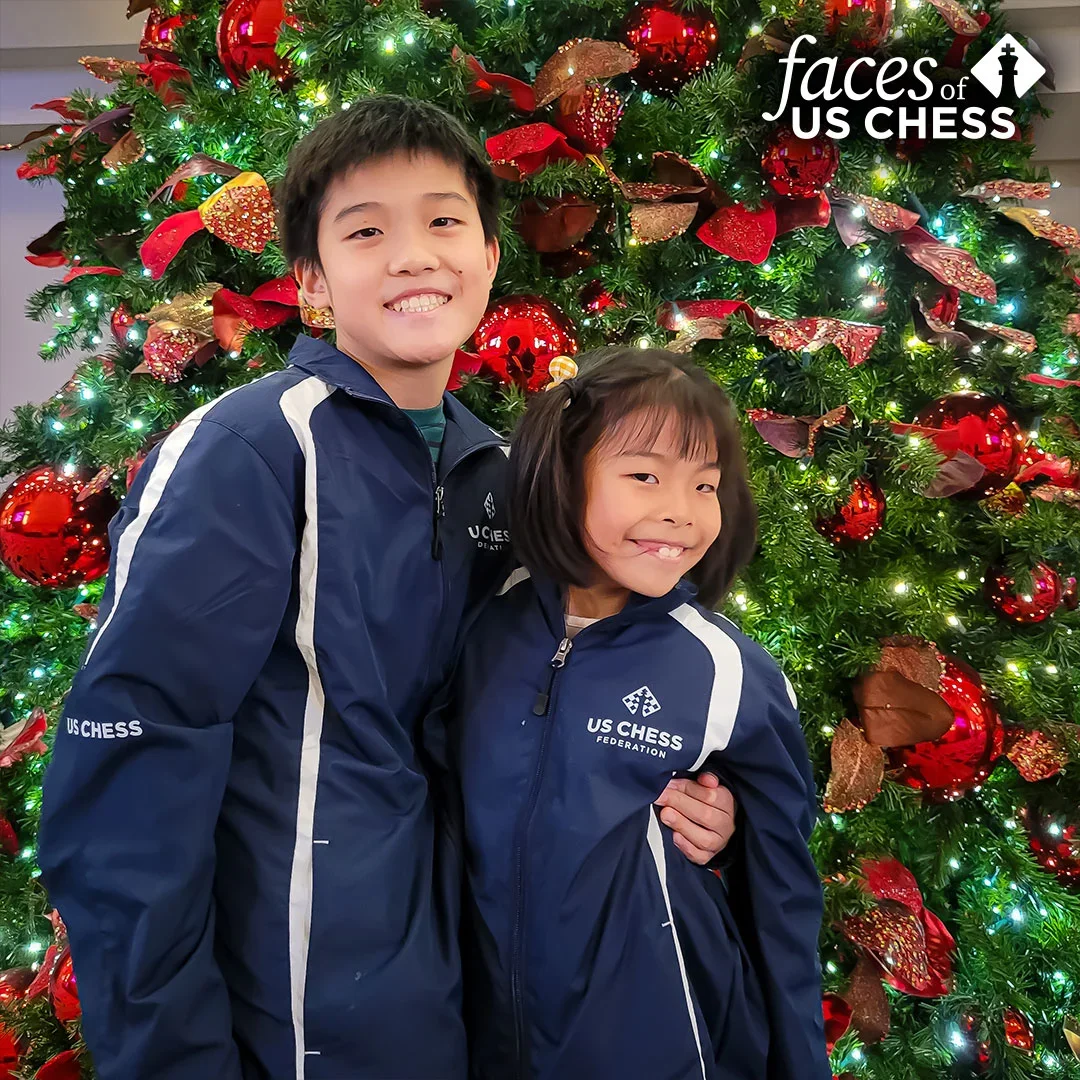
"I have been playing chess for about a year. I like getting trophies. Most recently I got a trophy a month ago for getting second place at the New York State Girls’ Championship. But winning prize money is good, too!
The person I play with the most is my brother. I believe I won once and he has won the rest. That time I won, he let me play up material, but I'm not saying it didn't feel good. It did feel good.
I have lots of other hobbies, too. I started playing the violin a couple of months ago. I also like art and I like to dance and sing. I like sketching and painting and making stuff, usually out of boxes and paint."
-Allison Yu
"I’ve been playing off and on for four years. About two years ago I went to a few rated tournaments and finished with good results. That got me motivated to keep playing. Mainly, my favorite part is to try to outmaneuver my opponent in the endgame. I like to study tactics. I also like the games of Ding Liren, Carlsen, and Fischer.
My best accomplishment is…well, actually, I have two. My first was when I played online for the state championships during COVID lockdown. I was in the K-3 section and I scored four and a half out of five, which got me second place.
My second main accomplishment is breaking the 1600 rating barrier. To get there, I started doing puzzles from different websites. I find it beneficial, because the computer will show you common mistakes or give you alternative moves.
I also like playing the violin competitively. Every year, there’s this state test where you present a piece and judges score your performance. I have already reached the highest level on the violin on this test. But my focus is mainly becoming more and more for chess.
I like chess for improving the mind more than listening to music. I prefer learning from my mistakes in chess a lot more, because when I mess up on the violin, it sounds terrible and hurts my ears.
This year in chess, I'm trying to break 1800, because I’ve been more or less been stuck at 1600, 1700 for a couple of months."
- Vincent Yu
"I grew up playing chess. My dad is a chess player, and he taught my brother and me at a young age. We grew up playing chess together. Chess was always there. But in the past 10 years, I’ve been so busy doing work for chess that I play less chess. I’d say that I work maybe 20 tournaments a year. It's a lot, right? Sometimes I have three months in a row where I'm just traveling from one event to the other.
I do a mix of of things, like DGT boards and streaming and stuff. But, I have to find time for other parts of my life, too, like my girlfriend and my family. It can be challenging. I travel so much and there are so many tournaments that I would like to go to. That’s not easy to decide because I would like to go to all these tournaments, and I want to do all these things.
And so I had to stop playing chess competitively. I think it’s a sad story. One year, maybe it was 2010 or 2009, I was playing an amazing tournament. I was playing way above my rating. I was beating international masters. I had even a small chance to get an IM norm for the first time in my life. And everything was so cool and I was studying hard. The next year, I was working a lot on all kinds of projects and I was spending less time on chess. I went back to the same tournament and had a horrible tournament. I lost all my games. It was crazy. That was the moment that I realized things were changing in my life. I could not keep up with playing chess on a decent level while also working on my other projects.
So my last real chess game was over the board, like half a year back in the Netherlands. When I do play chess, I play online, but I mostly play Three Check, a variant of chess where the objective is to get three checks. On your third check you win the game. And we have a very nice community on Lichess.
Because most of my life is in chess, most of the people I know are connected to chess. A lot of times I meet people who are basically outside of chess and I bring them into chess. But, sometimes, it’s the other way around and I get to engage with people from the outside world. I mean, I met my girlfriend while I was at the Qatar Masters 2014. She’s not a chess player. She was just in the city, in Qatar, and that’s where we met. And we’re still going strong after more than nine years.
But for the most part, the chess community is the place I call home. It’s where I spent most of my time. I have a lot of friends in chess. I make my living from chess. My full time work is about chess. And the nice thing about chess for me is that I can do a lot of creative things and I can do a lot of technical things at the same time. There aren’t a lot of real professionals in the fields that I'm working in. So there aren’t too many competitors who do what I do. I've done a lot of photography, which is amazing, but now I’m doing a lot of video streaming and other technical things.
The most recent tournament that I worked was the Isle of Man Grand Swiss. We made a video production. We put all kinds of cameras in the playing hall that were so cool. One was a small camera that we attached to the chessboard, so you could look through the pieces into the faces of the players. So you saw all their different reactions. This camera angle was so new and for me, it gave a wow factor. I was already happy with how we produced the show, with the commentary and everything. But this camera added a super nice touch. So yeah, that’s something I was very proud of."
-Lennart Ootes
Photo one courtesy of Laurel Aronian, photo two courtesy of Lennart Ootes. This interview was conducted by Laurel Aronian.
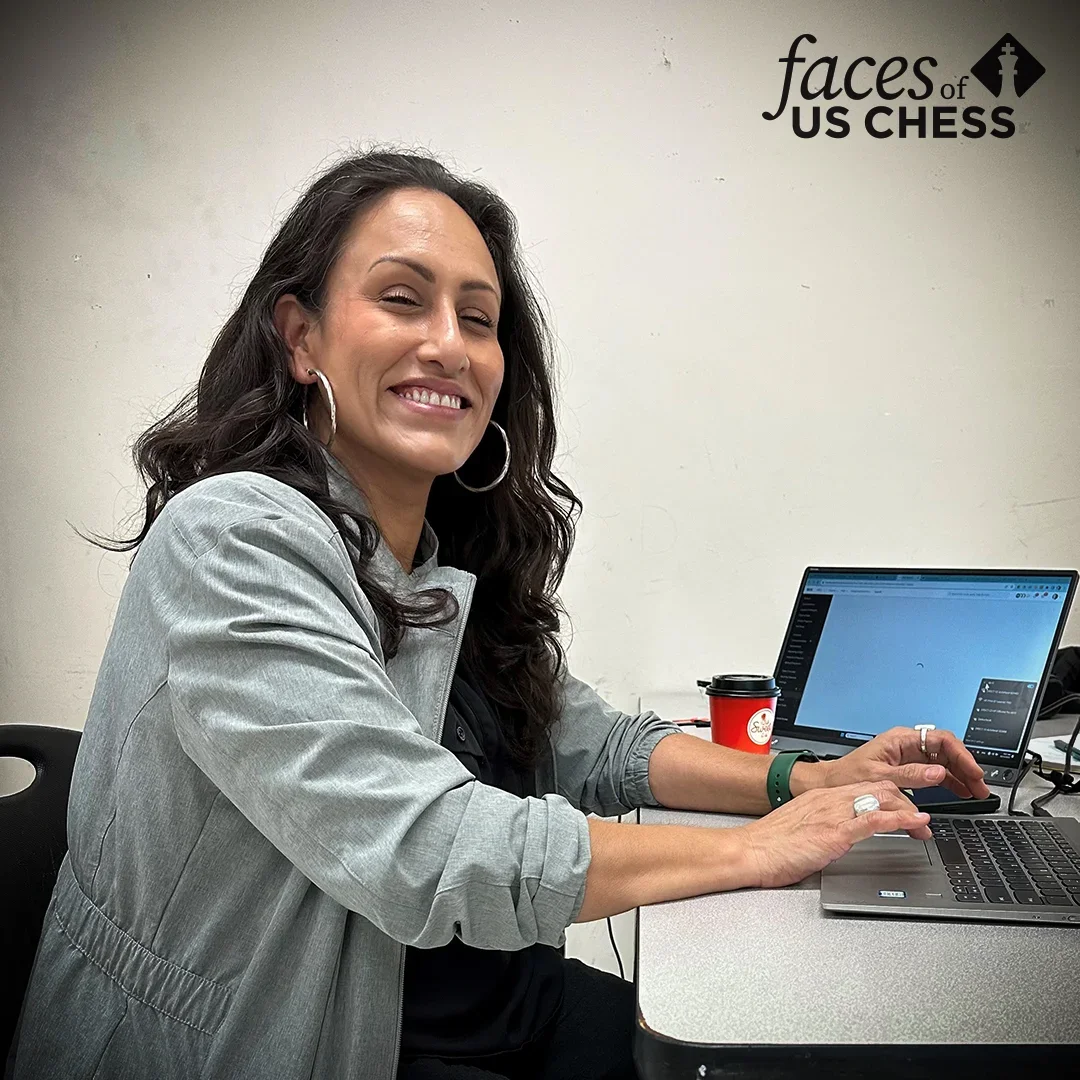
I studied music composition in my younger years. There’s a lot of analysis that comes with composition. And you have to work within certain rules. Sometimes you have wide breadth to do whatever you want. But sometimes the rules mean you can only move in specific directions. So music composition, like chess, challenges you to think creatively and strategically within a set of rules.
But even though you’re working within the rules when you’re writing music, your personality shines through. It’s the same with chess. When you see kids playing chess, you’re seeing their souls or their identities come out through their strategies. It’s an indicator of who they are. And that is creative essence.
Everyone behaves differently, too. For example, when my brother played chess, he knew what kind of strategy he should bring to the board based on how he would see somebody else play. That’s totally creative. It’s also a little psychological. And the psychology applies both ways. When you understand other people’s psychology, it helps you plan your strategy. But you show your own psychology when you get frustrated or short tempered or if you overreact when challenged.
I enjoy watching live chess games about as much as I enjoy watching live music performances because you get all three elements: the creativity, the strategy, the psychology. But composition is a different beast to me. Music composition often feels like something that comes out of nowhere. Of course, there are still rules. You still have to use certain strategies or the music sounds dissonant in your ear.
Playing chess is similar because you also use certain strategies within the rules. But, just as with composition, some of the most exciting moments happen when you make a move seemingly out of nowhere — something unexpected, something creative. When you take time to be yourself within the guardrails of the system that you’re in, your creativity and personality shine through.
- Liz Tejada
For more stories from the US Chess community please visit Faces of US Chess on our Linktree. Moreover, look for us at a chess event in the future to share your story.
“I’ve played probably hundreds, maybe even thousands, of chess games over 10-ish years. What I’ve learned is that the game is not only about being smart or being able to tactically see. That’s such an oversimplification. Chess is not just a high level serious game. It’s a way to meet people, it’s a way to learn social skills. I met a lot of my friends over a chess board.
When I started college last year, at the University of Vermont, I was intimidated — it’s a large place. One of the best pieces of advice I got was make college a small place. Find your people, make the campus small. And so when my friend Jasmine asked me to go to the UVM chess club, I was a little bit tentative, but I went. And it turned out to be a nice group of people, a funny group with a lot of different interests. And we all loved chess.
So now the people I hang out with every day are from the chess club. We play a lot of chess, but we also do other things, like play Mario Kart or study together. It’s become more than a chess club. I’d say I found my core group at college in chess club. And that’s been a very valuable lesson on how chess can be a way to connect with people.
Chess has been grounding for me, too. It’s somewhere I can retreat if I feel overwhelmed, if I have too much to do, or even if I have nothing to do. Whenever I’m stressed out, I know I can turn to chess. And I know when I shoot a text to my friends, they’re most likely going to want to play chess.
Chess has always been fulfilling for me. I’m almost, you could say, obsessed with it. A lot of time I find myself playing blitz or bullet before class. Really, whenever I have spare time, I play chess as a way to get away from the outside stresses and worries of the world to focus on the more intimate setting of the board and the pieces.
My greatest achievement in tournaments was actually a game that I lost. It’s probably my favorite game. I was in the U1500 section, and I played a 1499, the top board of our section, in my second round. I was so excited because I had never faced someone that high. At the time I think I was a 900 or 1000, so it was a big deal for me. It was a very competitive game and I managed to take him to an endgame. We each had under two minutes on our clock when we finished. Even though I ended up losing, I walked away knowing I really gave that game my all. I don’t know how many people can say that their favorite games have been the ones that they’ve lost, but he was a great opponent, and we had a lot of respect for each other after the game. It was just a very nice experience.
I have a couple of pre-tournament superstitions. Last year, I got a betta fish that I named Stock — I thought it was funny, because … Stock-fish. Every morning before a tournament I wake up and I just kind of wave at my betta fish. I think that’s my biggest superstition. Also, for some reason, I don’t enjoy having my phone in my pocket or really anything in my pocket when I play. That includes wallet, keys, anything like that. I like to feel like I am really there. Just me. There is no money on me. There are no emergency calls. There’s nothing else, just me, playing the board. It doesn’t matter whether the game is competitive or if it’s just fun because no matter what the game is, I love to immerse myself because I find it compelling. Each game tells a compelling story."
- Jonah Johnson
This interview was conducted by Jasmine Weigel, Vice President of the University of Vermont Chess Club. Jonah organized several interviews for Faces of US Chess that will be featured in the near future.
"In 1982 this gentleman called me up and said, “This is Arnold Denker.” Then he made the statement, “I want to do something for kids.” One sentence.
He continued, “I want to invite one student who attends high school from every state of the union to come and play in a tournament. We’ll host it at the U. S. Open.”
I was surprised. “You want to host it with a bunch of old people?”
He told me, “I’ll take care of the old people. You talk to the scholastic people.” So we did that. Everything was looking pretty good. But the delegates had to approve it. Grandmaster Denker was asked to talk about this new high school invitational at the delegates meeting. And he said, “This is good for chess.” One sentence, turned around, sat down. I thought, “Are these people going to vote in favor of this when this guy says one sentence?”
But Grandmaster Denker held a position amongst all the people. Two-time U.S. champion. He had done so many things, I can’t even mention all of them. They knew that he would make a wonderful experience for our high school kids. So, they approved the motion.
One day, years later, I got a call from a parent. “My son is the strongest player in the entire state,” she said, “and I want him to play in the Denker.” But he wasn’t in high school yet, so I thought, “We’ve got to take a look at those younger kids.” And so I created a K-8 tournament.
I was asked to talk about the new tournament at the delegates meeting, and I went up and said, “We’ve got kids out there that want to play, so how about we have K-8 tournament?” And the delegates voted unanimously to accept this K-8 tournament.
When I went back to my seat, I was a happy camper. I had accomplished exactly what I wanted to. But then came the words, “Motion to amend.” That motion to amend was to name the tournament the Dewain Barber Tournament of K-8 Players.
I thought, “Hold it. I don’t know what I’m supposed to do now.” When they’ve given you an honor and recognized you in such an amazing way, I couldn’t say no.
A few years after the K-8 tournament was created, I was approached by FIDE Master Sunil Weeramantry. He wanted to know more about the K-8 tournament. And so I explained how it was packaged. Then another individual I did not recognize approached me. I thought I knew most of the people in the world of scholastic chess, so I was surprised I didn’t recognize this person. I said, “Excuse me, sir, I’m sorry, I don’t think we’ve met before.” And he said, “You’re right. We haven’t met. My name is John D. Rockefeller.”
It turned out that he wanted to copy the K-8 and create a K-5 elementary section and fund that, so we would have multiple sections of invitationals.
Later on, the office told me that Rockefeller had endowed several events, including one for people over the age of 50. My wife and I looked at that, and we decided we would endow the Barber tournament.
That’s what we did two days ago. We endowed the Barber tournament in perpetuity. It will always be held. It will always be for grades 6, 7, 8, and then this endowment and the other endowments, the ones that John D. Rockefeller created, will always be there. It is in perpetuity.
That’s a powerful word. My wife and I are not industrial magnates who have created huge businesses and those types of things. I’m a schoolteacher, she’s a schoolteacher. She taught 38 years, I taught 32 years. And during that time we taught middle school. So these kids, they are our people.
I was at the delegates meeting on a Sunday. Sunday’s always tiring when you’re doing the politics of everything. I was tired. I wanted to go home. I wanted to go back to my room. And there was a motion that was put up and I wasn’t really focused on it.
So when the guy stepped up, I thought, “I know him. I wonder why he’s at the mic, what’s the motion?”
I hadn’t paid attention. And then he said, “The motion is to create a new title. The title is Dean of Scholastic Chess.” There have been four deans of American chess, but this title didn’t exist. I had several persons in mind who might get the title. And then he said my name. And I was overwhelmed.
Because, you know, what what can I say to that? What can I do for that? How can I recognize that? And then all the delegates stood up and began clapping and I became very emotional. I just kept shaking my head and then someone kind of nudged me and said, “You’ve got to go up and say something.” So I walked up and…I don’t even remember what I said. It must have been a few words.
It’s been an amazing journey. It’s hard to believe that a common schoolteacher who taught kids a little bit about history ended up being recognized by a national organization. It seems so many people out there understand why we’re involved in scholastic chess.
It’s not a question of money. It’s not a question of the color of your skin. It’s not a question of your politics. It’s not a question of your religion. Will any of those factors change how chess makes you act or what you do? The answer is no. In a sense, it’s a pure science of thinking and understanding about an idea and problem solving that idea.
I don’t accept money. I’m a volunteer. Because I want to make certain that our young people learn to think critically and understand ideas and are able to apply those ideas to their lives."
-Dewain Barber
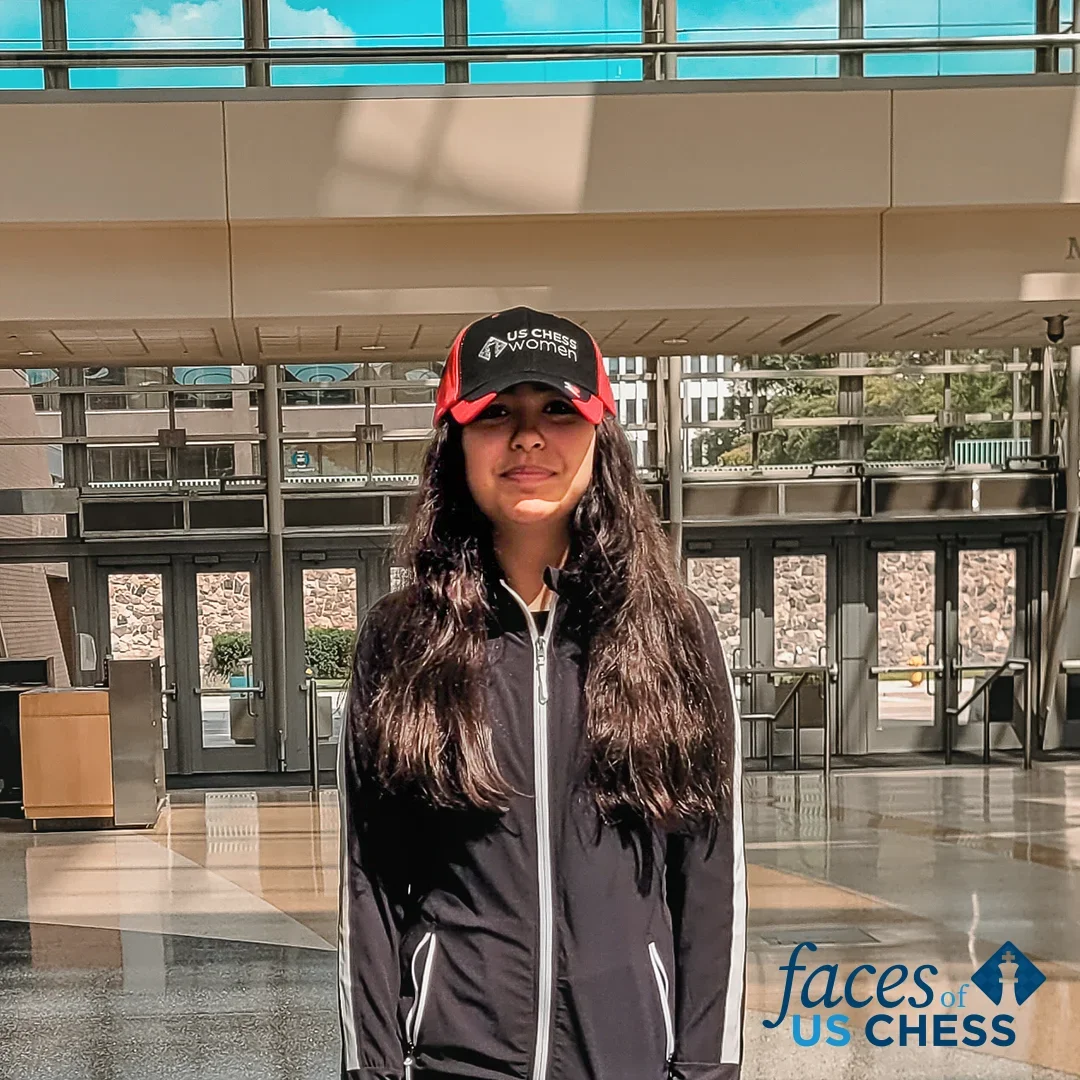
“It brings me so much joy to play chess in a supportive community with amazing friends and family. I like making friends and socializing at tournaments. I also like math, and chess is kind of like geometry, so I really enjoy the thinking aspect of the game.
I live near Nashville, which has a nice chess center where they have tournaments all the time. I have a ton of friends there, and I have fun playing in the tournaments that they have and sponsor.
I think I did really well in my all girls’ state championship in 2023. I was the second seed, so the fact that I managed to win the tournament a round before the last round was pretty cool. I just needed to draw and I was able to do that.
Now I’m playing the invitational, the Haring. It’s an amazing experience because so many people are really good, and you feel like you want to do well. It really motivates me. So I’m trying to play well and make my state proud.”
-Sabrina Hoja
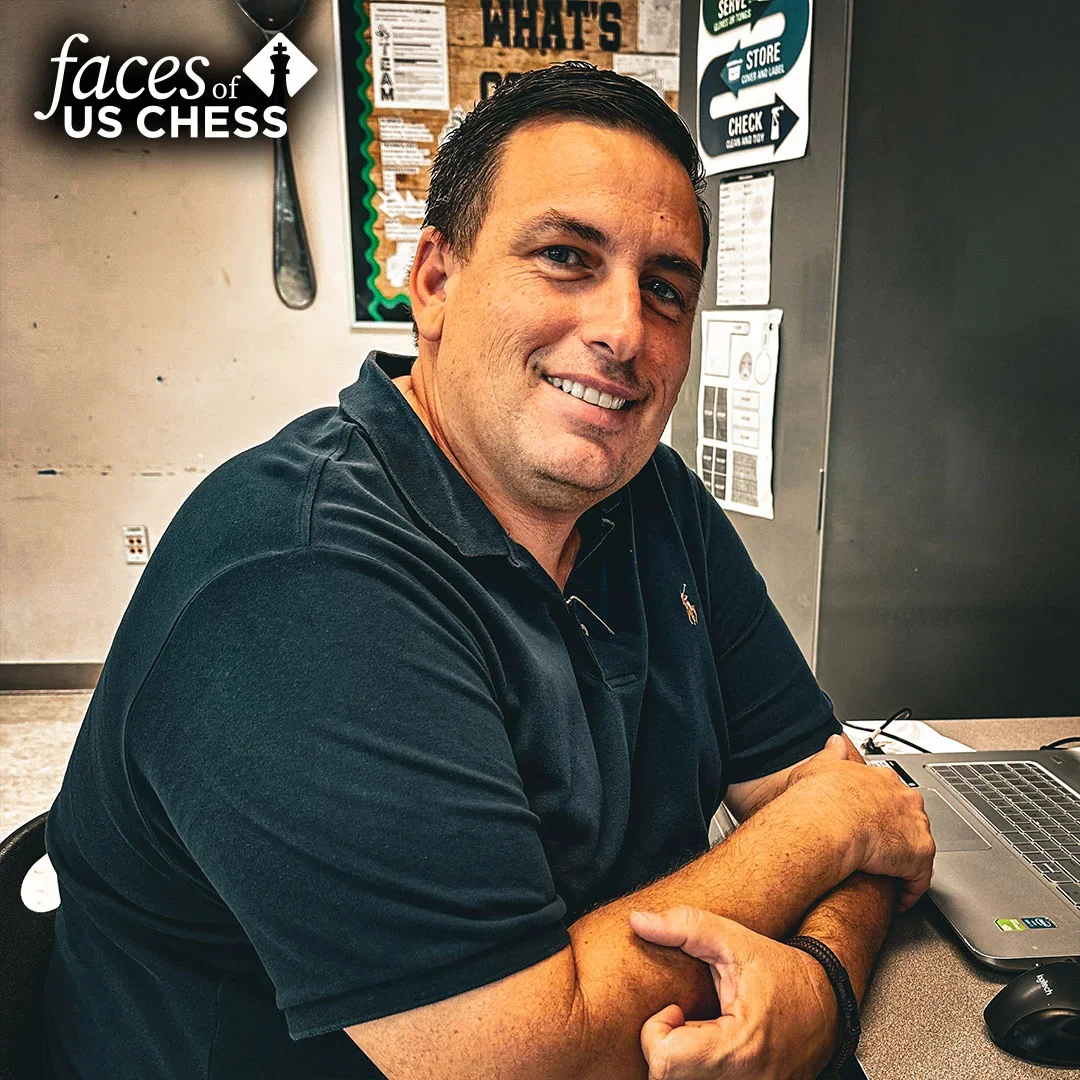
"Hurricane Andrew is the reason I started playing chess. We lived in the disaster zone in the Redlands and were without power for two and a half months. My uncle came down to help us rebuild the house and he and I started playing chess every day. So that’s kind of what got me into it.
Also, when I was in middle school I used to wait for my sister outside the chess club. It was hot one day so I thought, “I’m just going to go in and get some air conditioning.” And I played everybody and I beat them. So that kind of motivated me, too.
Then we get to my whole high school story, which was turned into a movie [Critical Thinking]. The real story is way different from the movie. They made up about 90 percent of the movie.
I didn’t live in [the Jackson school district] like the movie implied. I was a farm boy from the Redlands. It took me two and a half hours to get to school. I made the sacrifice for chess, because I was told if I went to Jackson, we would go to nationals and state and everything, and it would be paid for. My parents were hesitant at first, because it’s in a rough neighborhood. But Jackson was the only school that offered chess as an elective. So, based on the rules here in Miami-Dade County, if another school offered a class that your school did not, you could legally go there.
But it was great being part of making the movie. It was a lot of fun. I worked with John [Leguizamo] one on one. The famous opera game scene in the movie — I did that with him. I taught him the opera game. We spent hours on that scene.
Teaching the actors chess was... well, fortunately, the guy who played Miguel had played chess before. So he was the best out of all the actors. The rest of them we had to teach. They were good about learning something new, and they were really, really nice guys.
I did have some students in the movie. And there was a scene where I’m moving pieces in the background, but I don’t remember if they left that in or not. I actually didn’t look for it!"
-Gil Luna
When I was studying engineering at AFIT (Air Force Institute of Technology), several of my classmates who were chess players took me to the Dayton Chess Club, the local club in Dayton, Ohio. They introduced me to US Chess, tournament play, and the rating system. I started playing more tournament chess and then got involved working with the Ohio Chess Association, which is how I started directing and organizing tournaments.
Then I was stationed in Saudi Arabia as a military advisor to the Royal Saudi Air Force. We had compounds in Saudi Arabia where only Americans could be because of the country’s strict religious policies. There was a restaurant and a kitchen in the compounds where I could go find out if people wanted to play chess. I started holding small tournaments on the weekends over there. I'd send the results into US Chess and get them rated.
I also played correspondence chess through US Chess, as well as Military Correspondence and International Correspondence chess. I would send postcards back and forth through a military postal chess organization. The international chess tournament required numeric notation. It was interesting. I learned to start writing numbers differently because a 1 could look like a 7, so my 7s had to have a line slash through them and stuff like that.
Throughout my military career, chess was always in the background. I have maintained friendships with players I met through the military postal chess. I’ve also met many of my military opponents as a director at many of the larger tournaments such as the National Open, U.S. Open, and World Open. In hindsight, playing chess keeps my mind active and alert, which probably helped me throughout my career in the military.
-Charles Hatherill
Photo 2: Charles Hatherill (right) receiving an award. (photo courtesy of subject)
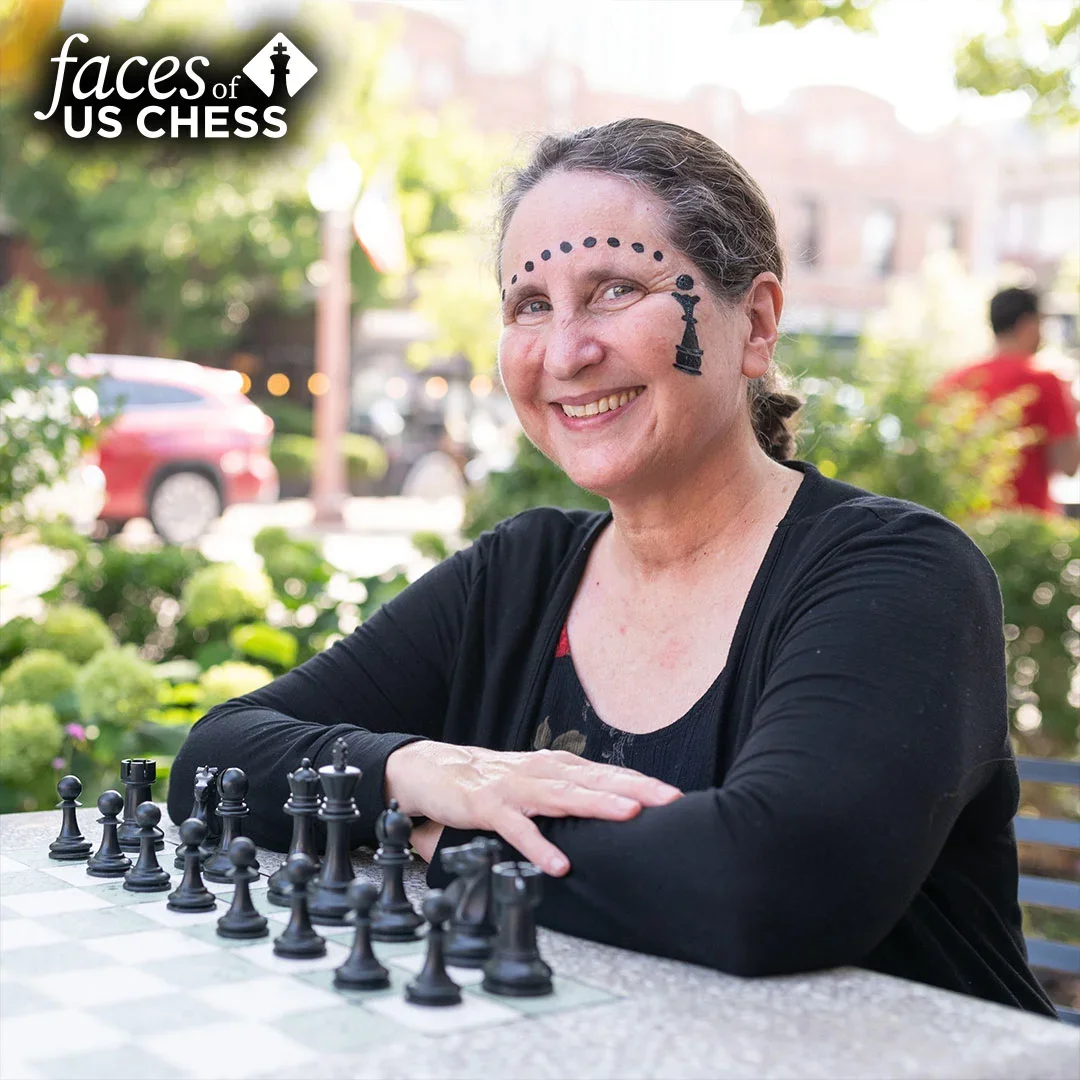
“I have a long history of being an advocate for women in chess. I’m a former U.S. Women’s chess champion and a former women’s committee chair for US Chess. Having played in the U.S. Women’s Championships a total of 10 times and winning one of them, in 1989, I have personal knowledge of the tournament and the players in it. So my most recent book — my eighth book — is United States Women’s Chess Champions 1937 to 2020, published in 2022.
I’ve been a US Chess member since I was nine years old. I’m 58 now. That’s a lot of years of US Chess membership and being involved in chess in the U.S. When I began playing, it was incredibly common for me to be the only female in the room at tournaments. Less than five percent of US Chess membership was female. It’s still true today that most female members are going to be young girls rather than adult women. But the big difference today is that female membership is closer to 12 or 14 percent. So now when you go to a tournament, there’s a chance you’ll see some girls and women there.
I think that’s been a real game changer and makes for a much different atmosphere. When I was a teenager and would walk into a chess club at the same time as some random guy, people would always assume, “Oh, that must be your boyfriend because of course you wouldn’t be coming to a chess club by yourself.” Then, when I got older, I would walk in a club and they’d be, like, “Whose mom are you?”
The point is, now I think there’s less jumping to the conclusion that you’re there because of someone else. You’re not instantly marginalized as someone’s girlfriend or someone’s mom — you’re just accepted as a chess player. That’s something that guys walking into a chess club probably take for granted. They don’t have to go through that extra step of explaining their presence.
To be able to walk in and play chess and have it be normalized — that’s going to happen more and more when we have more girls and women playing. As the numbers grow, there may be more recognition, and more acceptance, that this female is here to play chess.
I’ve been teaching online courses about chess and education at UT Dallas since 2001. Literally hundreds of undergraduate and graduate students have learned about chess and education through these courses. I’m so proud of the people who have run with what they’ve learned and created great things in chess. One of my former students, IM John Bartholomew, is actually a co-founder of Chessable.
I’m super proud of my current role as Chief Science Officer for Chessable. I came up with the idea of establishing the Chessable Research Awards and Chessable is 100% behind it. Three times per year, we award $500 to undergraduate students, $1,000 to graduate students, and $500 to their faculty research sponsors for chess-themed research.
The idea is that more scientifically sound research about chess at the university level — which often leads to peer-reviewed articles in journals — is going to help all of us in the chess community, because school administrators and educators and parents can say, “Hey, there’s this peer-reviewed study that shows this positive benefit about chess.” That helps everyone in the chess community.
The awards are open to any chess-themed research. One of the recent winners was researching chess and scuba diving. That may seem odd, but this researcher wanted to understand how people think underwater. If you can solve chess problems underwater, what does that show about a welder working underwater? Another one I was excited about was using chess software to reduce wait times in an emergency room. What’s the best, most efficient way to move the pieces of emergency room around to have the best outcomes? I could go on, but the creativity and impact of these Chessable Research Awards projects is really exciting. I’m just thrilled to be a part of it.”
-Dr. Alexey Root, WIM
Alexey is playing in the inaugural U.S. Senior Women’s Championship. Look for our round-by-round coverage, including some from Alexey herself, on our website.
"I came to chess pretty late. I was about 40. But I love it. Now I’m president of the Idaho Chess Association. I’ve got our logo tattooed on my calf. And while I’m never going to be a grandmaster, I’ve got very reasonable aspirations of trying to make 1800 before I die.
I’m an educator. I teach high school science: chemistry and physics. Around 1998, I let some kids play chess in my room during lunch. They were playing in the hall, and I said, “Why don’t you sit in chairs instead?” We played informally for about eight years until 2006, when some kids were invited to a novice tournament. At that point, I still didn’t know anything about organized chess. But then one of the children came off the board really excited about his game. He wanted to show me his masterpiece. He played out a 30-to-40 move game from memory with hypotheses, prediction, alternate hypotheses, and different lines that could go down.
I thought, “Wow, I’ve got to investigate this.” I started doing research about brain improvement and whatnot with chess. I also looked at the social aspects of reducing discipline issues. Then there was the academic performance piece. Of course, everyone knows about the math-chess connection. But the one that really impressed me was a reading study. It was in a peer-reviewed professional journal. The pre- and post-test data showed reading scores went up 18% more than other reading interventions because of pattern recognition.
I was sold at that point. That’s when I thought, “I need to jump in and start playing myself so I can teach these kids more.”
I’ve designed our regional tournaments to be inclusive — I believe events should be open to all. I think chess can have a dark side — everybody’s concerned about results and ratings. But as a science guy, I’m more concerned about the process. To me it’s how you get there that matters. There’s a saying that the king and the pawns go in the same box after the game. Because I want players to realize that we’re in this together. We’re here to spread chess to everybody, and everybody can participate."
-Adam Porth
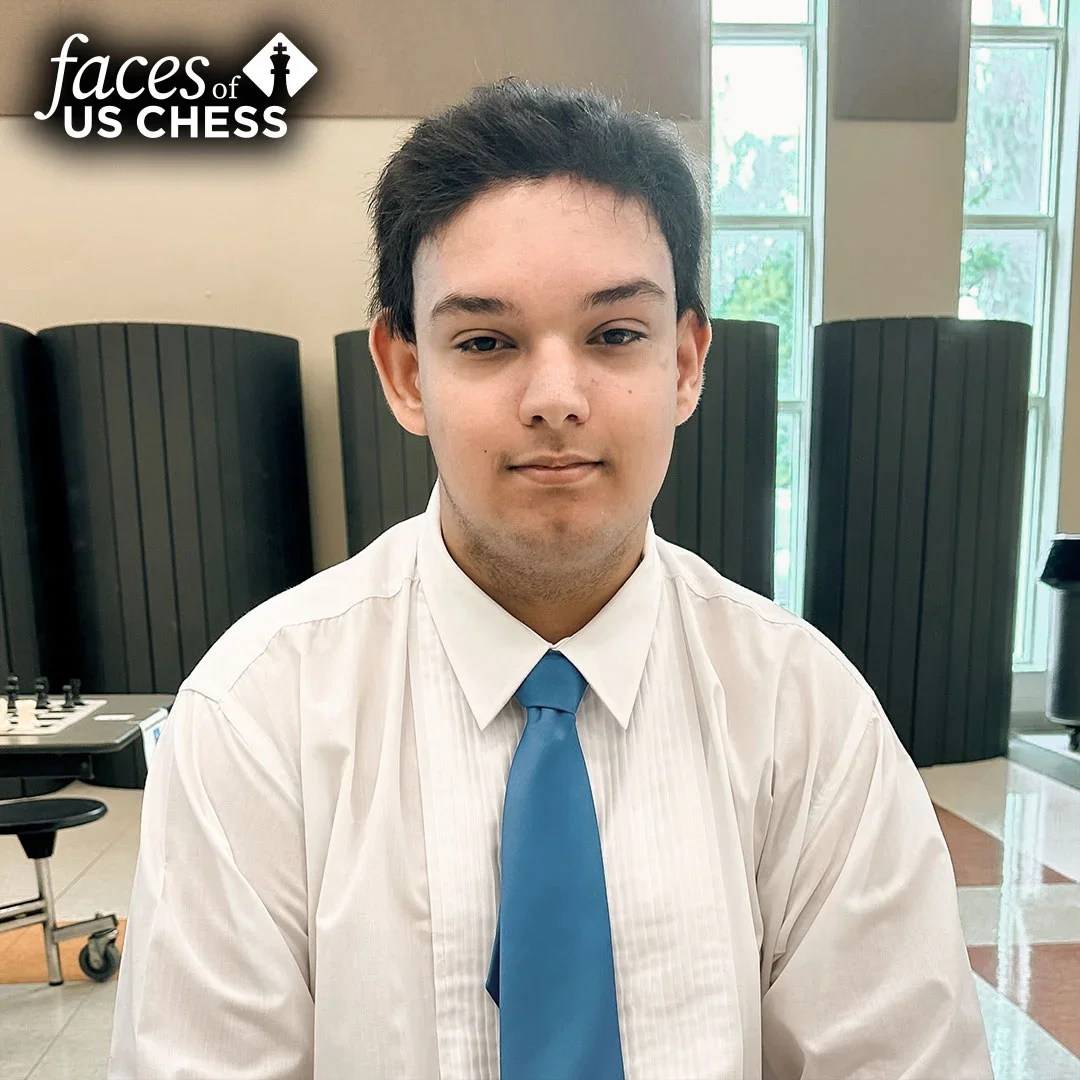
"At my elementary school graduation, they were giving out medals, some for academics, others for sports. And then there was the chess team. When they went up to the stage to receive their medals, I thought, “Wow, that game looks interesting.” I was fascinated by the concept that anyone could play. It didn't matter if you were old or sick or had some type of disability. Anybody could play. And that inspired me.
We had some family issues a few years ago. My mother was in the hospital, and unfortunately, she needed surgery. She was diabetic, she got an infection, and now she’s in a wheelchair, which really saddened me. It’s just the two of us. My dad helps when he can, but she and I live alone. So it’s been tough. I had also been dealing with depression for two years and was diagnosed with severe depression. I felt like I was just not there, that life didn’t have much meaning. But chess helped me. It gave me the confidence to believe that I could do things, that I could be part of something. It made me feel like I could be happy and smile rather than just be in bed feeling like, “What's the point? Why am I here? Why can't I feel anything? Why am I on my bed and I just can't get up?”
I feel like the worst times I’ve been in have brought out the best in me. I think they’ve made me not only a better player, but a better person. I think, if you really want to improve in chess, you simply need the willingness to look into yourself and know that even when it’s dark, even when it’s tough, even when it’s not going great, you have the spirit to just keep on trying. The critical moments that improve your chess are the times when you’re at your worst. You may not be the best chess player, but if you are able to keep going, you’re going to go places. Once you learn how to keep going, it just gets better."
-Brayan Amaya
-------------------------------------
Brayan won the K-12 Blitz at the 2022 National K-12 Grades Championship. He also won the K-12 section at the 2023 Florida Scholastic Chess League’s National Chess Day tournament.
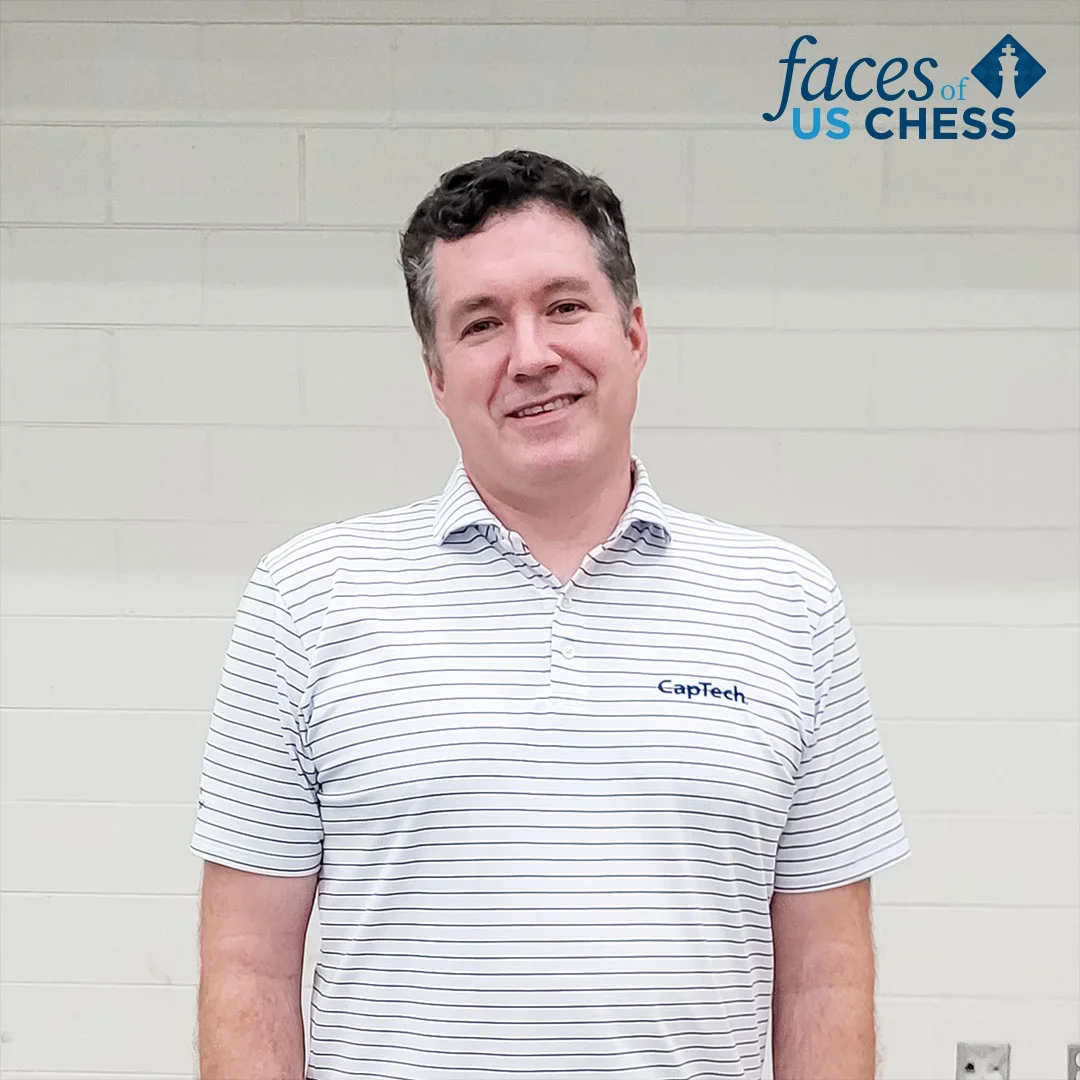
"Chess is so transportable. It’s just a few pieces and a board that you can set up anywhere. In schools, hotels, libraries, restaurants, parks, or on the streets. We love street chess in the big cities, like New York or New Jersey. We’ve seen people play in national parks like Yellowstone. You can play chess anywhere, with anyone.
We like to connect traveling for chess with some vacation time, so we’ve played all over the country. We’ve gone to the World Open in the past. We’ve gone to the one in Vegas, the National Open. We’re here in Grand Rapids for the U.S. Open and we’re looking at the one in Norfolk for next year.
When we travel for chess we also like to experience a new location. We anchor in some chess and we surround it with — sprinkle in — fun. It’s especially nice to travel in the summertime because the kids are out of school and they get to use the critical thinking skills and impulse control that they learned during the school year. It helps reconnect all of that.
Chess is another learning and growing opportunity, just like piano or some of the thought-provoking sports we play, like fencing and such. Some sports like soccer require physical exertion, and that’s great, too. And then there’s schoolwork, which is strictly for learning and the growing of your mind. But chess is a really great sport because it blends the experiences you get from so many other sports. It offers a nice balance. Plus, you get some socialization because you spend time with other people. You’re exposed to different cultures and social aspects. Especially when chess gives you opportunities to travel to other places.
These opportunities to develop life skills through the game of chess are why it’s been around for so long, and why we play."
-Errol Restelli
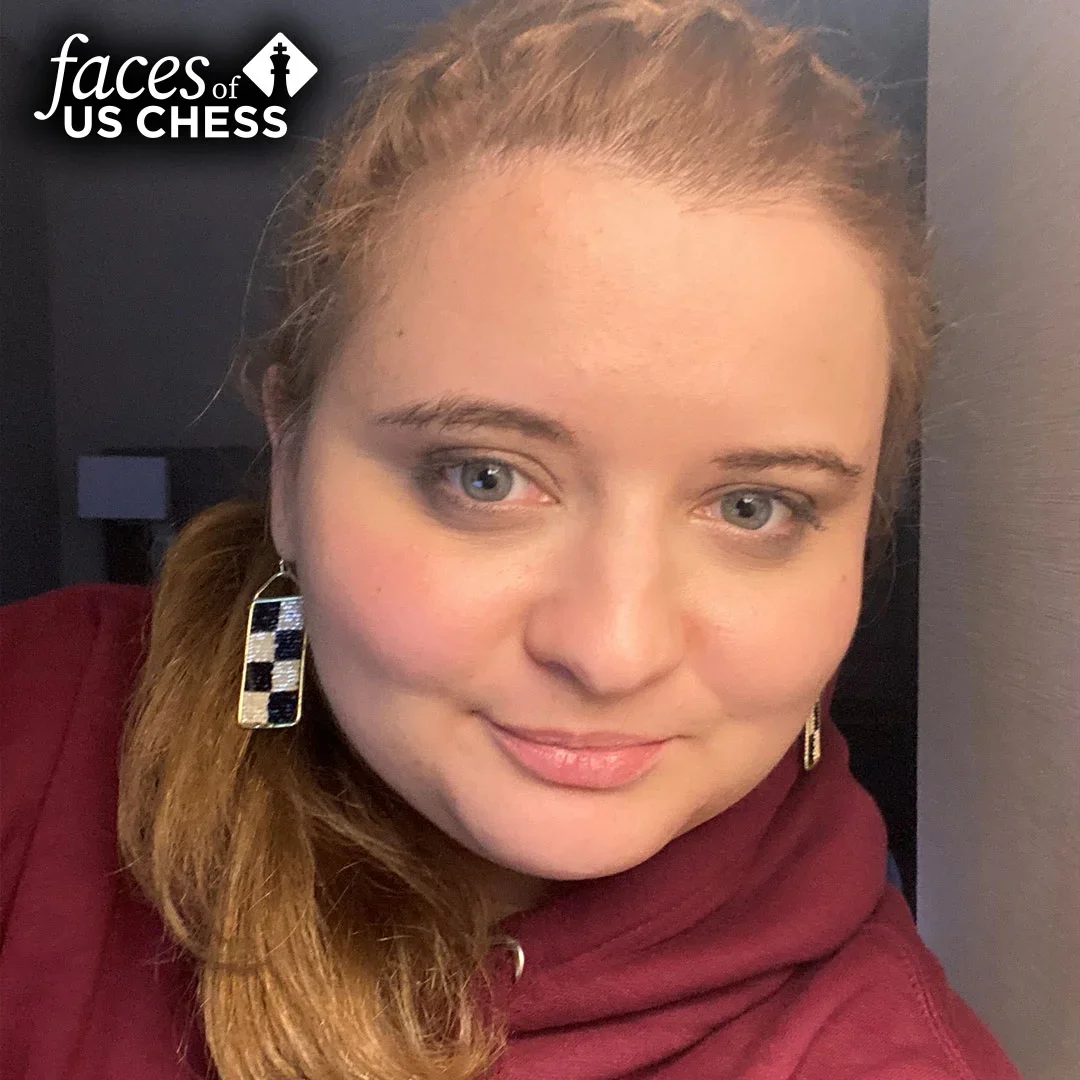
"I’m originally from Romania. My parents are both international masters and taught me to play chess when I was around four. I came to the U.S. in 2008, and until then, I represented Romania as a chess player.
Things are different in Romania because the government typically supports the federation. If you’re representing a team, you get a monthly allowance for your expenses to help yourself while spending time improving your skills as a player. Whereas in the U.S. — especially as a female player — you usually have to add other sources of income. Most professional players in the U.S. cannot just play chess.
Nevertheless, I appreciate the way chess has improved since I came to the U.S. Of course, a significant impact was the Saint Louis Chess Club and the contributions that Rex and Dr. Jeanne Sinquefield made to bring more resources into chess and promote players at various levels.
I also like how U.S. Chess has developed various programs that help support chess in the communities. They’re not just thinking about the professional players but also about how to get more people to enjoy the game. I love developing chess further and bringing in more diverse people, especially those without easy access to it.
I find ways to give back when I can. I’ve recently become involved in doing commentary and interviews. I feel that it’s essential to talk to others about their love for chess, how it started for them, if they are collectors, and if they study chess history — I like to preserve and cherish our history.
I enjoyed doing commentary for the scholastic invitational tournaments (that took place side by side with the U.S. Open). The top three players in each of these invitationals are offered college scholarships. It’s great because, first, you’re honoring a person who has impacted US Chess. You’re keeping their legacies alive. At the same time, you’re expanding those legacies by giving players opportunities to study and further continue the impact. It’s like a cycle, the same as when it rains, and everything returns to nature."
-Sabina Foisor
Look for Sabina’s upcoming U.S. Championships recaps on CLO and in Chess Life. And please visit Faces of US Chess on our Linktree.
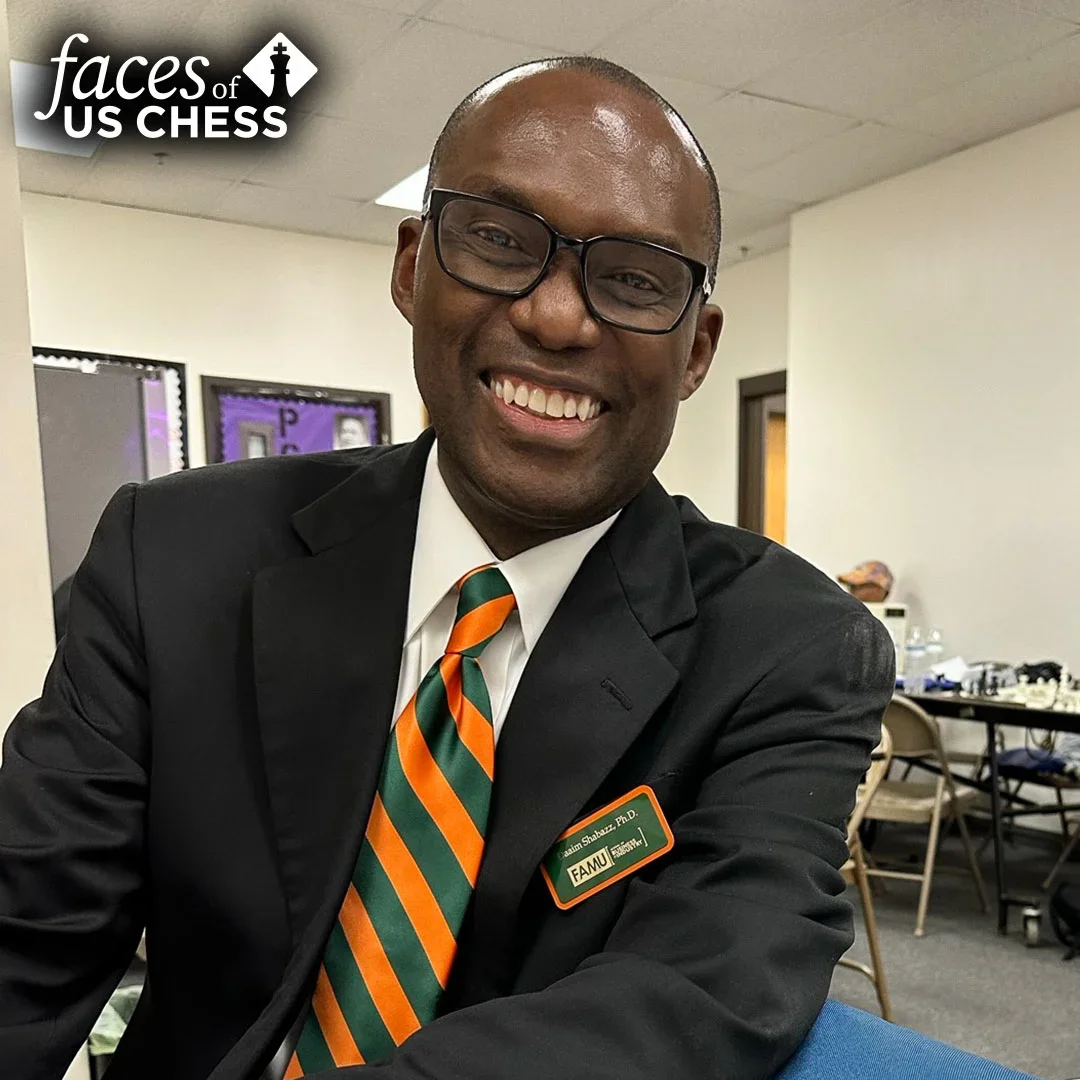
"I met Maurice Ashley in ‘89 at the U.S. Open. We talked about how we were going to make our mark. And then the next year I was in New York doing an internship at Sports Illustrated. I wrote this marketing plan for a class — I was doing my master’s at Clark Atlanta [University] — and it was about developing a Black chess network. It was supposed to be a quarterly magazine. I was going to put out four issues, mail it all around the world. That plan was filed away for about nine years because I just didn't have the time. I had moved to Tallahassee, Florida, where I’d taken a teaching position, a professorship.
Maurice made grandmaster in ‘99. So I went home one day, opened my mailbox and I saw this magazine with Maurice on the cover. And I said to myself, “That’s a sign that I have to go ahead. It’s time. Take this plan out of the file cabinet and brush it off.” And so that’s how The Chess Drum came about in ‘99. The internet was starting to take off, so I launched the website in 2001. Now The Chess Drum is 20,000-something pages. It’s a lot of content.
For the past 22 years, I've written about the African diaspora’s chess contributions and accomplishments around the world. But there are segments — not just the African American segment, but also the young segment, the college-age segment — that we’re overlooking. Because we don’t keep demographic data. Well, US Chess keeps some demographic data — basically it’s age, gender, location, geography. But there’s no ethnic data. I asked someone jokingly, “How many African American players did we have in 2022?” We don’t know. We don’t know how many in 1985, we don’t know how many in 1960, we don’t know today — we have no idea. We don’t know. But the tragedy is that we’re missing out on potential members because we don’t have the analytics."
-Daaim Shabazz
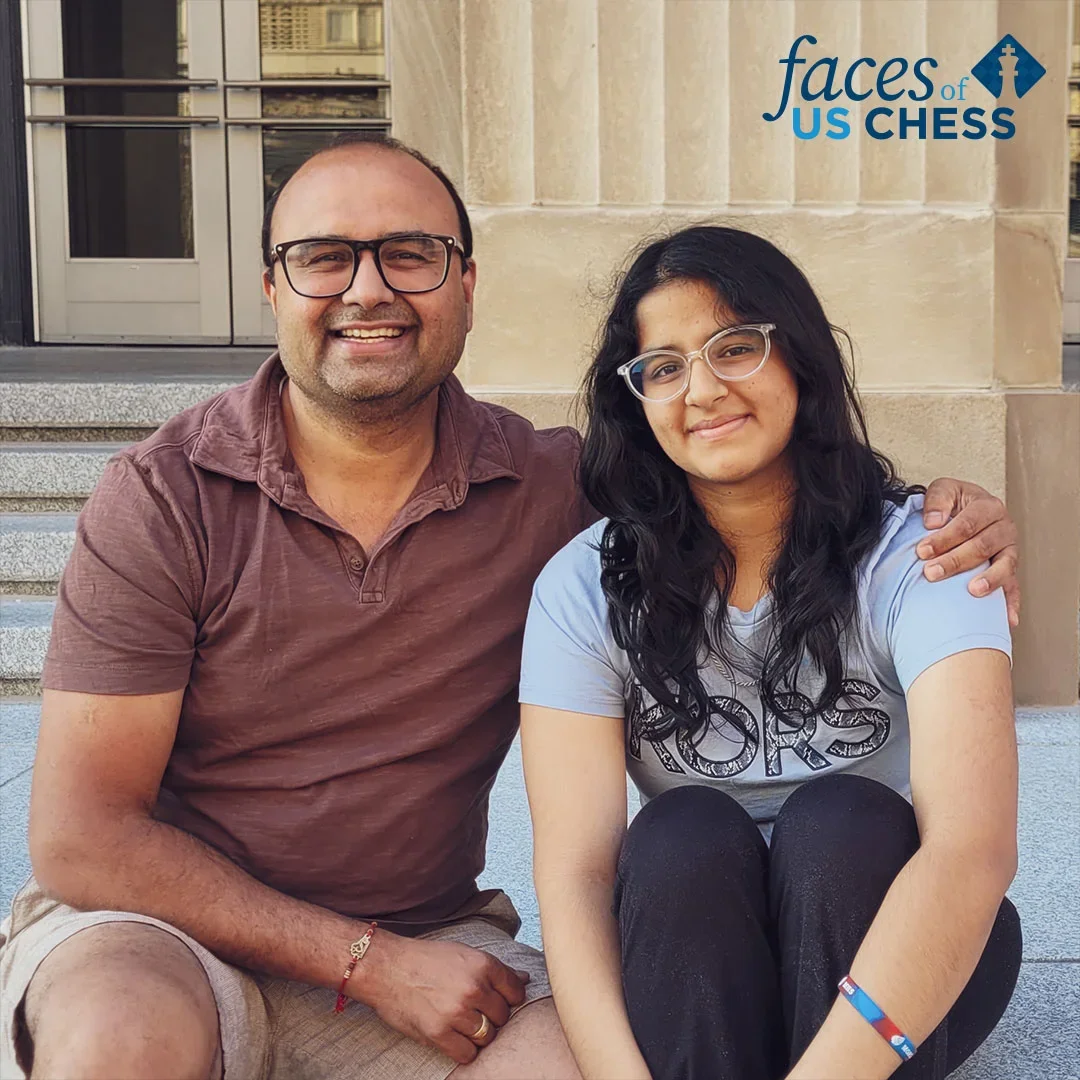
"No, I don’t play chess. I dance. I do hip-hop competitively. We’re here at the U.S. Open because my brother is playing in the Rockefeller for the second time. I love being here with him, just experiencing it with him. You know, saying good luck and watching him come out of the hall — happy or sad, doesn't matter. It just brings me a lot of joy.
I think competition is good. In dance I get to meet a lot of people, and it makes me feel like I have something to look forward to. Dance is a big part of my life — dance camps and going to the studio — they’re like second homes. Dance motivates me to keep going. That’s how I want my little brother to feel about chess. I think he’s starting to get into what the other kids are doing with their games and stuff. But I’m six-and-a-half years older than him and he’s still a kid — I don’t think he understands the priorities right now. That’s something I’m sure he’ll understand later.
I think loving any sport is a big deal. So what I’d like for him to get from this tournament is lots of growth and reigniting that motivation. I just want him to find something to love like I have. I hope that it’s chess, but if it’s not chess, I will always be supportive."
-Dhruvika Solanki
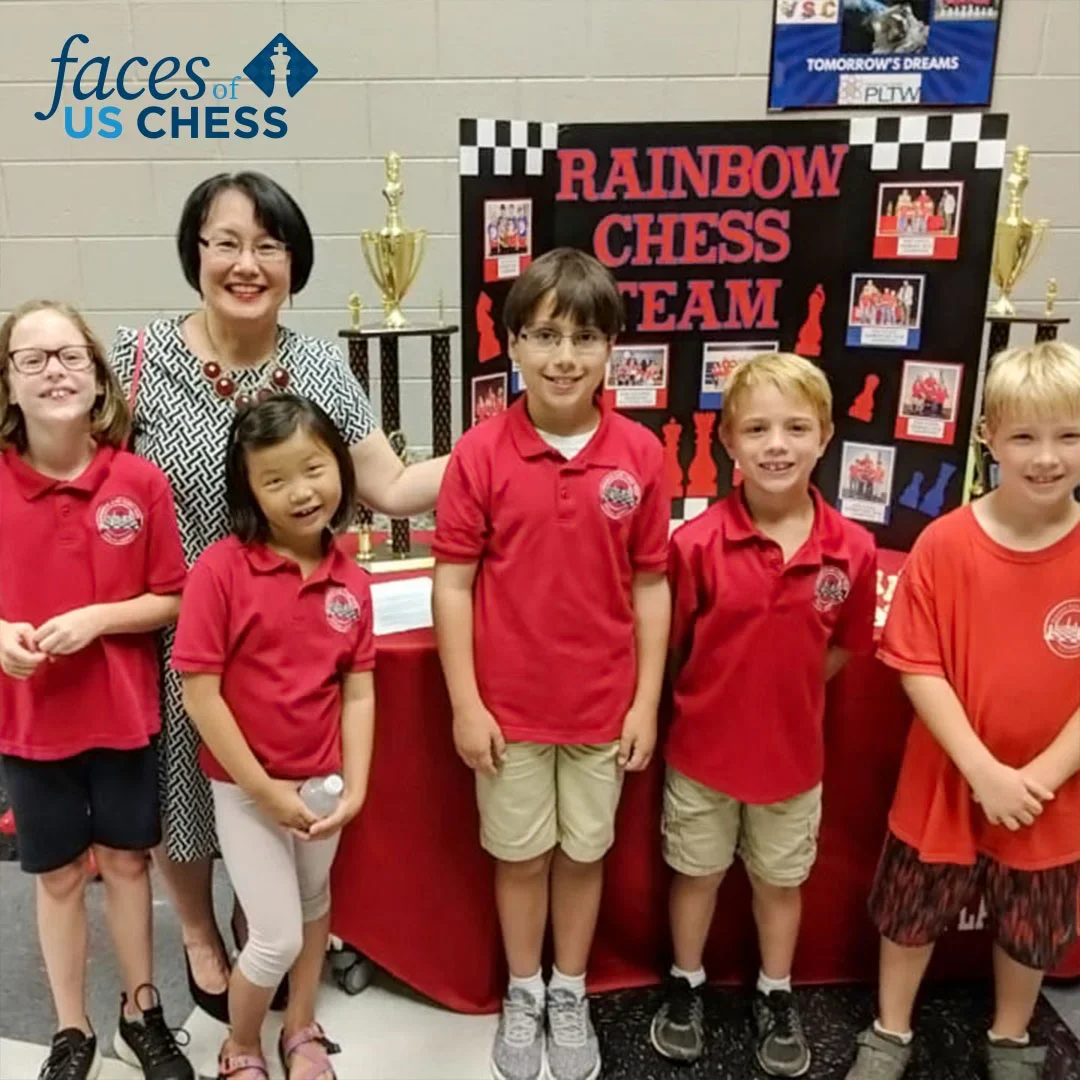
"I never intended on making chess a career. I was an attorney by profession and had worked for federal judges right out of law school. But when my son was in kindergarten, he started asking, “Why can’t you read to class like the other moms?” That’s when I realized it might be time for me to retire and do more in the classroom. So I started volunteering a lot at the school and eventually I was asked to help with the chess club in the mornings.
We had about 10 or 12 kids who would come to practice. In the second year, I convinced the gifted teacher to have the club meet after school to get more participation. We had over a hundred kids sign up! Then a smaller group of kids wanted to go to a tournament.
We went to a few tournaments in Alabama and then I took a group of seven kids from our school to SuperNationals in 2013. And oh, my stars. I mean, you see chess on that scale and it is just unparalleled. Everything was online. Everything started on time. That was a big deal for us in Alabama. I came back from that experience realizing we needed to up our game.
SuperNationals inspired me. One idea was to get ChessKid.com memberships for our club so they could train online as well as have over-the-board practice. But mostly, I wanted to develop an organization that had online registration and pairings and standings and everything happening like it had at SuperNationals.
So, that’s where I got the idea to start the Madison City Chess League. Because I wanted all kids in Madison to be able to play, not just the ones at my son’s elementary school. I thought we’d all get stronger that way. I also saw the academic benefits of chess, whether you played competitively or not.
I was on the school board at the time, so I convinced our superintendent and our school board to provide chess education through the ChessKid program for every elementary student. That grew over the years as these elementary students went to middle school. Our school system added a chess elective for middle school students and we used that curriculum.
I didn't realize how pronounced the gender gap in chess was until I brought a team to a state chess event in 2013. This was after SuperNationals. We had eight students on that team, and five were female. The moms of the few girls from other teams started coming up to me, asking, “What are you doing to have so many girls playing chess?” I hadn’t realized I was doing anything special, but when I thought about it, I was helping grow girls in chess in a few ways. For instance, when I hosted tournaments locally, I would ask the kids, “Why do you like playing chess? Why do you like being here?”
Oftentimes, the boys and girls would tell me different things. Many of the boys said, “I like to win, I like the trophies, I like the medals.” But when I asked the girls, they’d usually say the trophies and the medals were great — and a lot of them won them — but the primary reason they were there was to hang out with their friends. So once I understood what motivated the kids, I intentionally held events that incorporated fun for the entire team, like a team dinner or an ice cream night.
Another fun event we did was a Halloween tournament on the football field. It was during the height of COVID, so we were wearing masks and gloves and played outside. We had a costume contest, a scariest glove contest, the best mask contest, and other activities along with it.
When you’re trying to grow your female population, it’s important to not stack the deck ahead of time. I know what it feels like to be one of the few women in a room or one of the few women who are in some category — whether it was my math major in college or being in law school or organizing and running chess events. So starting as early as kindergarten, we are making sure that the girls aren’t sitting in a room where they’re greatly outnumbered.
About six years ago, I hosted the first All-Girls state chess championship in Alabama. We had probably fewer than 40 girls competing in that tournament. Last year we hit a record 66 girls. We had more girls in Alabama playing in our state championship than in Tennessee or in Florida, where they have a women’s and girls’ championship. And so, I was thrilled at our numbers.
A few years ago, I had started moving the tournament to corporations and companies so that girls could see how they could apply the STEM skills that they learn in chess to the business industry. So last year, we hosted the tournament at Hudson Alpha. The company offered a tour of their campus so the girls could see some of the work that they’re doing. They do a lot of innovative research to help cure cancer and other pretty amazing things related to the biotech industry. Plus they have this wonderful double helix path where they do fundraising events, so the girls simply could walk outside and just see how beautiful it is in Research Park. It was inspiring for the girls to be able to see that they could work in a place that looked like this and do such impactful work for the world. Or they could even participate in student internships that Hudson Alpha offers.
This year, in ‘24, we're going to host the All-Girls at the Alabama School for Cyber Technology and Engineering. The cyber school is a boarding school in Alabama that just opened last year. I’m hoping, because of the cyber school, a lot of girls from across the state will come in. I’d also like to set another all-time record this year. I hope our numbers will hit in the 70s."
-Ranae Bartlett
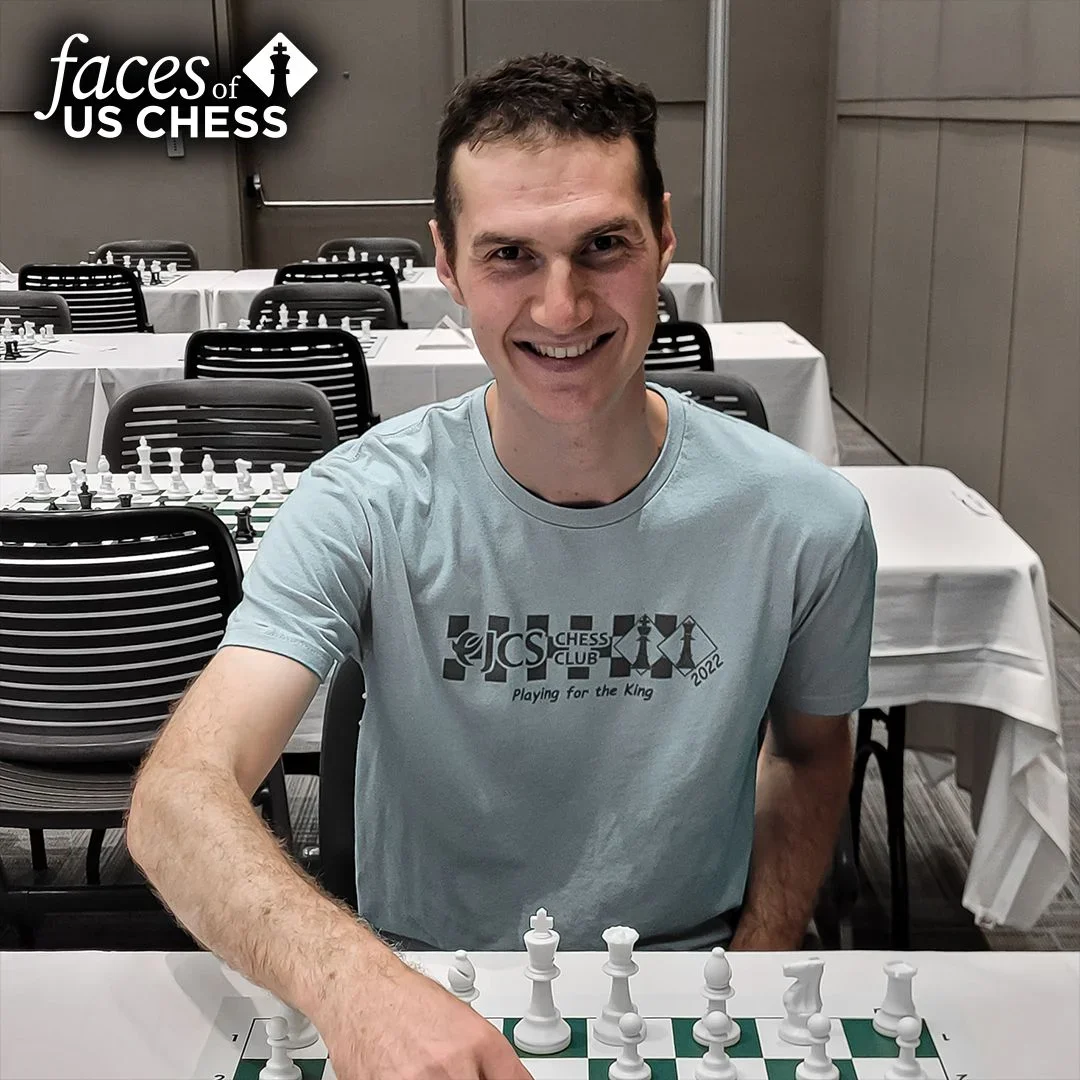
"I started playing chess when I was about 14. I read about it in my dad's old World Book Encyclopedia. But I didn't have a chess set. So I took a bunch of my Lego pieces and put them together for a board. And I had some droids to use as pawns for the black side and some farmers for pawns on the other side—it was pretty creative, right? That was my first chess set. Later my friend got one from the dollar store and got a glass chess set for me. It was nice. I used that to get started and got my first couple of books. Then I found out about Bill Adams — he lives in Florida now — who had a chess club at a few libraries where you could just come play. Bill gave me an official chess set with all the correct sizes and everything, so no more Legos! And the set he gave me is the one I still use today."
-Andrew Schremser
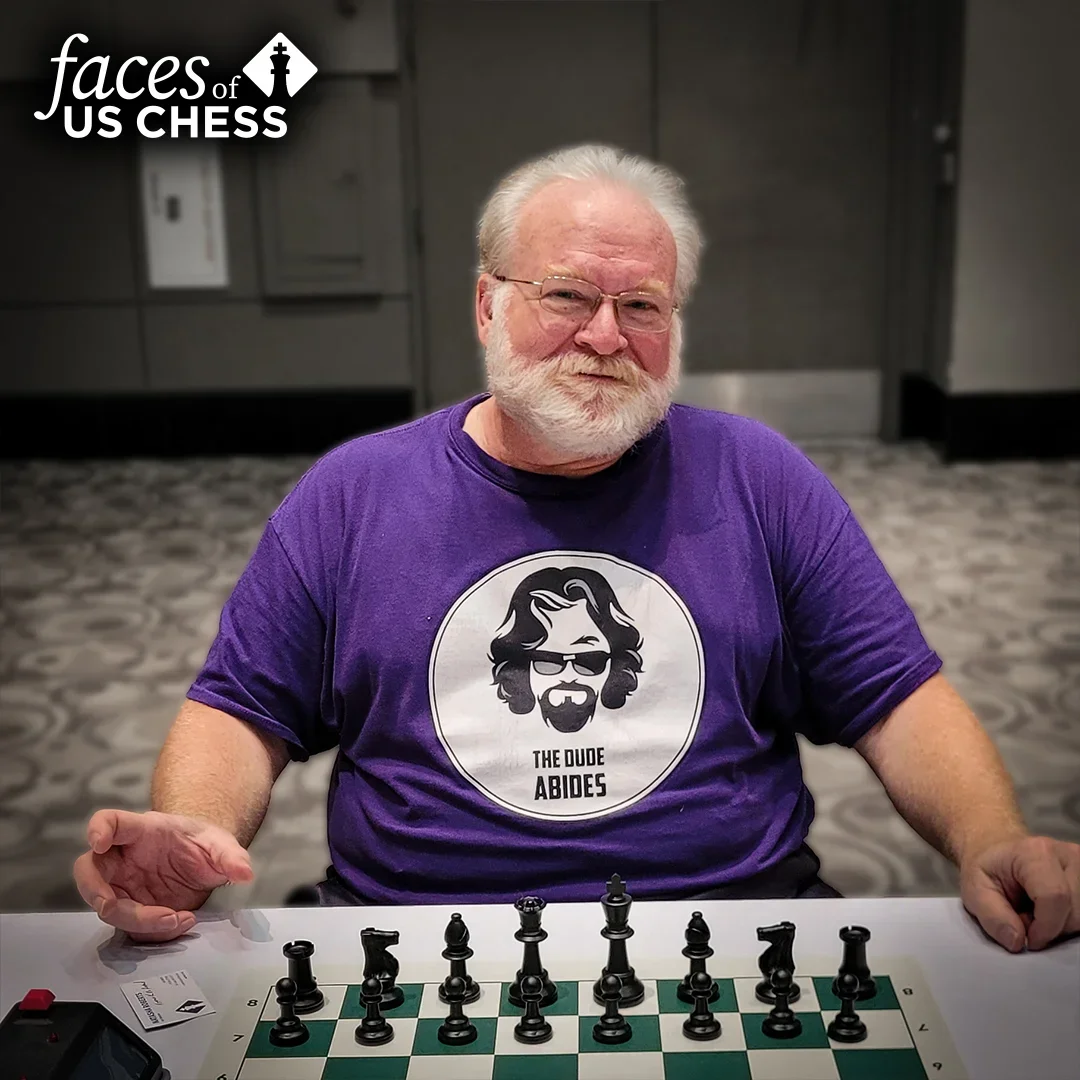
"My mom died suddenly in 1969 when I was nine. Shortly before that, she got a chess set with either S&H green stamps or with Raleigh cigarette coupons — I can’t remember which. Anyway, she got us this chess set and my brother and I played. That was just a little before Bobby Fischer and the 1972 chess boom. So when I got to junior high — also in 1972 — I knew a bit about chess. We had a chess club ‘cause of the Fischer boom, so I was all ready to go. I started playing in tournaments in 1973 and have done so every since.
I love that chess offers the possibility of creating art. If your opponent can meet you halfway, you can create something beautiful over the chess board. Beautiful tactics. Beautiful. And not just a two-move tactic or something. You can create some really gorgeous stuff.
That beauty is what’s particularly appealing to me. I love seeing the really great players play something that’s just gorgeous. Sometimes it’s hidden, but I play well enough to appreciate what world champions and really strong grandmasters can create. And you know, every once in a while, I can do it, too.
My favorite player is the world champion Vasily Smyslov. He was probably the best player in the ‘50s. There’s a game he played in Zurich ‘53, where he was paired with another former world champion, Max Euwe from Holland. It was a Grunfeld. Euwe played very, very well — I loved his idea — and Smyslov kind of got in trouble. So Smyslov’s in trouble, but then he put up a great defense. Euwe didn't see the most concise way of playing it and Smyslov turned that on him.
I’ve used that game a lot of times when I’ve done lectures at schools and prisons and such. So that's probably my very favorite.
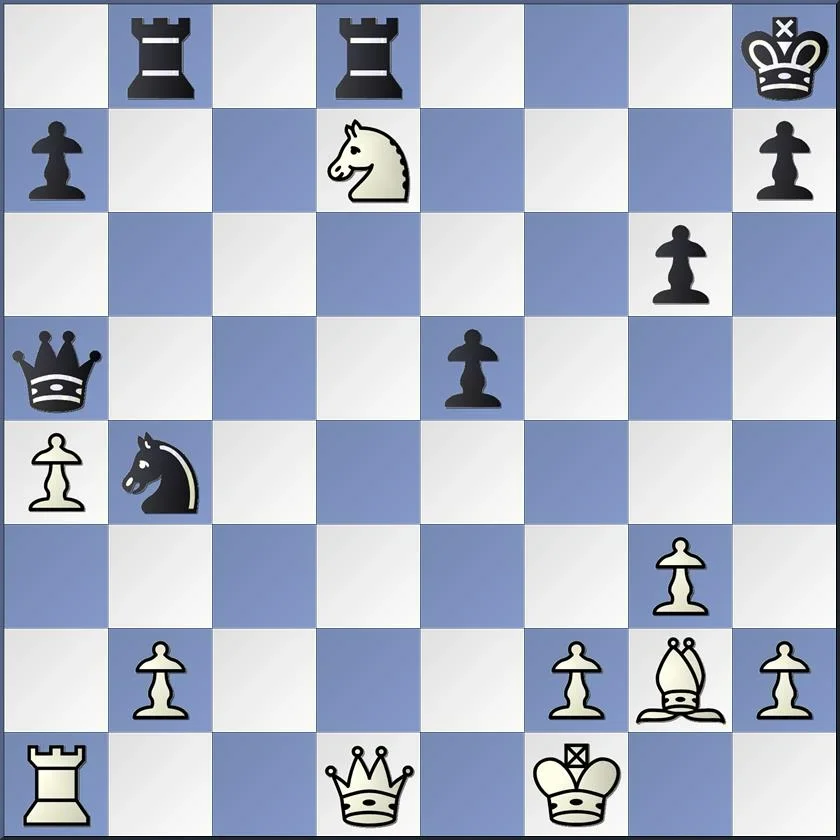
I volunteered at prisons four or five times a year for around 28 years. I did simuls and gave lectures from time to time. Prison chess is very tactical, as you can imagine. And the hype talk, the banter — there's a lot of that. I would walk in the room, and they’d immediately start: “I'm going to beat you” and such. About the fourth time that they’d play me they’d know the talking wasn’t going to work. They weren’t going to beat me. So, I would tell them to try to figure out what I was I doing because I was always winning. I’d say, “You know what you want to do, but you need to figure out what I'm doing.” And they would. It was always interesting to see that transition, when they started coming with the idea of learning something.
I was there for the game, helping others appreciate the game. And I know they were looking forward to playing chess with me. That chess club was a highlight for a lot of us. There was also this fellow, James Ziegler, who worked there. Running the chess club was his favorite part of his job. He could play chess and he got to be around 1400. But he never wanted to win a chess game against any of the guys — he wanted to draw. So even when he was winning, he would offer a draw. In James’ mind, he was trying to teach these guys that you don’t always have to win. You don’t have to beat and conquer the guy across the board from you. You can enjoy a game, have a nice, maybe even cerebral, conversation. And then just shake hands and play again tomorrow.
Chess helps a person have true self-esteem — you’re going to get out of it what you put into it. And you learn there’s consequences for everything you do — there’s consequences all over the board. But hopefully you learn that you don't have to beat that guy across from you, like James Ziegler taught. I mean, you’re going to win some and you’re going to lose some. But really you are here for the game. To share a common interest and a camaraderie."
-Eric Fischvogt
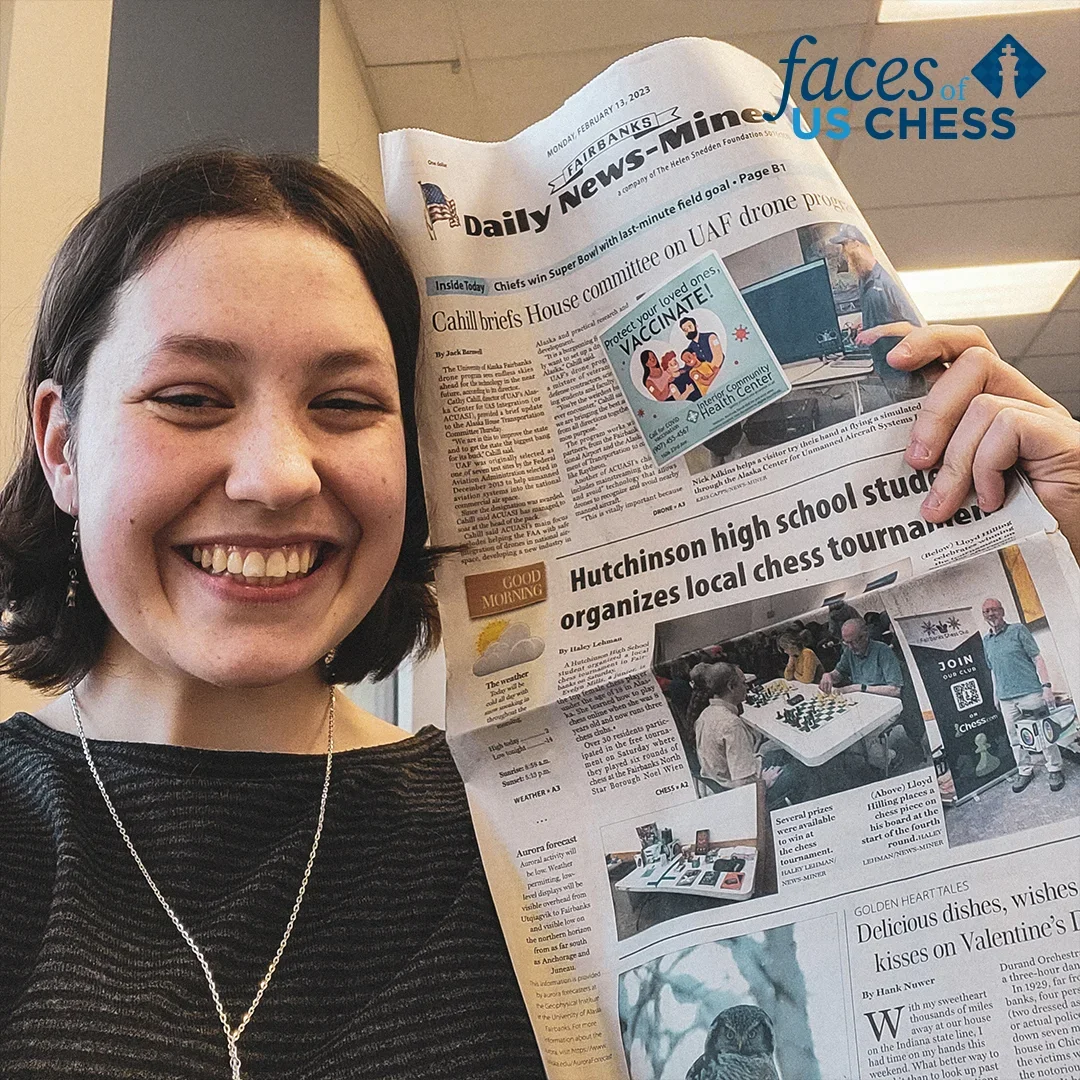
“For a long time it was just me and Eamon at the club. He ran it, sometimes out of his rock climbing gym. Then the meetings became really infrequent and sometimes he wouldn't host the club at all. And then, less than a year ago, he was like, “I'm kind of done. Do you want take it over?”
I was, like, ”Come on, we’re Fairbanks. We're not a small city, relatively speaking, for Alaska.” So I took over the club because I wanted Fairbanks to have one. And I wanted to play chess, and I wanted people to play chess with me. My goal was, “If I can get five people to come regularly, I will be the happiest person in the world.” For the first couple of times, no one came. But eventually, we got more. It's now at least 10, which is double what I wanted.
One key was that we decided to have the club at the library. I’m really grateful to the library. They let me use the study rooms for free and as the club got bigger, they let us use a bigger room. Then they approached me about partnering with them, which has been so amazing. At one point they used some donated funds to help buy boards and clocks for the club. They advertise the club at the library and on their website, and they continue to let us use their space for our meetings.
And now we meet every week consistently. Well, we're off for major holidays. And when I can't go, my sister or my mom goes. We make sure someone’s always there.
We just don't have tournaments regularly in Alaska, rated or unrated. So I decided to host a tournament, an unrated tournament, the first in nearly 20 years in Fairbanks. I was hoping that a few people would come. I didn't think we would get 35! It was insane. People from Anchorage came, people from Denali came. People were emailing me saying they couldn't get in because the registration was closed — we had run out of spots. And I was like, ”Oh my gosh, I wish I had more boards.”
I think part of the success is a result of me really advertising the tournament. I announced it on Chess.com and Instagram and Facebook. But about 90% of the people who came to me did not see it on any social media. Instead, they found out about it from posters I’d put up all over town. I put posters everywhere — the library, the grocery, the bowling alley, the swimming pool. I would ask, “Oh, did you see Facebook?” They’d respond “No. Fred Meyers.” It was like, old school.
I also went around to all these places asking for donations for prizes. 95% of the time it was no, but sometimes it was a yes. I got GameStop and some local shops to give me some stuff so we were able to have prizes. During the tournament, the Fairbanks Daily News-Miner stopped by. We were on the front page. Two Alaska State Senators sent me letters. That was so cool.
I’m really hoping I’ll get to run at least one rated tournament. It doesn't have to have a lot of people. I just want to give people the opportunity. A lot of the people who come into the club are like, “Hey, when are you going to do a [rated] tournament?” And I'm, like, “Can you give me a second? I'm only 16!”
-Evelyn Mills
Since this interview, Evelyn has began organizing a tournament in Fairbanks for National Chess Day in October. Follow Evelyn’s event, and many other events, as we share more #NationalChessDay coverage. More information on hosting and promoting events for National Chess Day is available here.
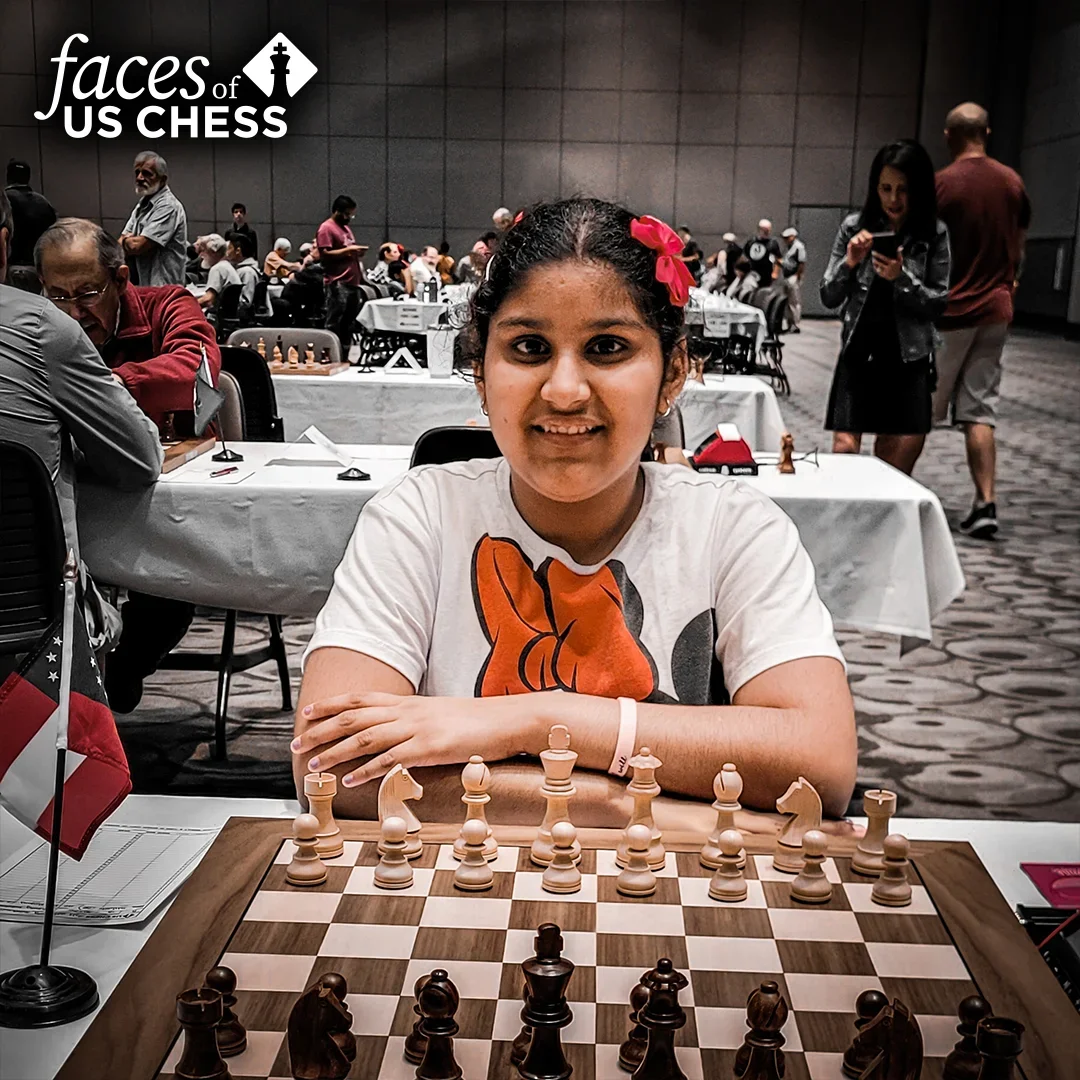
“My chess journey wasn’t like in the movies. I started playing with my dad maybe two-and-a-half, three years ago. And I kind of liked it. We would play some training games and I was never able to beat him. But then one day, he fell into a fork. I played my first tournament soon after that and it constantly got better. So I played in more tournaments.
Now I’m playing in the Ruth Haring Invitational. So far, it’s been really good. We get to play against girls who are the cream of the cream, right? So it’s been really, really fun and interactive. Playing on the DGT boards has also given me a chance to play my best chess and get it shown to everyone. It’s been encouraging and fun. I've been loving it so far.
I like everything about chess. It’s a mind game where you can outsmart anybody. You could even outsmart Mangus Carlsen! It often depends on who’s having a good or a bad day. And you don't have to go anywhere special to play. In other sports, athletic sports, like running or football or basketball, you have to go outside and if it’s raining you can’t play. But chess — you can play it anytime, anywhere, at any age. It can be enjoyed by anyone.
I’m currently the Georgia women’s champion. My goal is to become a WGM. And my highest goal is to become the women’s world champion. But just qualifying for these events is really good.”
-Jwalanthi Ram
Jwalanthi is currently the Georgia women’s champion and went on to place second in the WIM Ruth Haring National Tournament of Girls State Champions. Congrats to all of our winners. Check out coverage of the Invitationals from days one through four of our U.S. Open reports here.
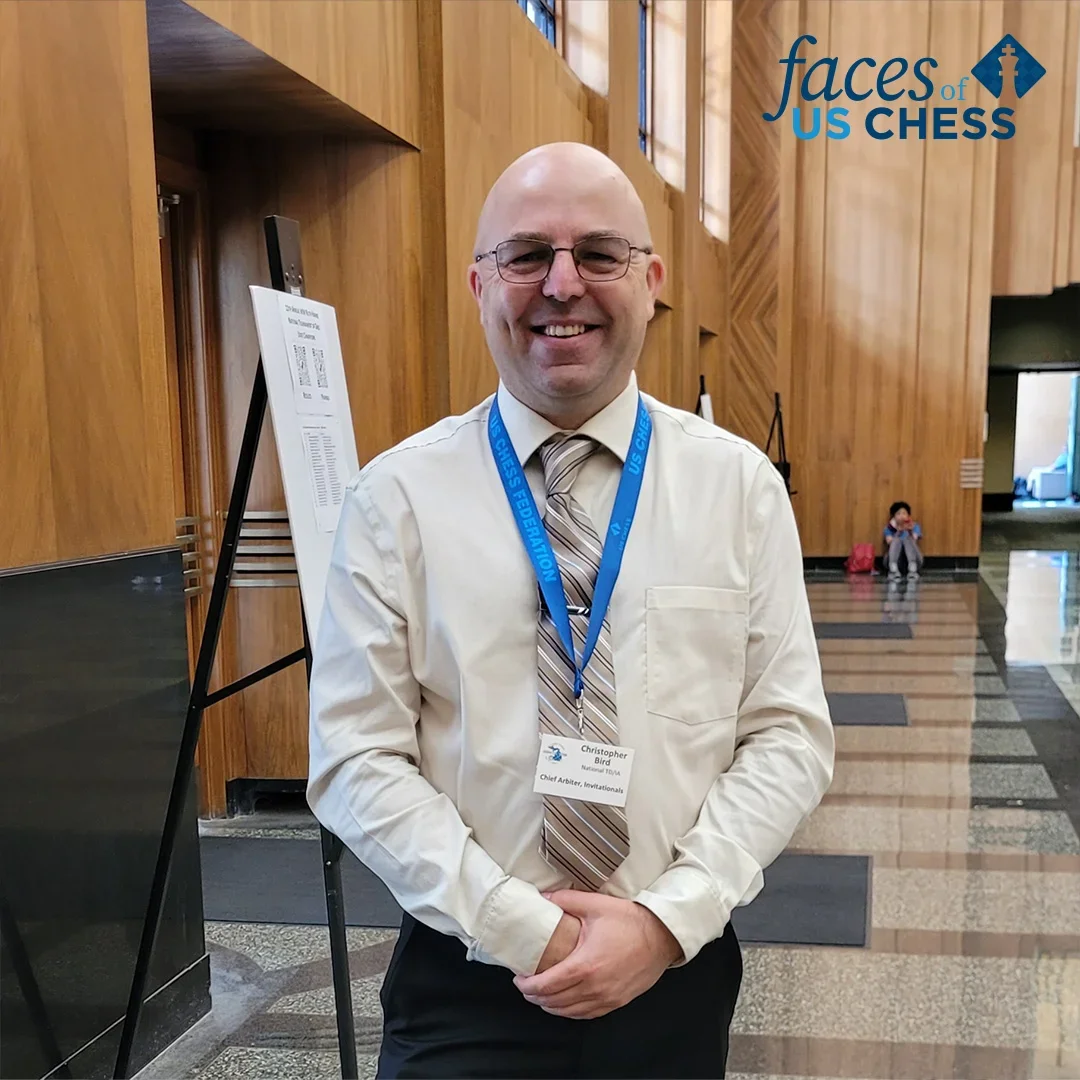
"The U.S. Open is a huge traditional event. It's one of US Chess’ longest-running tournaments: it's a national championship, and it's a qualifier for the U.S. championship, so we get players who want that prestigious spot. But more than that, the U.S. Open is like an annual pilgrimage for a lot of people. So many are involved with US Chess: on the political side, on the volunteer side. There are those who have been involved in chess for years. They all want to help chess get better and US Chess is the mechanism we have to do that.
Every year we see old faces, new faces. Once people have experienced the U.S. Open, they usually want to come back as often as they can. The invitationals are also important because they bring together the best of the best from each of the states. Some states don't have huge chess programs, so the invitationals offer a unique opportunity for states to select a state champion to represent them at a national event. These players get recognition here that they may not otherwise get — they are recognized as the best that the state has to offer. It really is great to have it all together."
-Chris Bird, chief tournament director for the National Invitational Championships.
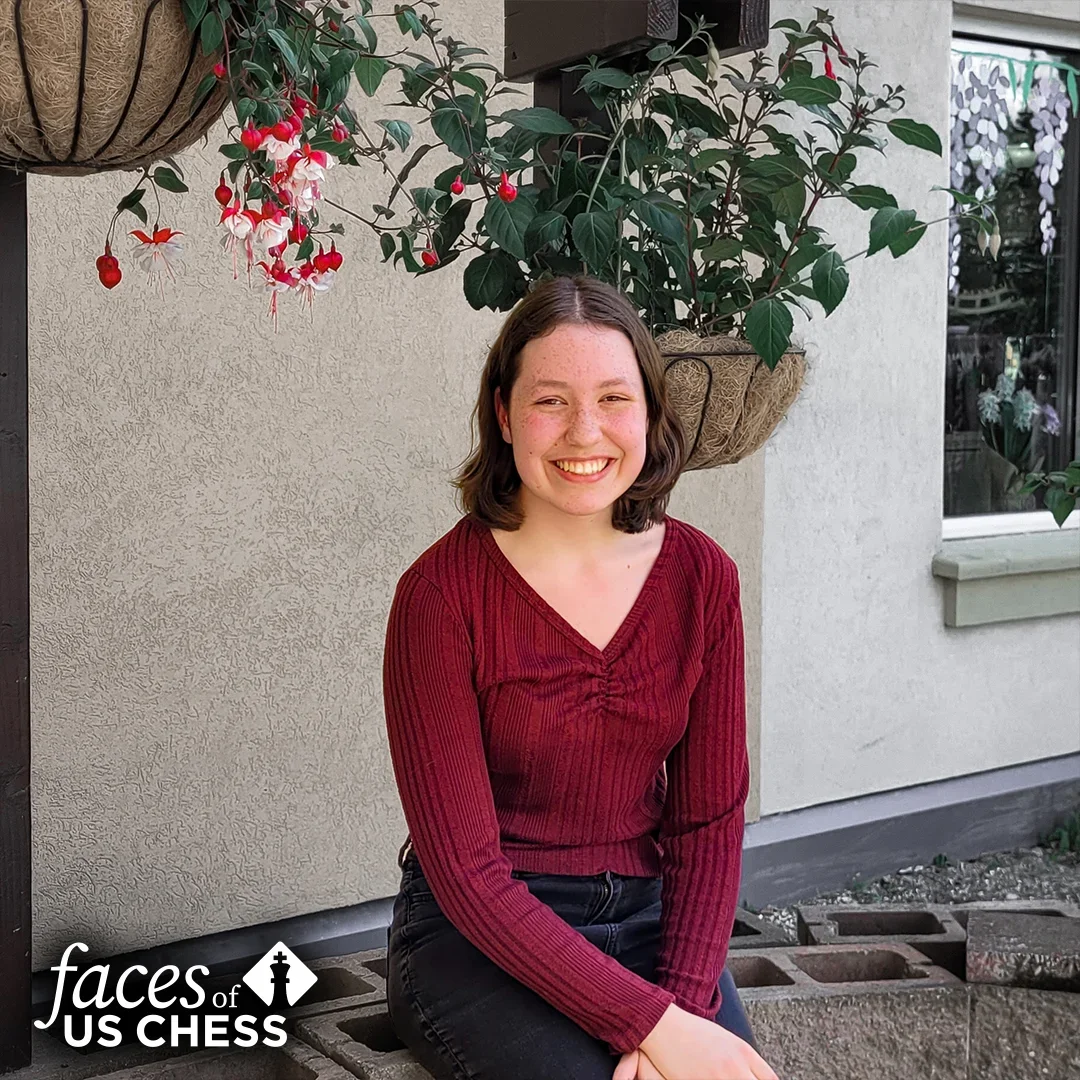
"I like that chess is skill-based; it isn’t variable or left up to chance. I like practicing on my own and knowing that if I practice enough, I can win. And if I don't practice, I won't win. I can measure how good I am, and I can be as good as I want to be. And I like that. I like knowing that getting there is possible.
I started playing chess when I was eight. I learned online from an app. Then I began going to the local club. At the time, it was just me and a guy named Eamon. I also joined an elementary school chess club and I was the only girl. I did chess in middle school, too, but again, I was the only girl. None of my coaches were girls. No one I played was a girl. And some people actually refused to play me because I was the only girl. Looking back, I think I know why — they were afraid I would win. But back then it felt different.
The only girl I ever played in a tournament was at the Alaska state tournament three years ago. It was great. When we saw each other, we were so excited. So when I got to high school I decided to create a chess club for women. I still run that one. And now, at the Fairbanks Chess Club, when a girl walks in, I’ll go up and shake her hand and welcome her to the club. Sometimes I'll play her. Basically, I try to make her as comfortable as possible. I know first-hand that women can be sometimes uncomfortable in a male-dominated room. I want their experience to be different from mine."
-Evelyn Mills
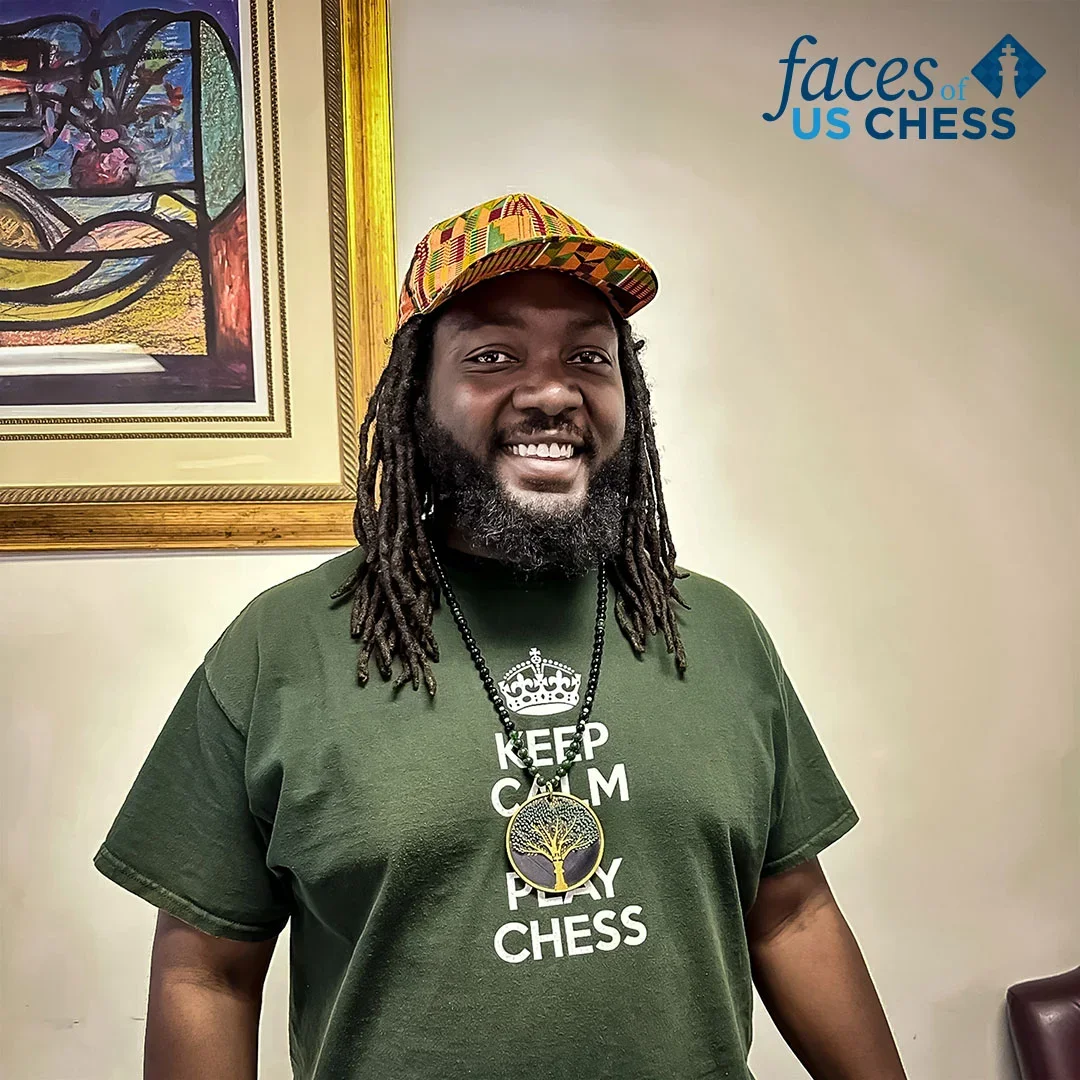
"I started the Royal Oak Initiative (in Columbus, Ohio) in 2014 to focus on certain demographics that don’t always find safety in traditional chess spaces. We concentrate specifically on black and brown communities, making welcoming spaces for women, and using chess as a mentoring tool for reaching young people. We go into schools, libraries, and recreation centers and provide chess programming. We work specifically in Franklin County and central Ohio to make sure that every community member learns how to play chess. I tell people, “You don’t have to be good at it, but you should know how to play.”
In 2019, we started doing meetups at the Upper Cup coffee shop. Probably the coolest place to play chess in Columbus. Then the space across the street became available. So we turned that into what we call the Cooperative Chess Cultural Center, a/k/a the 4C — we call it “The Fork.” We have meetups there twice a month, and it’s like a family reunion. We welcome all skill levels and backgrounds. And we do different cultural events, like chess and art, chess and poetry, chess and yoga — all sorts of ways to get people connected to this idea of holistic wellness and living.
It's friendly and fun, but it's really about connections. It’s about culture, it’s about community. But also, we’re creating a pipeline. We’re creating a shift around what it means to really be able to compete. A lot of us play casually, but we don’t always have the resources, the instruction, the guidance to take our game to the next level. Because when you look at the highest level of chess, there’s a drastic underrepresentation of people of African descent.
We really want to build up the culture. But we have to start with the cultural seeds and plant them. A lot of people are like, “Oh, I'm not smart enough. I'm not patient enough. I'm not…enough to play chess.” And we always remind people, “You are enough to do anything you want in your life.”
-Ernest Levert
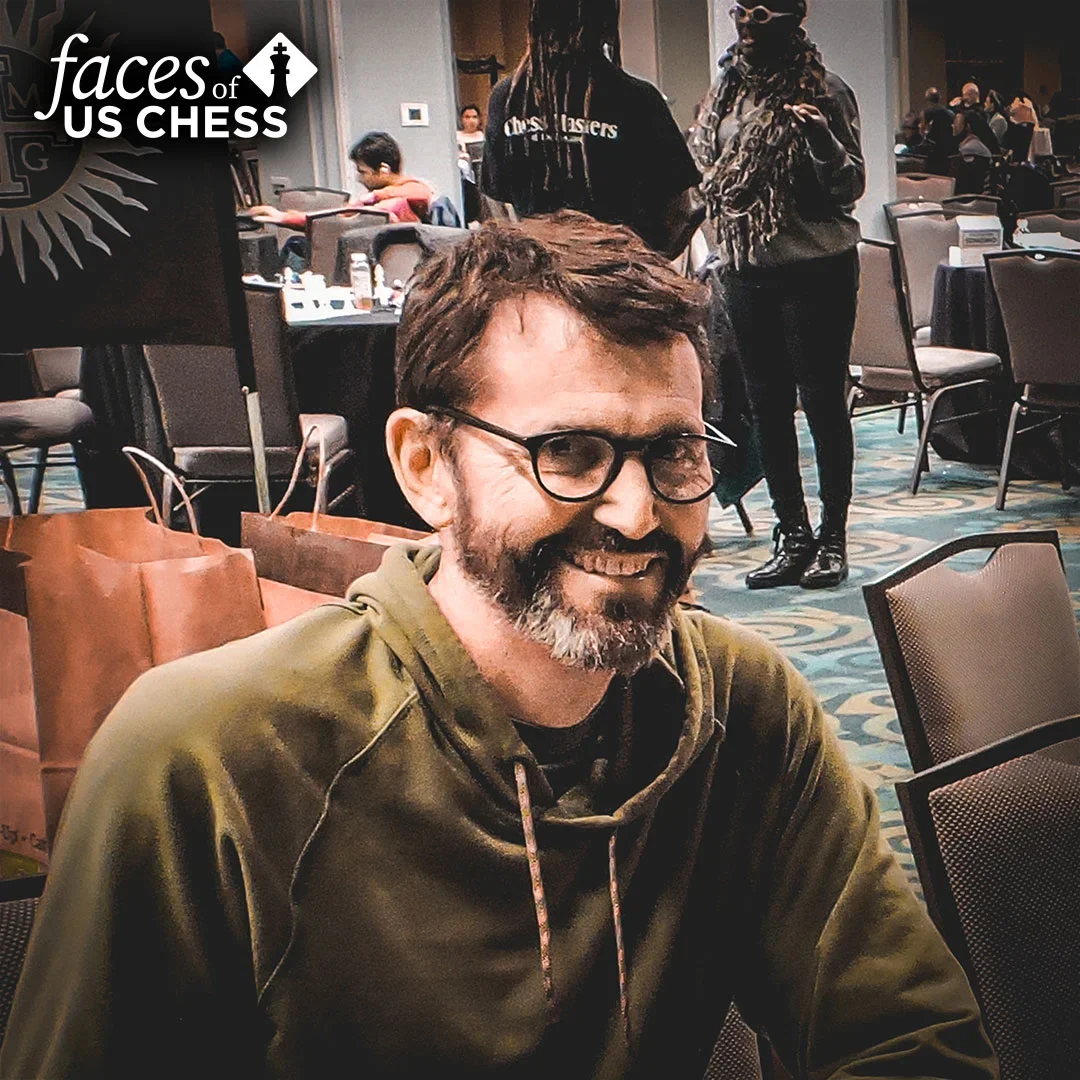
"Chess has been part of what I do as a teacher — it’s an extension of my job that I really enjoy. I’m in my 28th year as a teacher, and I’ve been playing chess for about 30 years, so it’s helped me keep teaching from becoming routine. And I also believe in competition, so I like getting the kids to tournaments no matter what the results. I think the right amount of competition is good. It’s a valuable part of high school. When Henry and Zachary were my students and were in the BKCL — the Baltimore Kids Chess League — we ran some local competitions and that was nice. But since Miss Christina Heffner has taken over, the amount of funding she’s been able to get allows us to do more things, and I’d really like to see that continue. And I’d like to expand into more high schools, develop teams, so we can hold more local tournaments and inner city high school competitions. At first, we were just growing a community. But now we’ve had some successes and that’s been good. We’ve had new experiences, too. Like last year — the team traveled to Tennessee, and for a number of the players that was their first flight, their first time off the East Coast, their first time out of state. We went to the Civil Rights Museum in Memphis. We dipped our toes in the Mississippi River." - Sean Kennedy
"Zachary: Mr. Kennedy got me started in chess. Honestly, just him. He was my American history teacher. I loved him as a teacher, and he was fun to hang around. So all my friends and I would go to his classroom during lunch and play a bunch of chess and it was fun. It was more of a social club back then. We just went to hang out with friends.
Henry: … for, like, all four years of high school.
Henry: We’ve all graduated (Zachary in 2019 and Henry in 2020), but most of our team keeps in touch.
Zachary: Yeah, we still talk a few times a week. We have a chess group chat where we send our games from Chess.com and we make jokes and such.
Henry: And when we heard that this tournament was happening, we figured since we live nearby, we could come down.
Zachary: We were both off school and work…
Henry: …so we’re here going over games with some of the current players but also just hanging out, catching up.
Zachary: I enjoy seeing where the chess club is today. When I was in high school, we didn’t have opportunities to go to tournaments like this or travel to Tennessee for SuperNationals or anything like that. That was that was unheard of.
Henry: I agree completely. To come in here and see how passionate everybody is…it’s pretty awesome. To see that people like Mr. Kennedy are still doing a good job and to see everybody coming out to play in these tournaments… yeah, it’s great. But even though we didn’t travel like this, chess did give me a community in high school, which is so important.
Zachary: Yeah, 100%. And I can see that in these kids right now. They’re very close. Exactly how we were in high school. We were extremely close. Now I am working as a firefighter, so chess doesn’t really play a role in my day-to-day life anymore. I don’t really talk about it too much at work. But chess played a big role in my life during high school. And I can see that this club has definitely brought people together. That’s really cool." - Zachary Goldberg and Henry Ryle
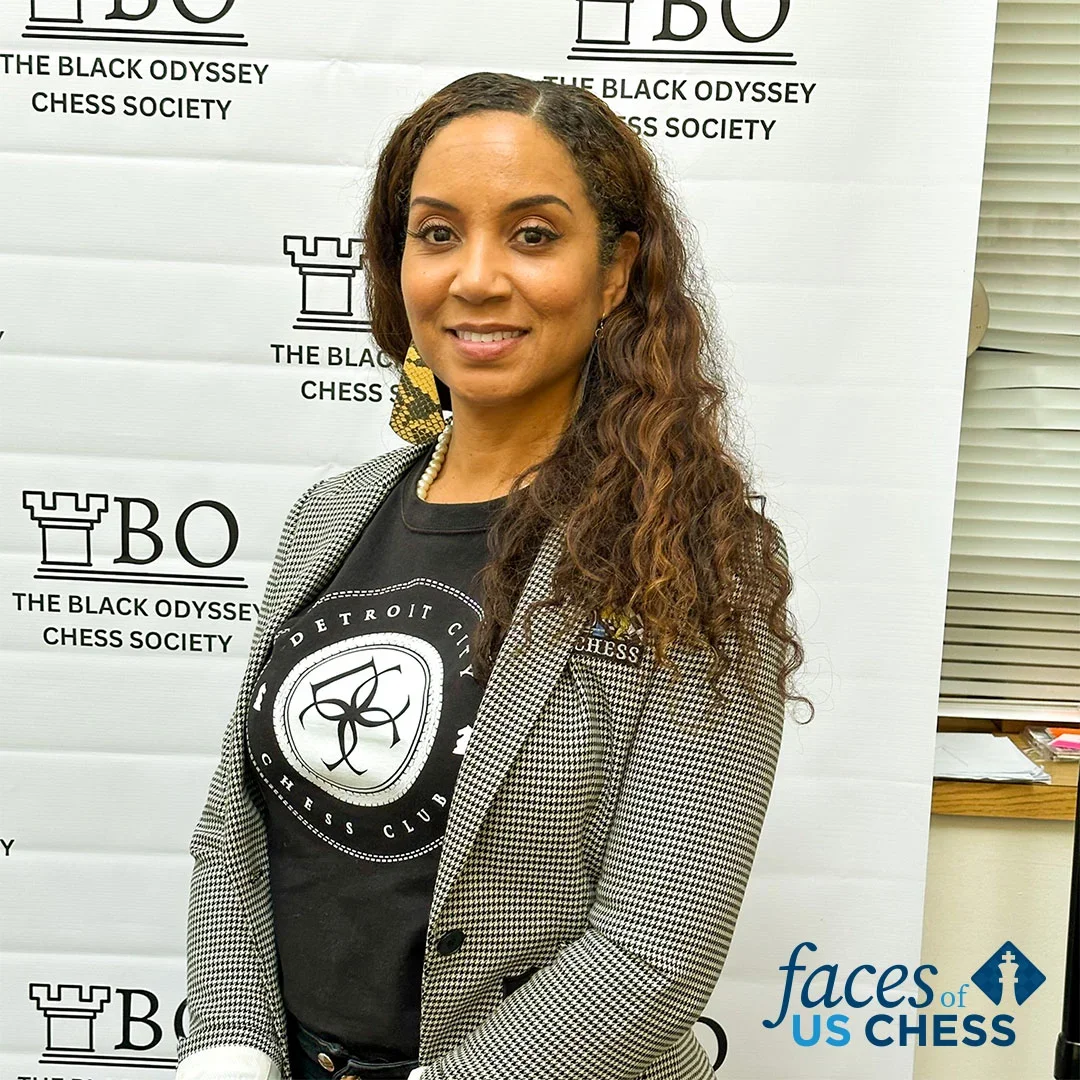
"In 2008 we were going to [the All Girls] nationals in Dallas. Our flight was set. But when we showed up at the airport, the airline had gone out of business. So we had no way to get there. Somehow our plight got on the news, and other airlines began jumping in to help our kids. And we were able to make it! We got there very, very late, but we made it. And the kids did well. So in the face of adversity, they learned a great lesson.
Another year we had a group of five girls that went to All-Girls. We had a regimen of studying the games after each round, doing this meditation-type practice, then resting before going back in. We kept the girls totally focused on the game. And so, at the award ceremony, when it was announced that they had won, they were completely surprised. It was one of the purest moments of our program.
We tend to lose students right about late middle school, early high school. That’s partly because parents are starting to look at college options. So they're looking at sports. Sports trumps chess, because there aren’t a lot of scholarships for chess. But considering the impact that chess has on the way you think, memorize, all of that — that helps in college, and it’s just crazy to lose them right at that time.
This is my 20th year with the Detroit City Chess Club (DCCC). Oh wow. Decades, right? I get to say for decades. When my kids started [at DCCC], it was very small, just a couple of kids from a few schools, maybe like two or three schools. And then the club grew, and I really fell in love with it. Our coach and founder, Kevin Fite, is the most consistent and passionate person I've ever met. So it's a pleasure just working with the program.
I always say I'm the VP for the club, but VP stands for Volunteer Parent. We take pride in working in the Detroit metro area, in underprivileged areas that need critical thinkers. Schools focus on academics. And then there are extracurriculars like music and arts and sports. But not everyone's athletic. Everyone's not artistic or musical. But everyone can think. So we take pride in teaching our champions how to think — and that translates to other elements within life." - Catherine Martinez
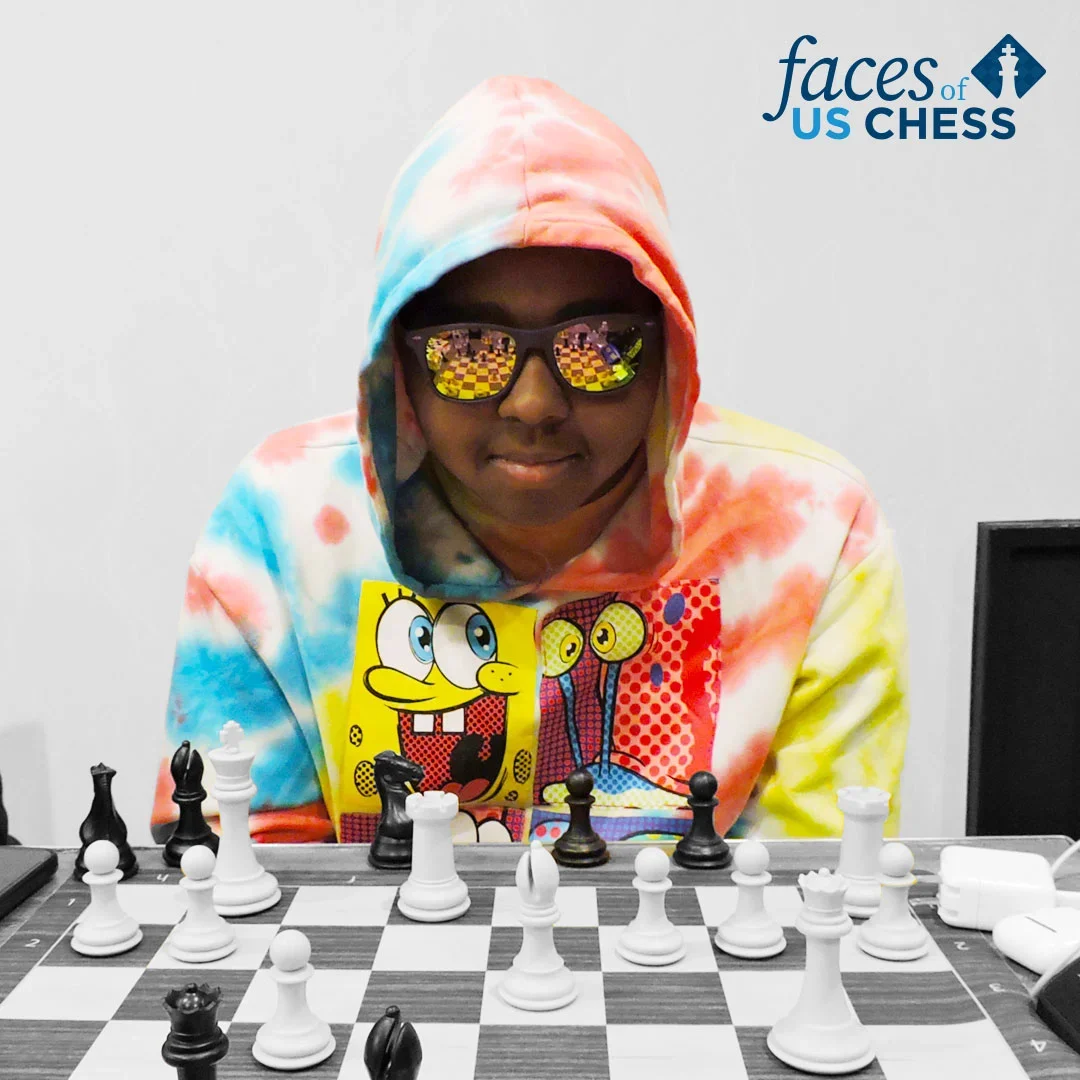
"I have been playing chess for about a year now [but I’ve played in over a hundred tournaments]. I started off with my middle school chess team in Louisville, then I kind of played the game on and off for about three months. I played my first tournament in December of 2021, somewhere around there. It was a scholastic event. My team got second place but I think I got, I dunno, maybe two points. I lost half of my games. But still, I liked it so much that I continued to play.
Chess was still something very new for me. I had never been to a chess tournament before, and I'd never been to a tournament in general. But I started going to tournaments basically every week. I would go to any tournament that was available, like on Thursday nights, Friday nights, even Monday nights.
I don't really have any tournament superstitions, but I sometimes worry, “What if I'd played bad and I just wasted all this money for no reason?” I still go though, to chess tournaments, because I just like how you have to always be on your toes thinking. You always have to consider what your opponent's about to do. So, I go to the tournaments, and I meet new people through chess. That also keeps me interested. I never have trouble finding chess games and that’s pretty cool."
-Jengsse Perez
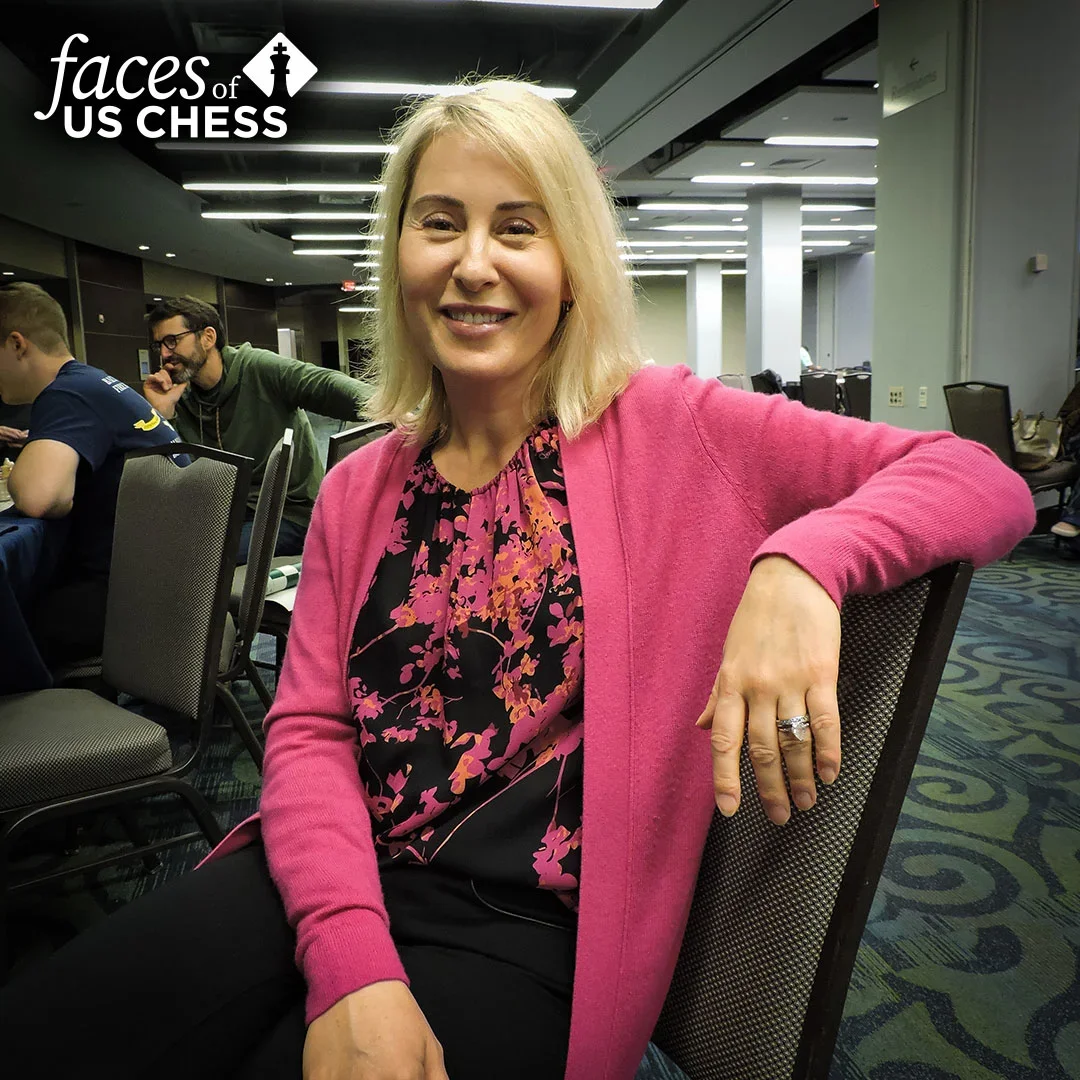
"When I was a child, it was not common for girls to play chess competitively, so my brother was the one who competed in chess. My dad, who’s a chess master, taught me the basics, but otherwise I sorta learned on my own. So, there was never a question in my mind about teaching my kids to play chess. I believe in chess. So, I introduced my sons to chess when they were about seven months old, using the pieces as toys.
Now I am on the board of directors for the Baltimore Kids Chess League and my son is playing chess here at the National High School Championship with his school, Hampstead Hill Academy. He has also played tournaments in Florida, in Columbus, at Gaylord and now here in Washington D.C. And when he makes friends in Florida, he sees them online, again in Columbus, and so on — there’s this connection across state lines. The connection does not end with the tournament. It spans schools and states and time until he sees them again at the next tournament. He really enjoys that.
Chess gives kids an amazing social environment, but the benefits of chess are multifaceted. It contributes to their logical thinking because they need to think several steps ahead. And it teaches them to slow down and really consider their next move, several times before deciding. It improves critical thinking and decision-making. And that translates into their career — when they get a job or when they need to change jobs or even reconsider their career. It teaches kids it’s not just about today, but about tomorrow and after tomorrow.
I hope to help the league grow so chess is available to more kids in the area and beyond, including girls. I'd definitely like to see more women in chess as we break the glass ceiling. Just looking around here [the tournament hall], I see a lot of boys and not as many girls. We don't have enough girls in the community. And if I had a girl, I would teach her chess and I would support her fully. I believe in chess for all."
-Anya Cappolla
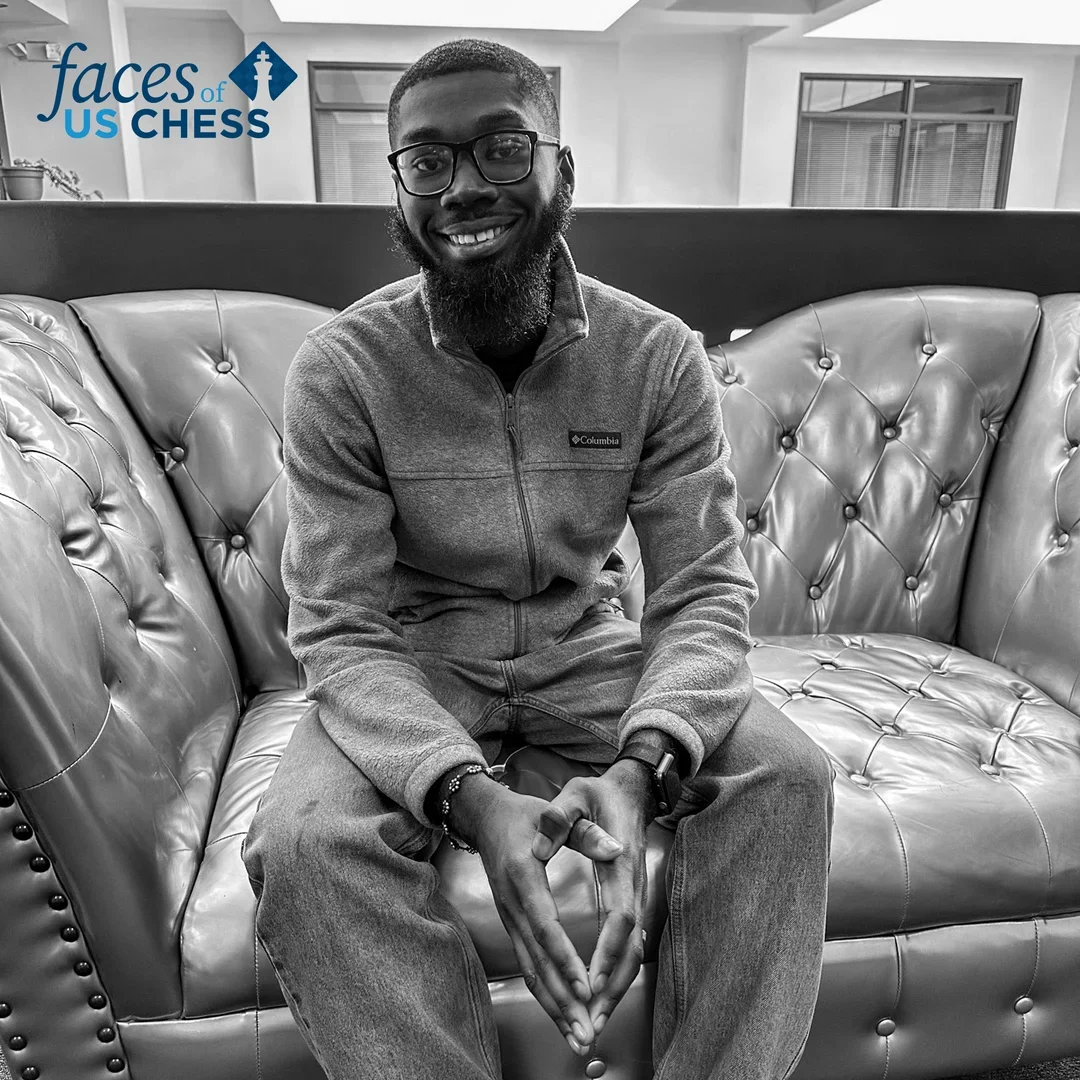
"In some ways, I owe all of this to a middle school teacher who was an avid chess player. He taught me, he saw something in me. Now chess is a staple in my life.
I went to a predominantly Black high school and middle school. When we went to [chess] tournaments around Brooklyn, Manhattan, the Bronx, etc., I noticed that we were often the only Black school. After I began playing in collegiate tournaments, I again noticed there weren’t a lot of people who looked like me, that very few Black universities were in attendance.
So we [Alan and co-founder Shaniah Francis] launched [The Black Odyssey, a 501(c)(3) nonprofit] in September 2022 after recognizing that HBCU chess programs historically are severely underfunded or nonexistent. What Black Odyssey (TBO) does is provide resources, like access to master-level instructors. We also want to serve as a bridge between HBCUs.
In December we decided to organize the HBCU Chess Classic to promote TBO’s mission, which is to push Black students to be better critical thinkers through chess. Shaniah — who’s incredible at outreach — was the one who reached out to Maurice [GM Maurice Ashley]. He responded, “Heck yeah, let's get this going!” He’s been instrumental in this whole process.
At our core, TBO is about teaching skills on and off the board. The classic is just a catalyst to let HBCUs know that we're here. We also serve as that bridge — we've gotten nine HBCUs from all over the country to come together to play chess.
We have a beautiful roadmap to guide us. We've laid out the structure, so the individuals who take on TBO will be able to maintain the Atlanta University Center chapters. And we’ll be taking on larger roles after we graduate to ensure that TBO is on other HBCU campuses as well.
All we can do is just push and push and push and make sure that the HBCUs have the options and the resources, so they can be a part of these spaces. It’s a beautiful thing when you have a concept in your mind that works within the framework of your life."
- Alan Cowan
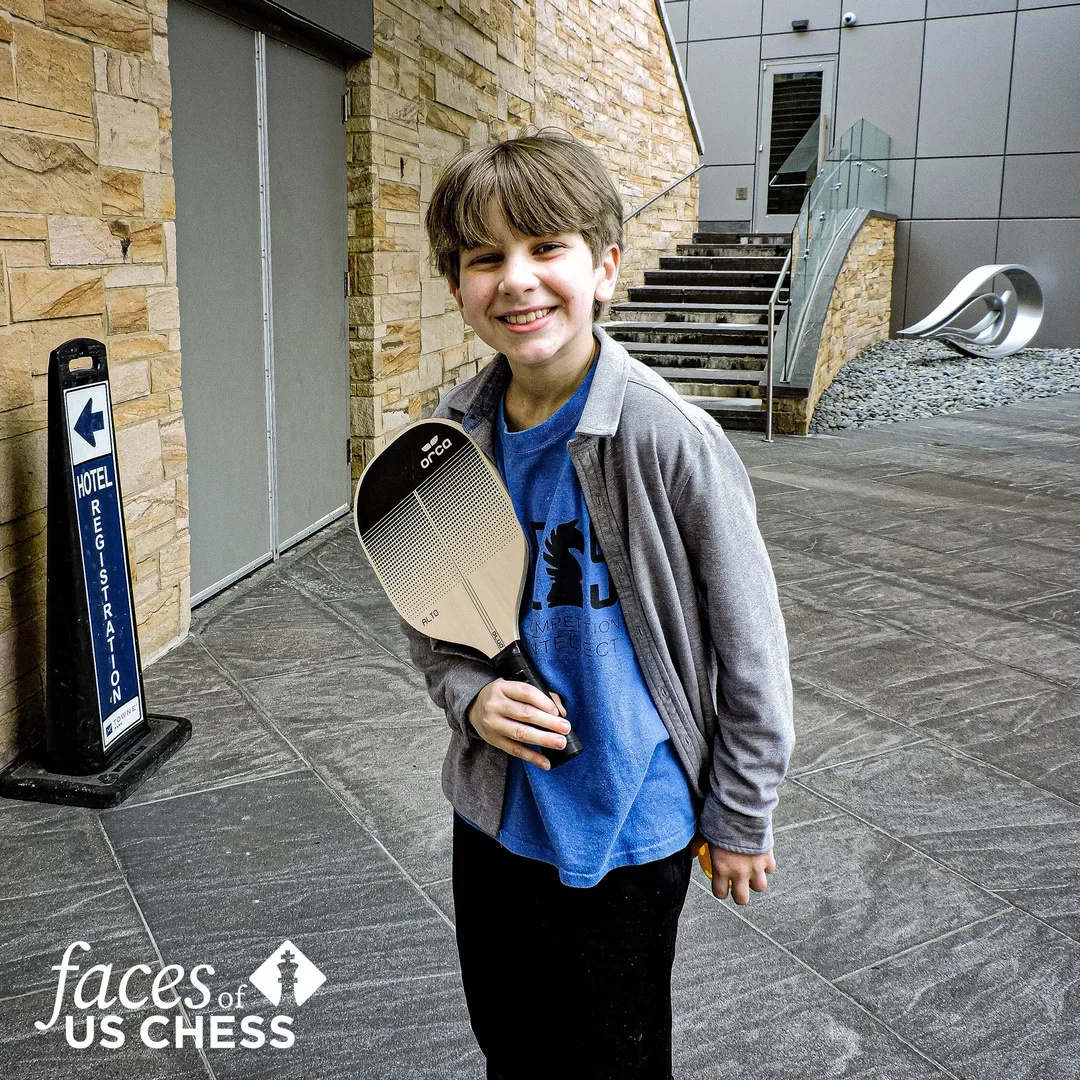
"Earlier today I was playing a simul with GM [Rashad] Babev. There were a lot of people higher rated than me. I may be wrong, but I think I was the only person who drew him. I think everybody else lost. I was up a pawn in the end. But, you know, he is a lot better than me. I said, “I don't want to risk losing that.” So when he offered the draw I agreed. Oh, I was very happy.
I think I would like to be a professional chess player, though I recognize that it is unlikely. I have a lot of work to get there, but I'm trying. Yeah, I'm trying. We're from Chicago, which has a strong chess community. There’s a team at my school, Lincoln Elementary, and I'm on that. There's also a lot of different chess-related things such as meet-ups where you get to interact and meet some other fellow chess tournament players. It's just for fun, you know, playing chess, but I get to meet so many great friends.
It was definitely my dad who got me into chess. He just thought that I was so good at other types of — well, decent at — other types of games. Like I was beating him at tic tac toe and stuff like that. And he was like, “Oh, you should try playing chess. It could be fun for you.” He was right.
One of the most challenging times that comes to mind was when I was in Columbus playing nationals. Before my fourth game. I had won the first three and I was super excited but I lost that game. And I was just thinking like, “What if this keeps happening?” and then I kind of got discouraged. I wanted to quit at that point, but I'm happy I pulled myself out. Well, my family helped – my dad and sister called and encouraged me. And I got ice cream with my mom. They, my family, made me so happy. My family is the best." - Aidan Baker
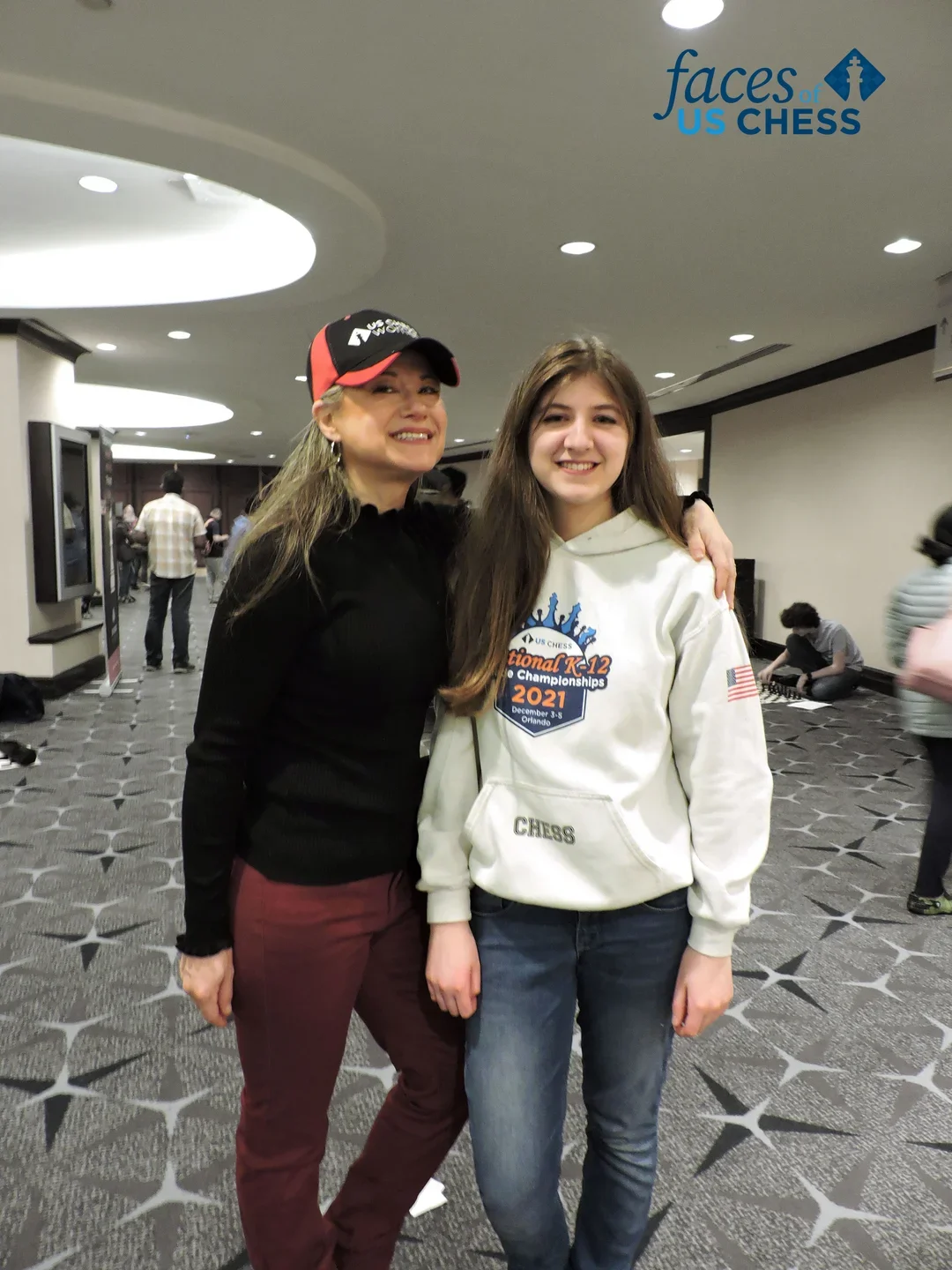
"Chess has given me a really cool culture that I’m proud to be a part of. It’s been a place I can write, a place I can play chess, a place I can connect to other people. There are so many parts of the chess world that are cool — some of them aren't even about chess.
I go to St. Luke’s School in Connecticut where I captain the chess club. We have tournaments, play events, and have a league. I like the camaraderie. It’s this lively atmosphere, and it’s always great to travel to tournaments, go to blitz tournaments in the middle of the night, and go to big events like this [the 2023 National High School Championship]. I mean, getting to play at nationals — just getting to play — and helping out with Girls Club has been cool. I’ve also been able to write about chess. I wrote an article on the Invitationals for Chess Life Kids. And now I’m singing at tournaments. It’s a collision of all my interests!
Last year I was in L.A. doing a songwriting class. And then [US Chess] sent an email [looking for someone to sing the National Anthem at the U.S. Open]. I was planning to be there playing, so it fit kinda perfectly. When the email came my mom was like, “Do you think you could just throw your rendition into my phone?” And I did and they took me! It was very, very, very exciting.
They asked me to sing again for this tournament. We were already in the car driving and they're calling. The singer got sick, so they’re asking if I want to do it. Yes! But there was no time — I didn't have the right clothes. So my mom goes to the outlet mall next door and is banging on doors saying, “You open? You open?” I grabbed something and ran up there and…yeah, and it was pretty much last minute.
I’m also proud of the service organization I founded, Chess in 1 Day. We go to libraries and teach kids how to play chess in one day. Our instructors — we have different people each time – are all teenagers. We teach kids and families. We teach families because families teach the kids, and that’s important, too." -Laurel Aronian
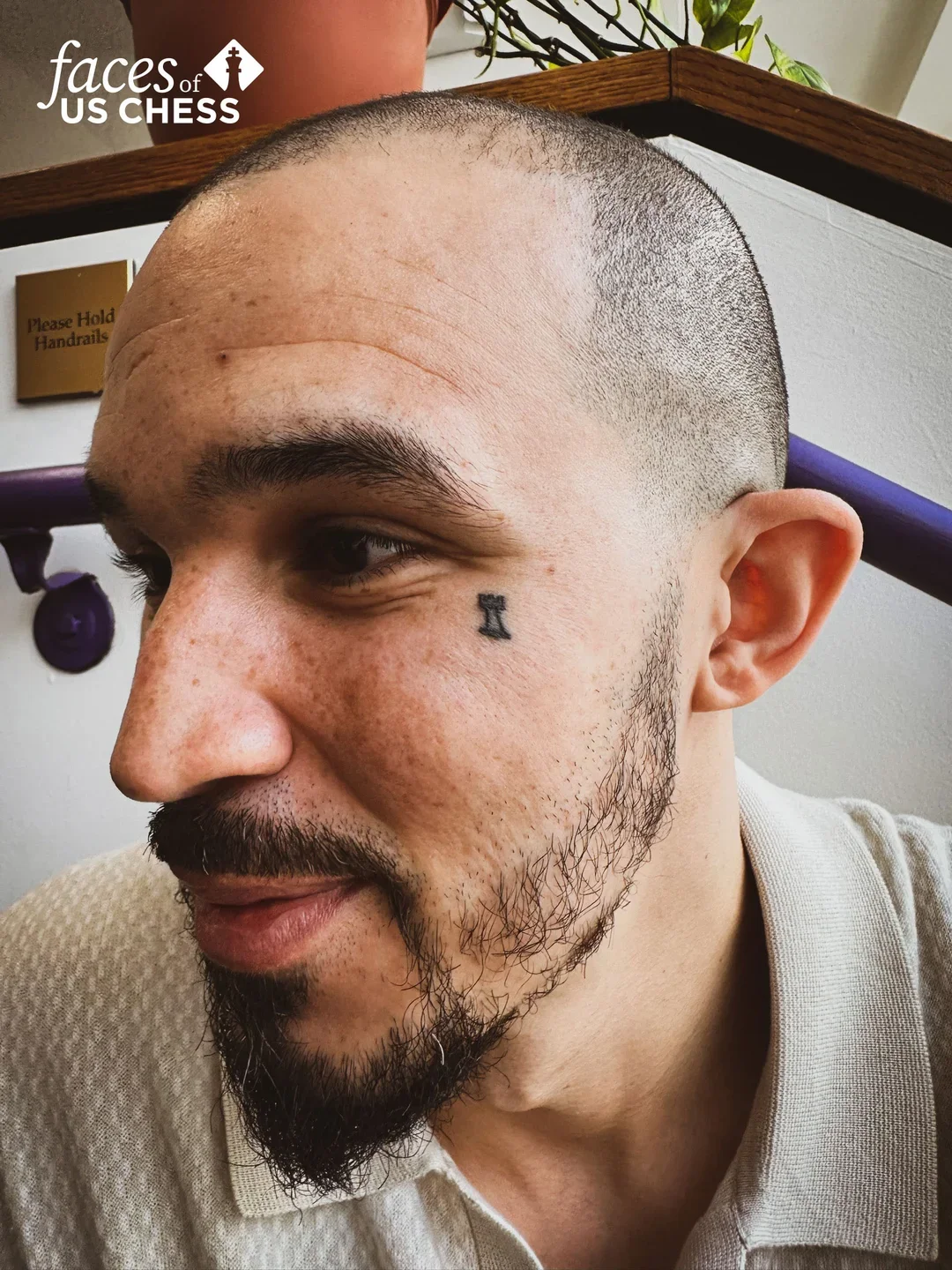
"I’m one of those guys who fell in love during “The Queen’s Gambit.” I was texting a young lady I was interested in and I was asking what she was doing. She’s watching “The Queen’s Gambit.” I had no idea what it was. I googled it. I saw it was about chess, so I ordered a chessboard ‘cause I wanted to ask her on a date.
I don’t talk to the young lady anymore. But I absolutely fell in love with the game of chess. So she wasn’t the one, but the chess was. One hundred percent.
I learned the moves and everything like that in the seventh grade. But I didn’t play. I’m a lifetime video gamer. I went to Georgia Tech for computer programming. I love figuring things out. But my second stint, as an adult getting into chess — it hit my brain completely differently. I was playing all the time. I brought a board to work, I was playing on my phone. My good friend is the owner of the Anguished Barber [in Atlanta]. And I’m playing on my phone while he cuts my hair. He was, like, “Move your knight, move your bishop.” I’m, like, “Please don’t mess up my haircut.” And that’s when I found out he loved chess. I said, “We should do a chess night here. It’s on brand.” They have a really cool craft cocktail bar connected to the barbershop. And so that’s how it started. That’s when I started our first chess club. It was January 12th, 2021.
The very first chess meetup I had was five of us all together, and it slowly turned into what I call Checkmate Mondays. There hasn’t been an over-the-board chess scene in Atlanta where it’s cool to hang out or things like that. And it’s my proudest accomplishment, the community that we’ve built by making chess cool. I’ve had grandmasters, international masters pull up. I’ve had people who are just learning for the first time. Sometimes I just want to go hang out and be around a bunch of people who have some common sense. I say I haven’t met a chess player I don’t like. Everybody’s got their head on their shoulders — at least a little bit.
After a while I started organizing tournaments on Monday and Tuesday nights. They were mostly free to enter — the winner would get bragging rights and a bar tab. And then I started doing quarterly cash tournaments, double elimination, bringing people together, and they’ve drawn a crowd. The news came out one time and covered it. Now I have a new venue for Checkmate Mondays. We’ll be moving to Holiday Bar in West Midtown, which has this awesome outdoor space as well. I want to get the outdoor scene going.
I’ve got the opportunity to teach high school kids now. I love teaching the game and seeing what it does for mental health. I’m also really thankful a lot of the guys in the chess community trust me and respect me. Somebody in the community referred me to the people who were organizing this [HBCU Chess Classic]. I had no idea of the scale this was going to be. I didn’t know Maurice Ashley was involved. At first I was just, like, “If it’s chess, I’m down.” And once I started getting more details, I was nervous. I was nervous this morning [as chief tournament director].
My favorite thing about chess is that there’s nowhere else where you can see so many people from so many different walks of life all getting together. It doesn’t matter when they come to Checkmate Mondays — all that stuff goes to the side. This group of people, this community — you’re not going to see ‘em at a tea party or whatever. But when I talk about how proud I am of the community, that’s because I’m proud of the diversity.
If you’d asked me a couple years ago if I was I going to be a chess guy, I would’ve — well, I was still playing checkers. But now I’ve got a rook tattoo on my face. Oh yeah. I’m a lifer. I love the community.
I’ve always been a social person. I’ve been a bartender for about the last 10 years. After learning more about myself and talking to a therapist, I realized that I’m a giver. I get filled up by creating a space. I understand how much it means to people. It’s something that I love.
Sometimes I think, “I’ll just put the board out.” I’ll just go — I’ll go to the park, I’ll go to our Beltline. It’s a very popular walkable area and it’s amazing how many people just gravitate toward [the chessboard]. There are so many people that want over-the-board chess, but they just don’t know where to go or realize that there’s a community out there. But I’m a proud nerd. I love gaming, I love eSports. And I think with the rise of all that along with chess, now’s a better time than ever.
I’ve also started doing more rated tournaments and I’ve been working with my coach. He’s a local. NM Deepak Aaron. Yeah, that’s my guy. He’s really taken me under his wing. We had our fifth lesson yesterday and he wants to make me a national master and I just know I can do it. I’m hungry. Oh, I know I can do it. I know. I’m not very close. I’m still in my provisional games. But that’s my goal. People know me as the nice guy who brings people together and loves chess. Now I want to be the nice guy that you don’t want to sit across the board from."
-Seth Dousman
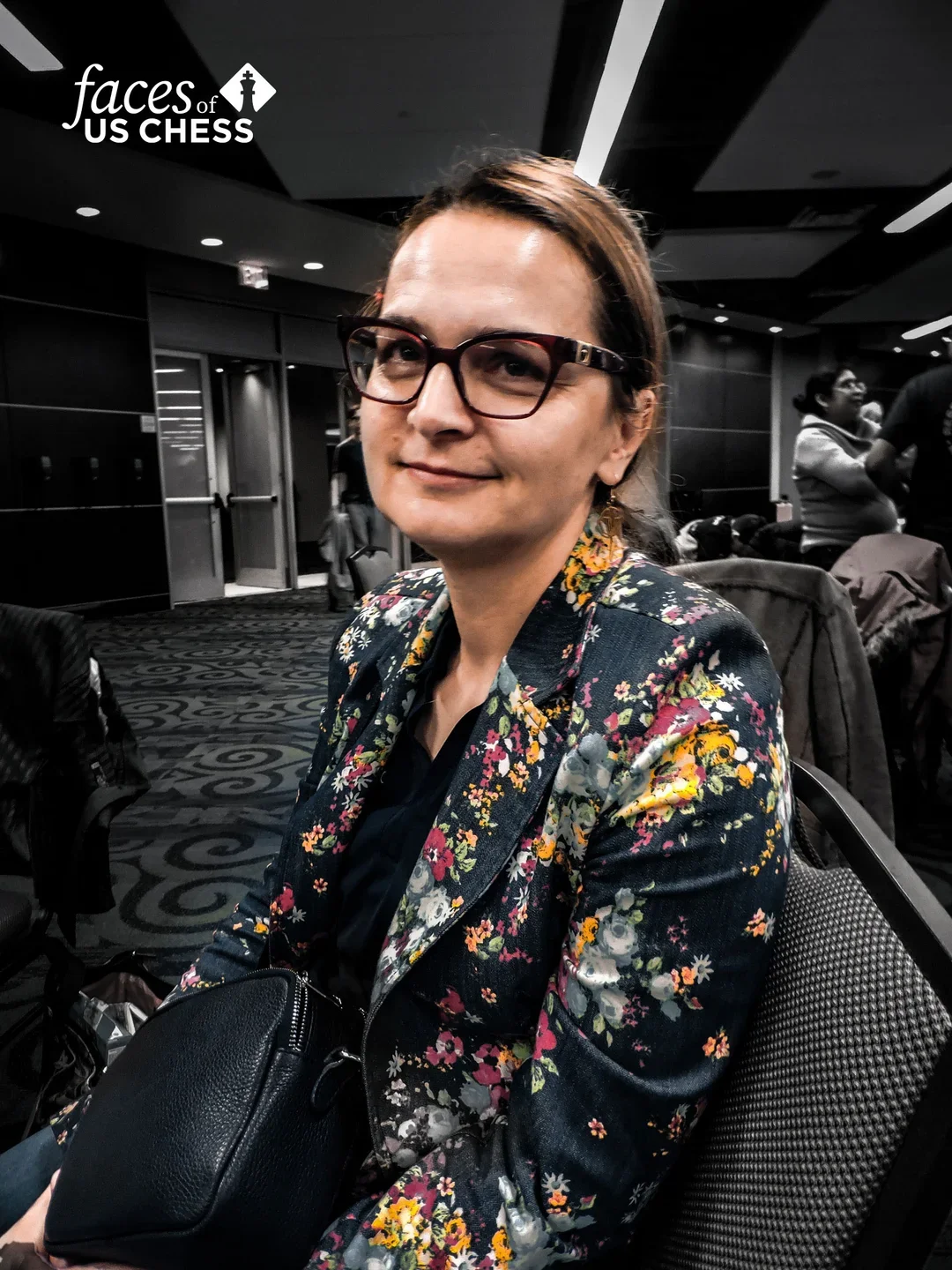
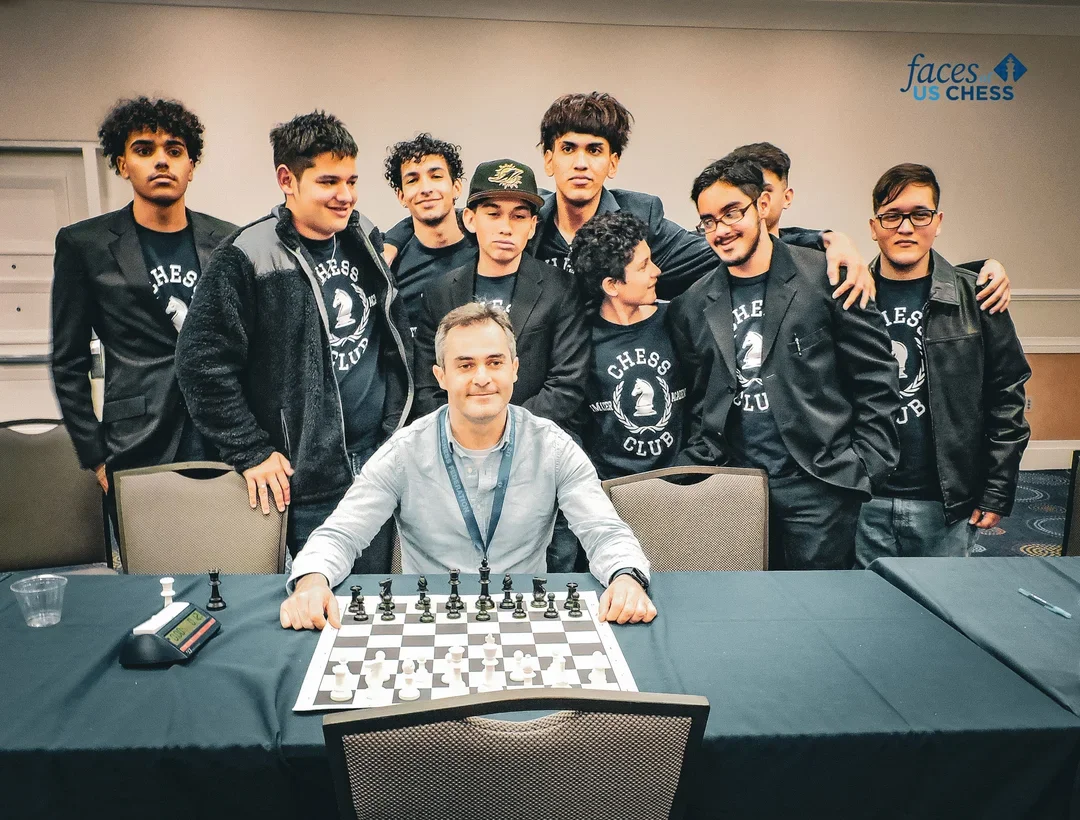
Last year we didn't have a chess coach. I really love math, but we didn't have a math club. So I said, “Okay, I want to be the chess sponsor.” We barely survived our first year. We had five to 10 players, but they were really good players and really good kids and really good students. So this year I said, “Let’s get more students who are interested in chess.” There was a club fair and we promoted chess there and had an amazing response. We got a lot of signatures and we ended up with 60 members. After this I wanted to do something else, something special for them because they deserved it. And I Googled — believe it or not — where to take high schoolers to play more challenging chess. There was one tournament in Seattle in January but that was too early and then I saw this one was in April. I said to them, “I want to take you to Washington.” And they were stunned, saying, “What, miss? What did you say?”
“Washington, D.C.”
“How?”
“Don't worry. Just play.” And now we are here.
We have received such amazing support. We use lichess.com that the Miami [Florida school] district sponsors along with our transportation costs. The rest was covered by my school, iMater Preparatory Academy High School. We have an amazing principal and they're very understanding so the kids and families don’t have to pay a cent. Otherwise, we would not have been able to make it and the kids would not have gotten to come here — they can’t believe that they are here [at the National High School tournament].
On Thursday there were a couple of side events here at the tournament — blitz and such, but I said, “No, no, we will not participate. We need to see Washington.” I told them for today there wouldn’t be any chess. It’s only cherry blossoms, the Capitol, Supreme Court, library, botanical garden, the White House, and the Lincoln monument. We saw a lot. I asked them, “What did you like the most?” Cherry blossoms. Can you imagine? The White House was right there, but I was taking them to the cherries and they were like, “Wait, miss, where are you going? The White House is there.” I put them under the cherry trees and it was amazing. If you know Hialeah [Florida] — it’s a really tough neighborhood. And you would never think of these kids under the cherry trees, but that’s what we did and that’s what they liked the most. I want to cry when I think about them under the cherry blossoms, but I can’t, because I want them to understand this is normal. They deserve these experiences, just like everyone else. And I'm so sorry that I cannot bring more kids, but you know, we are a Title I school and we don't have the money. So now I need to figure out how to fundraise.
These kids need to be here so they can see all of this. They need to go out and play other people so they will see other openings, other moves, and also other perspectives, things they don’t get exposed to otherwise. It's life changing. Some of them have never been outside of Florida. Some of them just arrived from Cuba. So they need to have the opportunity to see this. And I tell them, “Look. Don't just play chess. Look around, look. Enjoy the game — but also the moment — enjoy everything. Don't be closed off. Open yourself to different cultures, different people, different approaches.” Because teaching them chess — that's the easy part. But [teaching them] everything else — about life, about time management, how dedicated they need to be — [then] in future, when they get a job or go to college, they will know what to do. They'll be ready for life. Chess is a life changer.
-Kristina Zogovic
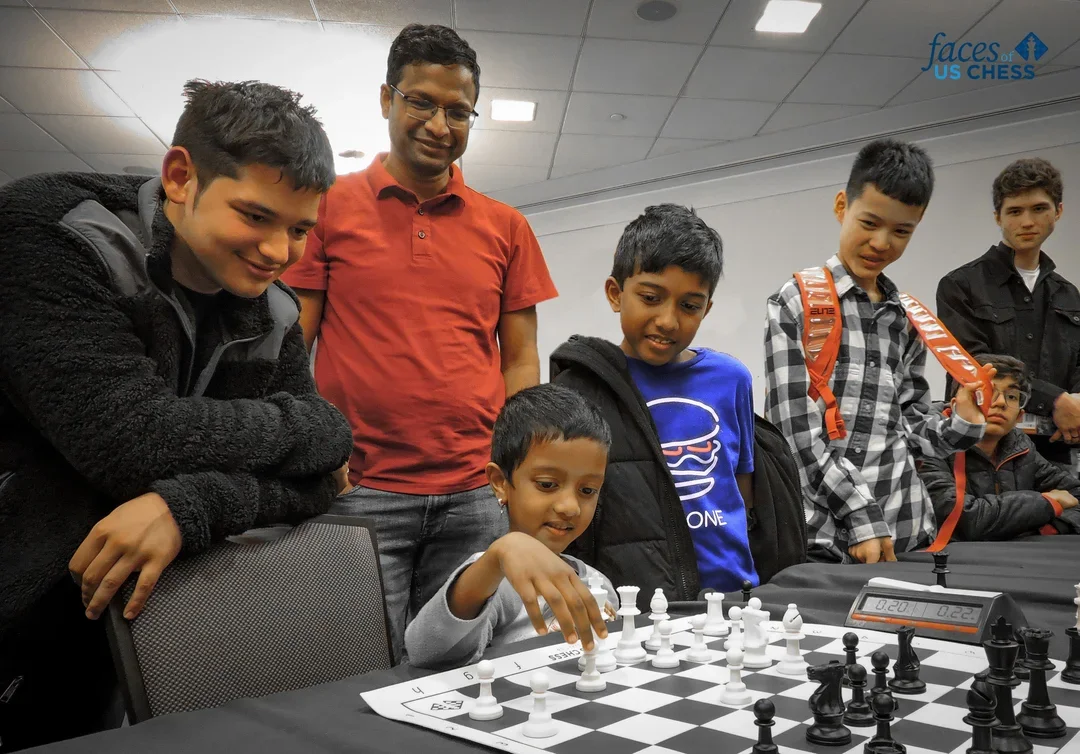
“She hasn’t played a full game before. I’m honestly surprised at how well she did. I didn’t know she knew how the pieces move. She plays on the app at home, but she hasn’t actually played a game with anyone before today.”
Shrika has just finished a full blitz game against GM Rashad Babaev at the All-Comers Blitz at the National High School championship. Her father is shocked. She’s five and her brother Tanish is eight. The family traveled to D.C. from North Carolina so Tanish could compete in the Under 800 section. Shrika was supposed to simply tag along.
“Who taught you to play chess?” I ask Tanish.
“My dad taught me. I saw this red box that said ‘Chess.’ Then my dad said, ‘This is chess.’ I was interested so that’s when my dad taught me.” Dad watches proudly, nodding his head.
“Is your dad good at chess?”
Shrika, without missing a beat: “My brother beats him.”
Tanish: “Well, when I started, he usually won. But now you know, I'm smarter than him, so I usually win now.” Dad laughs, but the nodding stops.
“Can you tell me why you like chess?”
Tanish: “Because it’s a brain game. It’s also fun to play, like, moving pieces and thinking, so I like that. Because I like to think. I like to think a lot. And I don't want any physical games. I want to use my brain. So I get smarter.”
“Which color do you like to play?” I ask Shrika.
“Pink and purple!”
“How about when you play chess?”
“White!”
“What’s your favorite piece?”
“The queen! She can go wherever she wants. She can take the bishop.”
I ask Tanish about his other chess experiences.
“I play at school and at a club. I go to Triangle Chess. That's a class. And I play with others. I play at home with my dad. He’s easy to play so I play with him a lot.” Then Tanish’s eyes light up. “And also, I play this new game called bughouse!”
“What are your future plans for chess?”
Tanish: “I want to do chess and be a grandmaster and play chess with other people.”
Shrika: “I want to be the best in the world.”
“I believe it! Who's your favorite grandmaster?”
Tanish, after a pause: “Magnus Carlsen."
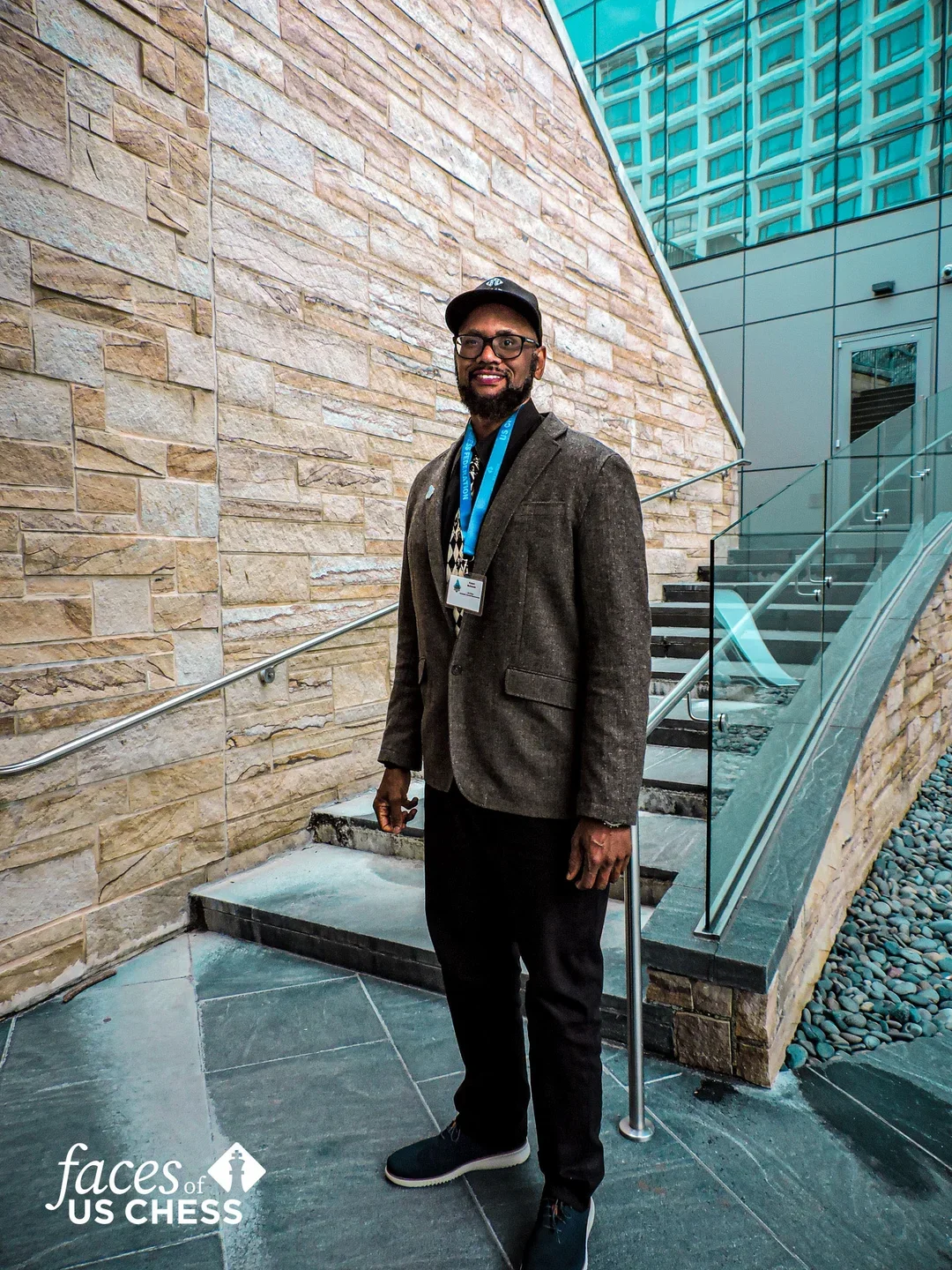
"My brother, who is like a superhero, was in the NFL. He would beat me at everything. He beat me at basketball, yes, even basketball. The guy could jump, dunk the ball backwards standing straight, run a four or five 40 [yard dash]. At the time he was probably 260 pounds, bench pressing 500 pounds. He was an incredible athlete, and he tells me that he's playing chess with the football players on the Cleveland Browns. He's really gung-ho about this: “You got to play this game, man. This game is awesome. It’s just like football, you know, the quarterback is [the] king.” I’m in college at the time, doing [an] education major. And I said, “Okay, I'll try it, I’ll give this game a try.” I taught myself how to play on this old Packard Bell computer that had maybe 256 megabytes of memory total, but could somehow play chess. I learned how to play the Ruy Lopez on it. To this day, it might be the only opening I know well, the Ruy Lopez from a 1994 Circuit City computer. That's how I got into chess. And I just fell in love with it after that. So, my brother and I started playing back and forth. I remember thinking, “I know I can beat this guy. I gotta beat him at something.” I got a book, Samurai Chess by Michael Gelb, which was about chess and martial arts with some strategic games. I read that book and I beat my brother nine games straight, but he somehow won the 10th game. I think it was 1996, because we had been playing for a couple of years. He never played me after that, ever again, to this day.
I think I'm around 1700 now, but my claim to fame is when I won a big tournament we have in my hometown called the Turkey Bowl. Once I won that, I was, like, “I’m the man!” It was so hard to win it — it was, like, my fourth try. I won a trophy and around $500. Everybody in the club was beating me bad before that. But then I got so much better from doing my puzzles and reading and stuff like that. And I won, finally. It was the under 1600 section, but to me it was like the championship of the world. My family bought me a cake and we celebrated. I took two days off work. I cried. I look back on it and it was so stupid and so dumb. But it’s also when I finally felt I was good enough.
After college I started teaching and the kids are coming into my classroom because they want candy. But one day I don't have any candy, so I say, “You know what, I'll teach you guys chess instead.” They begin learning chess and, you know what, these kids start doing better, having a better attitude. I started seeing the power of the game, how it could help these kids. And so I researched the game. At that time, I had [been using] my one little board until I wrote US Chess and they sent me five chessboards back in 1997 or 1998. Those are the five chessboards that I used for many, many years to teach our kids and take them to the local tournaments to play.
Around that time, I was looking for this man that I heard taught chess to kids in the library. I thought, “This guy, this old dude in El Camino, when I find this guy, he’s going to teach me all the secrets of chess. I’m going to learn everything from this guy.” I finally catch up to him after many weeks of trying. We play about 14 moves and it’s checkmate. But he's not checkmating me; I'm checkmating him. So, we play again, you know, same thing. This time I checkmate him even faster. Then the third game, same thing. I thought, “This guy can't play. This guy’s no good. Terrible.” But today when I think about this guy, tears come to my eyes. I realized what is interesting and profound about this story is that this guy had these little Black kids around him and he was teaching them how to play chess. He was really teaching them. He was out there doing it. But I was not at the time. I was too afraid that I wasn’t good enough to teach. But this guy showed me all you had to do was to believe and have some passion. I had a Last Dragon kind of moment — that’s my favorite movie — where I said, “I'm going to be my own master. I came here looking for someone to change the world, but I have to go out there and make things happen. I’m going to start my chess club, and I'm going to teach kids, and I'm going to do the best I can.”
And before you know it, I'm teaching chess. I'm teaching the whole school. I'm teaching chess to anyone that I can. I'm like the Johnny Appleseed of chess, trying to spread chess to everyone. At this time, I was teaching at a D elementary school — in Florida they rate their schools — maybe in 2012 or 2013. I'm teaching some little boys. These kids are really rambunctious, heavily challenged behaviorally. I'm trying to calm them down, give them something to be inspired by. One day, I’m teaching this little kid chess and the principal comes in, but she’s not supportive at all. I explain that he is very interested in learning chess and I’m organizing a club. I couldn’t convince her, she told me we didn’t have time for chess, but I just kept doing it anyway.
Now the interesting part is that the very next year I took a team of girls to the All-Girls chess tournament. It was insane. I didn’t have any money, nothing. I just thought, “Somehow we're going to find the money and we're going to go to this Chicago tournament.” These girls from the school were strong chess players, but I wasn’t prepared for what we would accomplish together. We figure it out, get everything arranged, we go there — and we get second in the country. It was a big deal, especially coming out of this Title I school. Our test scores were terrible, but this was something promising. The superintendent called my principal and asked for my number and — and that was so great. Then the city, my city, gave me a proclamation because of that tournament. And I got voted teacher of the year. But the most rewarding part was being able to prove [my principal] wrong.
Shortly after that, I found myself talking to John Galvin from I.S. 318 and I went to the screening of his movie, Brooklyn Castle. One of the producers of the movie was there, along with the mayor of that particular city — not my city — and they had heard my story. We were all talking when the producer asked me to be a part of his chess program. So that's how I ended up working with the National Scholastic Chess Foundation and Sunil Weeramantry.
I think chess is a great solution for a lot of the struggles we have with kids, in the inner city especially. Thinking — thinking their way out of situations, you know what I mean? Because with chess you must make good decisions. If you make a bad decision, that's on you. If you had made a better decision, your situation would have turned out differently. And you can tell a kid that, but he's not always going to get it. However, he's going to understand if he's playing chess and he figures it out on his own. That heuristic experience of chess is what is so powerful. These kids can sit there, and they can play chess, and you can see them transforming. I had this kid who is the perfect example. I had a little reward program for the kids at my club. Every time they leveled up on the chess application we used, I would give them a dollar snack from the school store: a honey bun, bag of chips, stuff like that. I was using it to encourage them. When I first started teaching this kid how to play, he would struggle a lot. He’d curse, mistreat the other kids, and just generally misbehave, but I kept encouraging him to play. This kid got to level five and came for a snack. Then, level six, he came for his snack. Level seven, came for his snack. All of a sudden he goes up two levels on his own and gets to level nine. I find him in the classroom and say, “Hey man, wow, I see you went up two levels.” I'm excited for him. I'm happy for him. I ask him what reward he wants. He responds, “I don't want anything, I just want to be great at chess.” I’m blown away. “Damn, that's deep.” But that’s what chess does for these kids. That boy’s statement was one of the most profound things I’ve heard. That's what I'm after. That's what I'm trying to get them to understand — when you’re working toward something great, it can be transformative and then you can transfer that greatness into something else. And that is my goal. To somehow connect kids to that and help them be great at something, anything. That’s what I’ve got, that’s what I’m giving. If I were an artist, maybe I’d be teaching kids to draw, but this is my artistry. This, teaching chess.
Chess brings me so much joy. The environment, the whole thing. Where I came from and not believing I was good enough, to being here — being around some of these guys, you know what I mean? I didn’t meet my first grandmaster until I was in my 30s when I actually got to play a grandmaster. And now I see these guys all the time. It's amazing. How did I get here? To this day, I don't know how I got here. Now I’m the scholastic rep. And I look around and see all these great chess players and these great chess people and I'm humbled by being here. I appreciate it. I do. But I guess it all started because I believe in this game. I really do. I mean, I'm not the best player. I'm not the smartest person. But nobody loves chess as much as me. It is the only thing I can say I'm a grandmaster at. I'm a grandmaster of loving chess." - Robert McKenzie
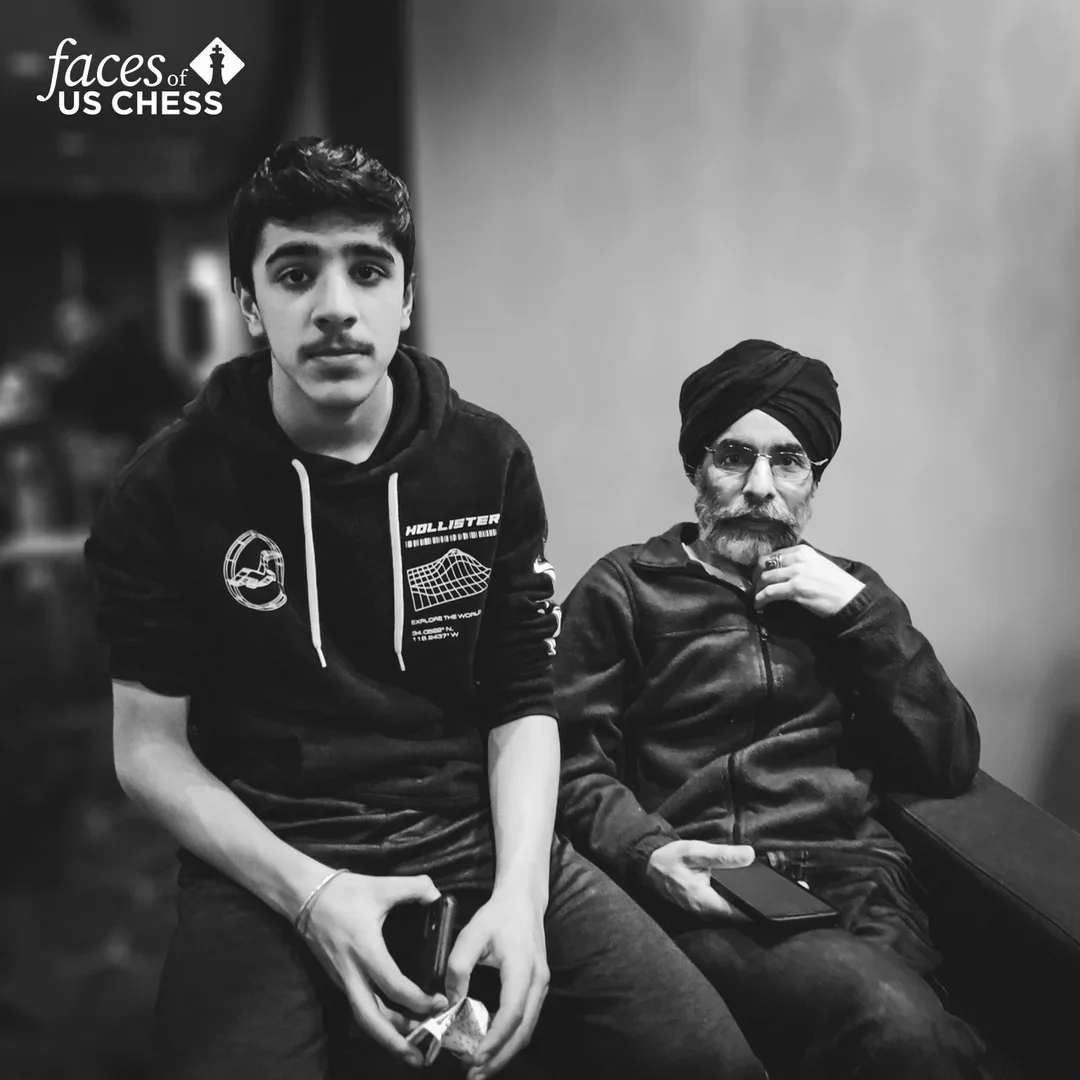
"I’m 14 and I’ve been playing chess for five to six years. I practice online, on Chess.com, mostly by myself. Though I don’t take part in my local chess community much, I really like the competitiveness of chess. This isn’t my first tournament. I played my first tournament in 2016 and was in the K-3 section. I came in close to last place out of maybe 30 people. I cried a lot. But a month later, at my next tournament, I did a lot better after studying more. I was still playing in the K-3 section, but I tied for second. I recently played in the eighth-grade section at the K-12 Grades National. I scored 5½ out of 7, one point behind the winner. I was really happy about that." - Ishnoor Singh Chandi
More "Faces" coming soon: check back every Friday!
Please support chess in the United States. Make a tax-deductible donation to the US Chess Federation today. Donate online:
Or send a check to:
US Chess Federation
PO Box 775308
St. Louis, MO 63177
US Chess Federation is a 501(c)(3) organization.



